Home > South Africa > Is South Africa Worth Visiting?

Is South Africa Worth Visiting? Honest, Un-Obvious Observations

"Is South Africa worth visiting?" is a silly question.
Of course it is. Every country is worth visiting. The more nuanced and less obvious question is,
“Is South Africa is worth visiting more than other countries you could travel to?”
That’s not as easy to answer. It depends on what you are looking for in a destination.
To help you decide, I'm going to share some pros and cons of South Africa that weren't obvious to me before Kim and I came here, but that I've observed over the 13 months and counting I've had to get to know the place.
Let me emphasize " observed ." These are my observations. Opinions, too. Not facts. If you disagree with or are offended by anything, that’s up to you. I'm just trying to be as honest and not-so-obvious as possible.
I hope it helps you decide for yourself.

Are you worried about your safety?
As you've almost certainly heard already, South Africa isn't super safe.
Nobody wants to be the weakest link, so most houses and buildings in the cities have electrified fences and heavy-duty grates over their windows and doors.
This creates a sense of paranoia that's even higher than the actual risk level. So too do the fear-mongering news and stats that reflect how scary the crime levels are in the townships, but not in the areas tourists go.
We feel safe walking alone during the day in the areas we should be walking with AirPods in our ears and laptops in our backpacks.
But if you're the paranoid type, you might feel on edge the whole time. This will take away from your enjoyment. Maybe go somewhere safer, like Rwanda , instead.
And if you're on the other extreme and are the careless type who gets blitzed and wanders around Long Street screaming your national anthem, your trip's not going to go well, either.
But if you're reasonably cautious, safety shouldn't be cause for concern when visiting South Africa.
Also keep in mind that:
- The safety situation is much more relaxed in smaller towns.
- No matter where you are, people are friendlier than in most other countries.
- There's very little hassle, haggling, and rip-off risk in South Africa.
Safety Don't Dos:
- Walk anywhere but on busy streets at night or alone at any time in sketchy neighborhoods.
- Drive in rural areas at night.
- Disregard safety advice from locals.
- Leave valuables sitting on their own on a table or a beach or inside your rental car.
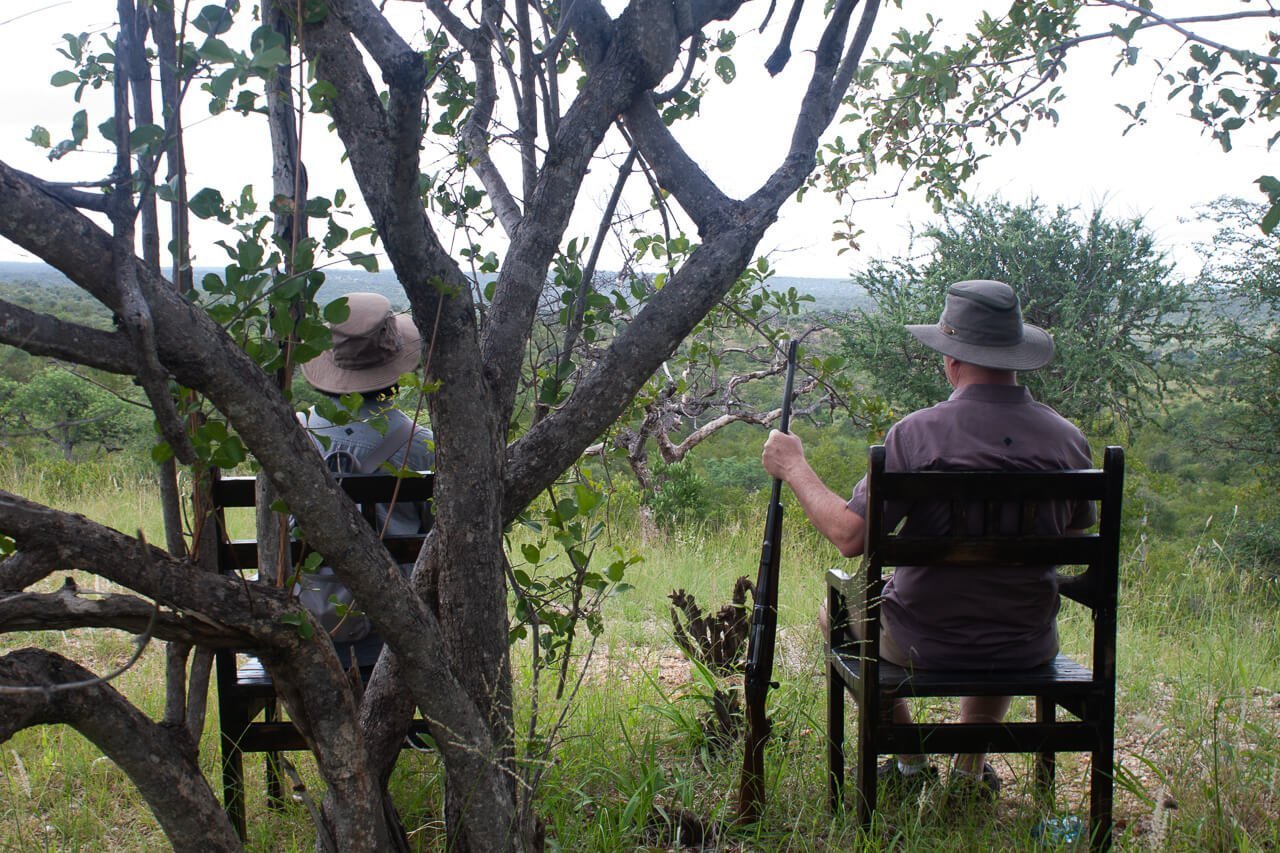
Are you looking to "travel to Africa"?
If you have dreams of Lion King-esque savannah, colorfully-clothed tribes, and chaotic cities, you're better off going to Kenya than South Africa.
That's not to say South Africa doesn't offer all of those "African" experiences. It does. It's just that there's a lot more European in its blood—and South Asian, and even American—than in its northern neighbors. This is especially the case in the areas you're most likely to visit.
So go to South Africa to visit South Africa, not to "travel to Africa."

Are you looking for a 5-star trip on a 3-star budget?
In my books—and in my blog on the best countries to visit for various types of trip—South Africa is number one in the world by this measure.
Some examples from Kim and my South African adventures of the not-so-rich and un-famous include:
- Hiring a driver for less than $150 US for the day to drive a group of us from one luxurious estate to sit among carefully manicured flower gardens sipping reserve wines for less than $5 a tasting .
- Renting a BnB carved out of a cave, Weskus Grotjie , or a private cabin on a fynbos farm with a pre-heated woodfire hot tub for less than $100 a night.
- Entering the oasis of Cape Town's luxurious Mount Nelson hotel for high tea and unlimited treats for less than $30 a person.
Basically, we can live like YouTube stars on a blogger's budget here.

Are you a solo backpacker?
You might be better off going to South America or Southeast Asia. Transport is cheaper and more abundant and fellow cheap travelers are more abundant, too.
That's not to say you'd regret backpacking in South Africa.
Our friend Rebecca rented a car and hiked the Drakensberg by herself. My brother enjoyed a reasonably-priced group tour of Kruger Park and exploring Johannesburg with new friends he met at the hostel. And Lisette, a friend we made along our Hectic Route from Johannesburg to Cape Town, managed to have a great trip through South Africa despite being wheel-chair bound thanks to the backpacker-friendly Baz Bus .
It's just that you might get more out of a South Africa trip if you come back when you have a slightly bigger budget.
Are you looking for a getaway over the December holiday season?
South Africa's maybe too good of a choice.
Because December is summer down here, school holidays and Christmas holidays combine into one superstorm of a holiday. Locals descend in droves to the nicest parts of the country. Mix in all the Germans and Brits who're escaping their miserable weather up north and things get extra "hectic," as South Africans like to say. Prices skyrocket, reservations are hard to come by, parks are packed, and line-ups are long.
Better to come in other months if you can.
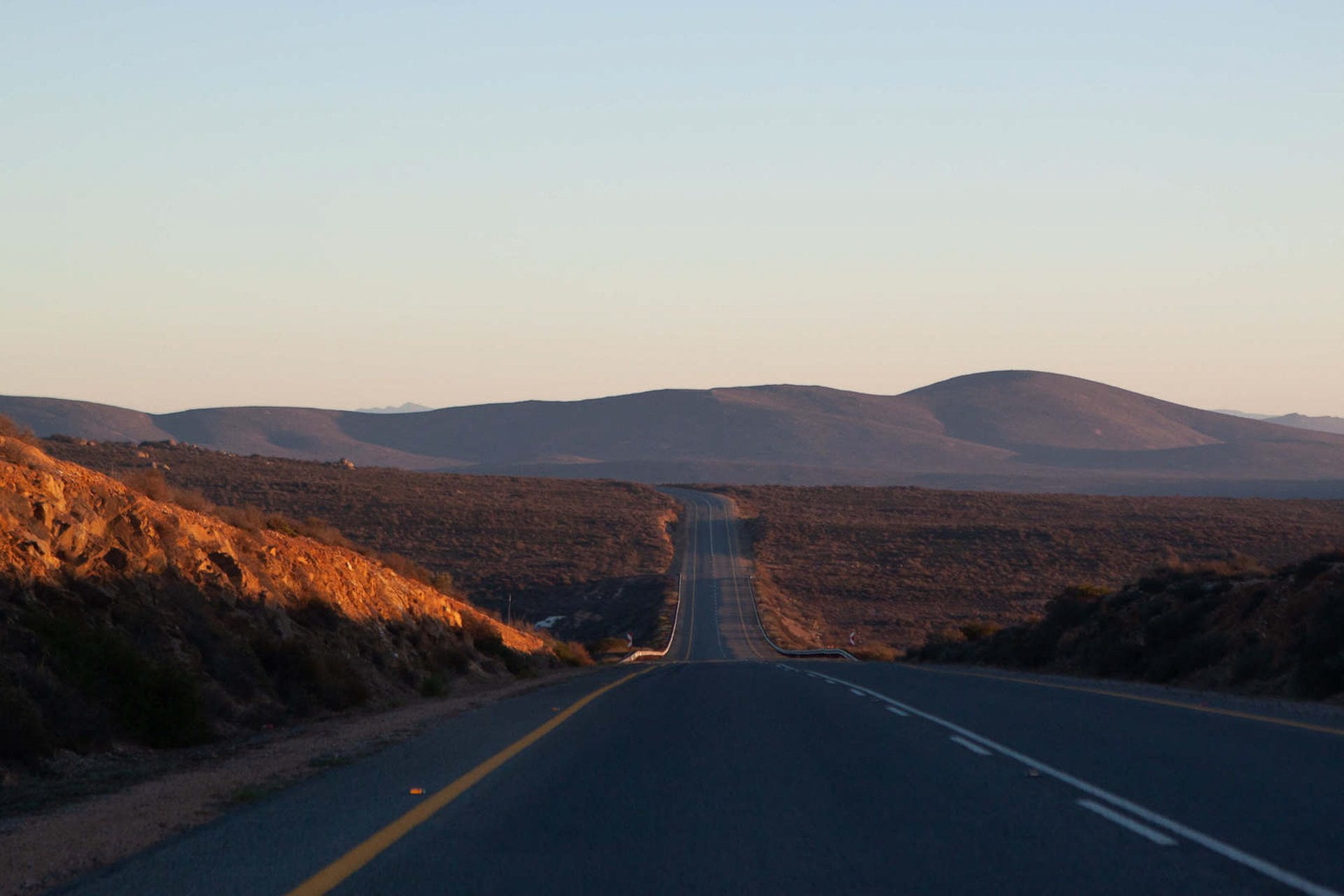
Are you looking to do a road trip?
Look no further.
After Jordan , South Africa's the best country we've ever been to for road tripping. The roads are empty and in good shape, the drivers are courteous, the scenery's stunning and varied, the towns are charming (well, some of them), and there's so much to explore.
So even if you aren't looking to do a road trip, you should if you decide to visit South Africa.
For tons of inspiration and advice, read our South Africa road trip tips , our "Hectic Route" from Johannesburg to Cape Town , our trip up and down the Garden Route , and our journey from Cape Town to Namibia .

Do you want to go somewhere family-friendly?
I'm not the most reliable source on this one. It's been a long time since Kim and I were kids, and we don't have any kids yet.
Even so, we haven't helped but notice how kid-friendly South Africa is. Even at "adult" places like restaurants and wine farms, there are often things to keep the kids happy so the parents stay happy. And the child-less grown-ups seem "chilled" (another South African-ism) about little ones running around, too.
From the opposite angle, I guess South Africa's not the best if kids get on your nerves.
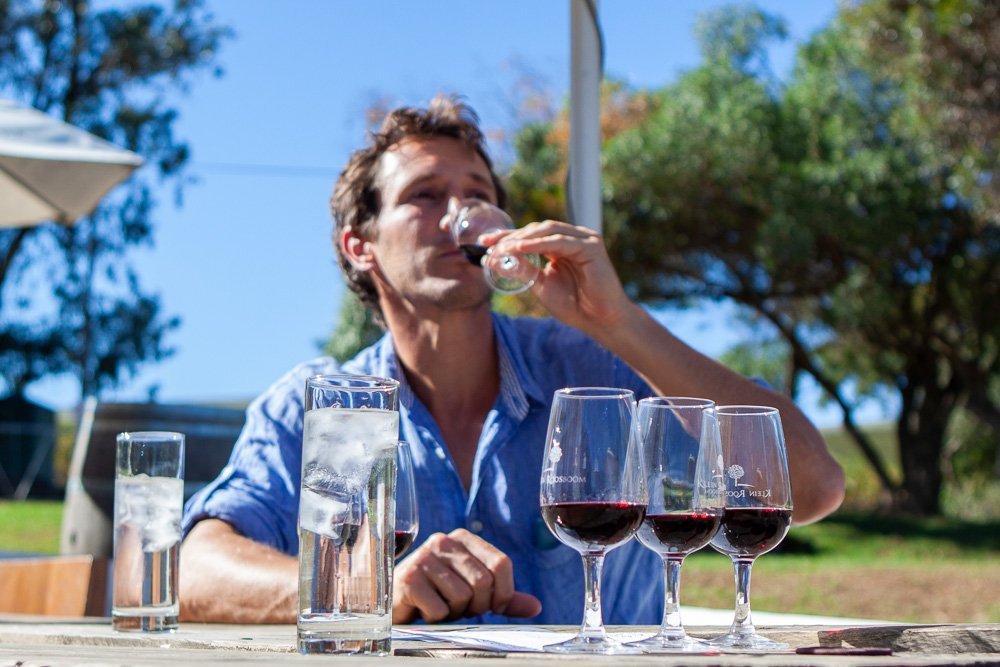
Are you not much into wine?
Doesn't matter. You might change your mind after visiting South Africa.
I did. I came to Cape Town as a beer guy who thought wine was for snobs and couldn't tell a Chardonnay from a Shiraz in a blind taste test . The only times I drank wine was when someone else bought it.
But then we toured the wineries (or "wine farms," as they're called in South Africa).
As Kim's teetotaling mom will attest, the opulent settings are worth exploring in their own right. And the tastings are either free or only cost a few bucks, so I happily partook. Before I knew it, my ambivalence wine had matured into full-blown snobbery.
So yeah, I guess if you don't want to get hooked on wine, don't go to South Africa.
Or are you a wine snob?
If it's too late to save your pretentiousness and your wallet from oenophilia, you absolutely, truly must visit South Africa.
And I don't mean "must" in the polite way South Africans say it, either. It's a Canadian "must." You're doing yourself a disservice if you don't.
Don't let South African wine's middling reputation fool you. As I've seen in the liquor stores in Vancouver, they export and overcharge for the crap they don't want and keep the good stuff to themselves to drink at incredibly affordable prices.
Quick tip: Look to visit smaller, lesser-known wine farms and regions. To get you started, here are some of our favorite wine tasting experiences worth planning around.
Are you bad with languages?
No need to hold your tongue.
Unless you get way off the beaten path, everyone you meet in South Africa will speak excellent English with ear-pleasing accents.
Once you experience the ease most everyone in South Africa has with English, you may be surprised to learn how few people speak it as their first language. I'm surprised now as I google the stats . English is only the fourth most common mother tongue, at less than 10 percent of the population. Ahead of it are Zulu (23 percent), Xhosa (16 percent), and Afrikaans (14 percent).
Or do you want a language learning challenge?
If you love languages and are looking for a challenge, you're in luck, too. I suggest you take on Xhosa, Nelson Mandela's native language. Get started practicing with this video:
Are you worried about racism?
My experience here comes with a huge grain of salt, given that I'm as white as a huge grain of salt.
But I wondered about it before I first came to South Africa, so I imagine others might, too.
Here's my biased experience:
While the inequality is pretty, well, black and white, Kim and I rarely observe any hint of animosity you might expect given the country's history. At least on the surface.
This seems to partly be thanks to the lack of taboo among South Africans around talking about race. Calling someone " coloured ," "black," or "white" is like calling Charlize Theron blonde. Commercials go so far as to poke fun at stereotypes of the country's different cultures:
This seems to be better than only doing so behind closed doors, like in America.
Prejudice seems to remain strong, though.
On this, I side with Trevor Noah's theory from his book (which I can't recommend more highly you decide to visit South Africa). People are quick to put each other in buckets based on their accent more than their skin color. I suppose this happens everywhere in the world. But the buckets in South Africa seem deeper.
Even Kim and I experience it. When some hoity-toity people hear our American accents, they tighten up. But they sometimes relax a bit when we clarify that we're Canadian. Then they invariably say, "I have a family member who lives in Canada!"
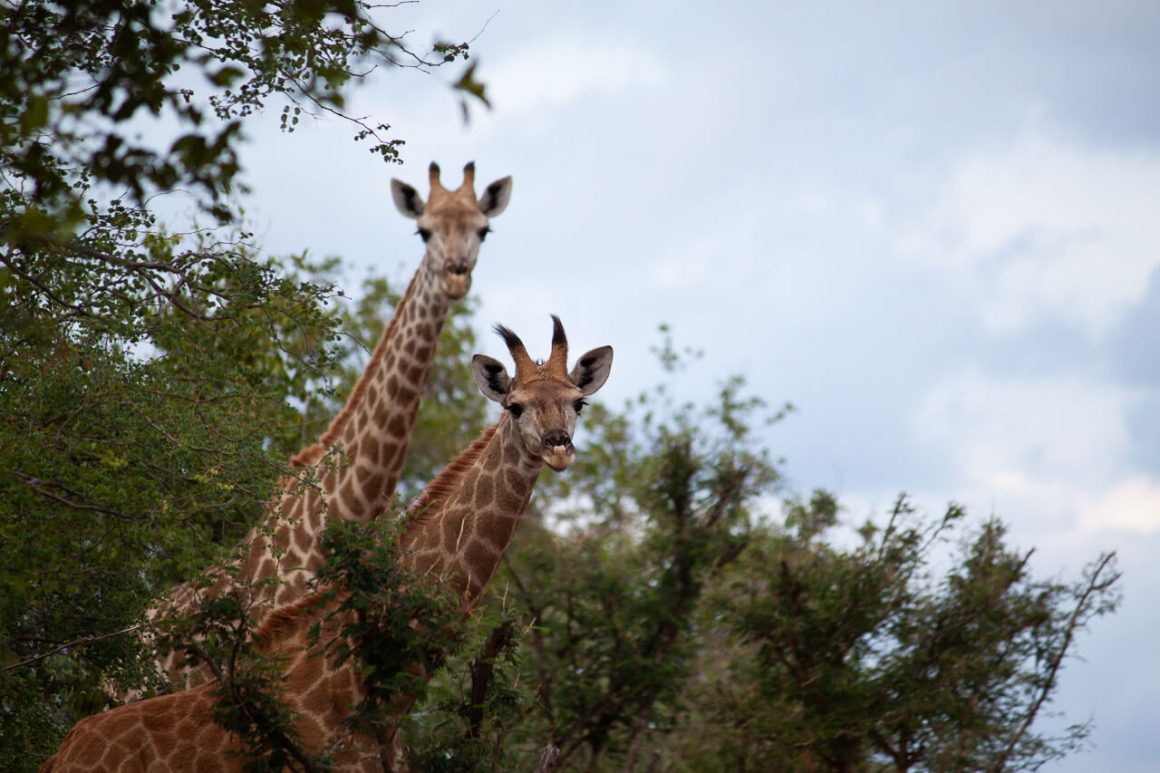
Do you want to see lots of wild animals?
You'll see lots of game on safari in South Africa's Kruger Park , for sure. But can you expect to see more there than in other countries?
That depends on quite a few factors:
- The time of year you visit. Better not to come in the wet season when animals have foliage to hide behind. September to November are the best months for safaris.
- Whether you hire a guide or not. Guides not only have a keener eye but also exchange spottings on WhatsApp groups.
- Whether or not you read our Kruger safari tips .
- Luck. It's not a zoo.
The "feel" is worth taking into account, too.
Some say Kruger's paved roads and popularity (especially in the south of the park) make it feel a bit artificial. They prefer neighboring Botswana or Namibia .
But others appreciate the order and rules in South Africa that protect the animals (and their cars' tires).
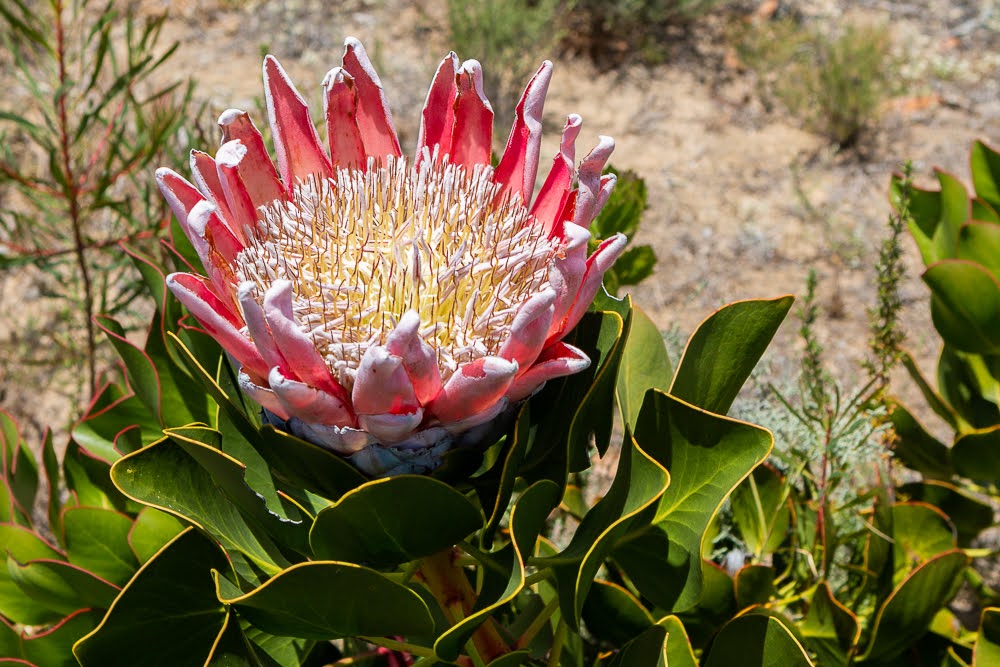
Tip: Don't overlook the flora, especially around Cape Town. From afar, it doesn't look like much, but up close you'll discover it's more botanically diverse than the Amazon . The flowers are beautiful, and I don't normally care much for flowers.
Tip on that tip: Be sure to get a taste of the local botanicals in some of the South African gins, too. Or buchu tea, made from a superfood-type indigenous plant that only grows in a small desert region north of Cape Town.

Is food a big reason why you travel?
South Africa's no Japan or Italy (or Mexico ), but its food scene's got enough to make eating a highlight of your trip.
First, the not-so-good news : Traditional South African food is meh.
Sure, there's some Cape Malay food around Cape Town, bunny chow in Durban, and heaps of meat. But none of it is anything to write home about—or to leave home and fly thousands of kilometers to try.
The better news is modern South African cuisine is fantastic.
Like in other New World commonwealth countries like Canada or Australia, you'll find excellent adaptations of cuisines from all over the world. And there are tons of hipster eateries, avant-garde fusion restaurants, and traditional farmhouse eateries that serve tasty fare from high-quality ingredients.
The extra good news is the price-to-value ratio's world-class. To give you some idea, a top-notch steak will cost along the lines of R200 ($13 US) and bottles of decent wine start at around R140 ($9 US).
Do you need super-fast WiFi?
Then South Africa's only worth visiting if you're willing to get a 5G plan to tether from.
The internet's a bit of a nuisance. While it has improved since we first visited South Africa in late 2018, download speeds of 10MB/s are still considered fast. Unlimited WiFi is still a selling feature at Airbnbs. And some cafés limit you to 200 MB.
On the plus side, pre-paid LTE data is only a couple bucks per GB. I pay R50 ($3.30 US) a week for 2 GB pre-paid. And now 5G's making its way into the market.
Just watch out for load shedding—rolling blackouts that can also cut off phone towers.
Does inequality make you uncomfortable?
Then don't go to South Africa or it will burst your bubble.
I didn't think this was worth mentioning until I talked to my friend's parents. They are the only people I've spoken with to say their visit to South Africa didn't exceed their expectations. Why? Because they felt bad driving by the informal townships' corrugated metal shacks on their way to spending their tourist dollars on fancy food, wine tastings, and pictures of penguins.
I see where they're coming from. But I also think it's better to see the inequality than go elsewhere and pretend it doesn't exist. If anything, it makes you feel grateful for your silver spoons. At least that's the case for me.
But if you prefer to take a vacation to fantasyland, skip South Africa.
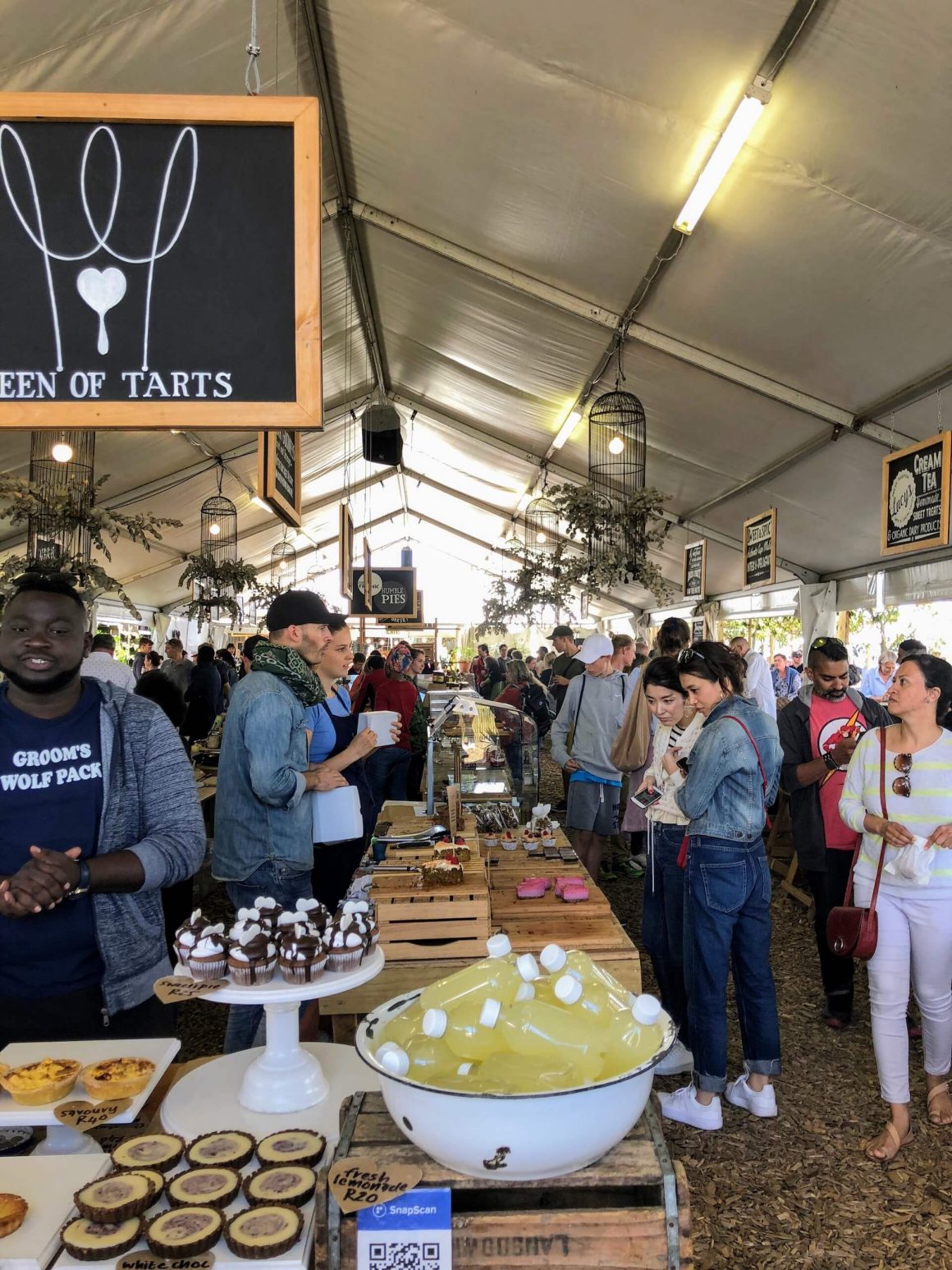
Are you a farmers market fanatic?
Then pack your baskets and make a beeline to South Africa.
South Africans do farmers markets and artisanal stuff better than anywhere Kim or I have ever been. Whereas in other countries I get the impression people try too hard to be artisanal and charge too much for it, South Africans make it seem effortless.
Everything's exceedingly nice . Nicely designed, nicely packaged, nicely prepared, nicely priced, and nicely handed over in a soothing South African accent.
So wherever you go in South Africa, be sure to look up then hit up the weekend markets. Ask about mid-week ones, too.
Tip: When road tripping, be sure to stop in the farm stalls, or "padstals," as they're called in Afrikaans. They're hit and miss, but the good ones have tons of souvenir and snack-worthy products made on-site and at neighboring farms.
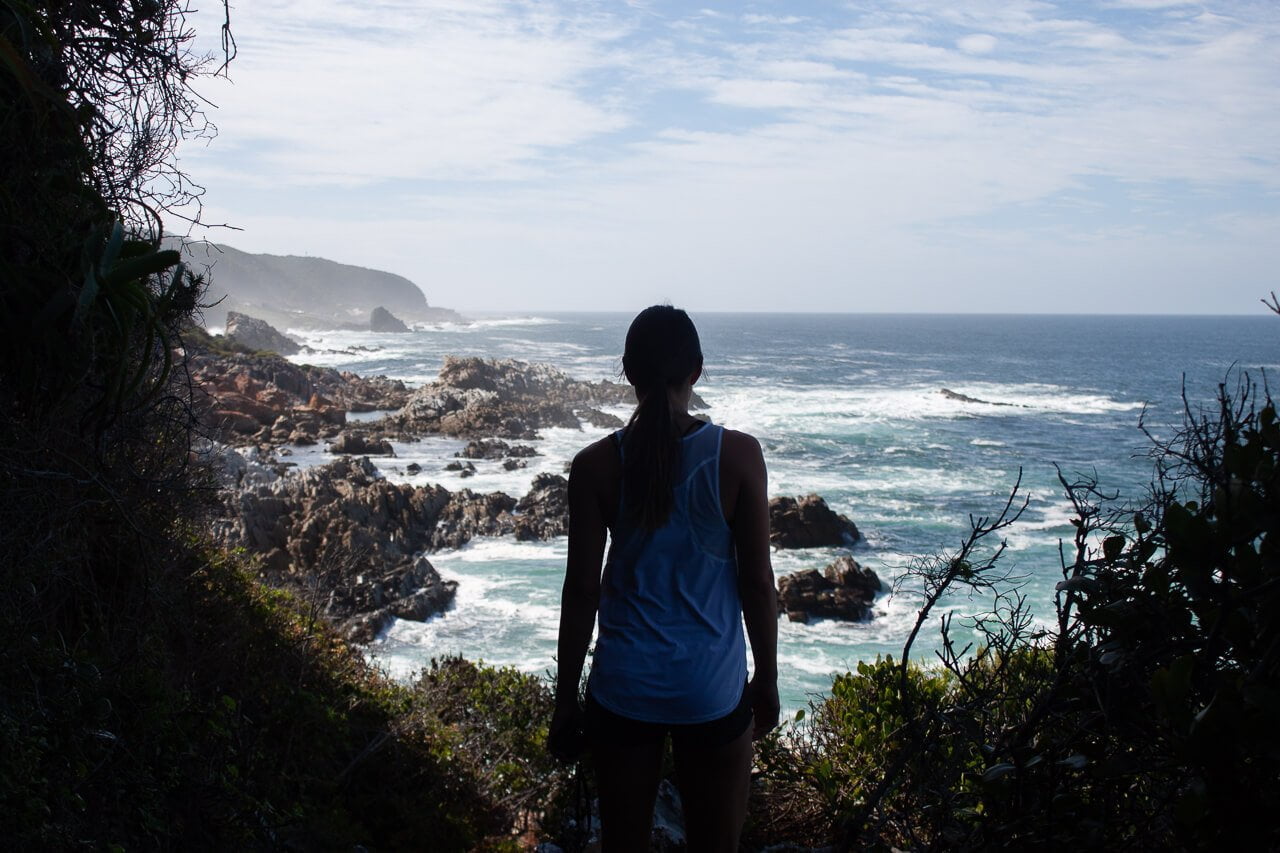
Are you the active, outdoorsy type?
While most South Africa tourist brochures are about snapping photos in cities, sipping on Pinotage in the winelands, and staring at animals from inside Range Rovers, there's also plenty to keep the active from getting antsy.
Much more than hiking Table Mountain and Lion's Head in Cape Town, too. (Though both of them live up to the hype.)
- Scrambling and bouldering in the Cederberg desert
- Hiking in the Drakensberg
- Canyoning down aptly-named Suicide Gorge
- Wandering along the Wild Coast
- Doing some of the dreamy day (or multi-day) hikes along the Garden Route
- Getting out of the jeep to do a multi-day walking safari
- Surfing at Jeffrey's Bay
- Free-diving like the guy from My Octopus Teacher .
Whatever your outdoor activity of choice, South Africa's got it. (Well… not skiing.) And the scenery will be spectacular. Even better, not many people know about it, so it rarely gets too busy.
Are you still not sure about visiting South Africa?
Then just go.
I tried to be as even-handed as I could about the pros and cons of visiting South Africa, but in all honesty I have a hard time imagining anyone regretting going. You'd have to do something really stupid, get really unlucky, or have a horrible travel guide to screw it up.
South Africa doesn't only have something for everyone; it's got more in store for you than you probably think.
Keep Exploring With Us
Read this next:.
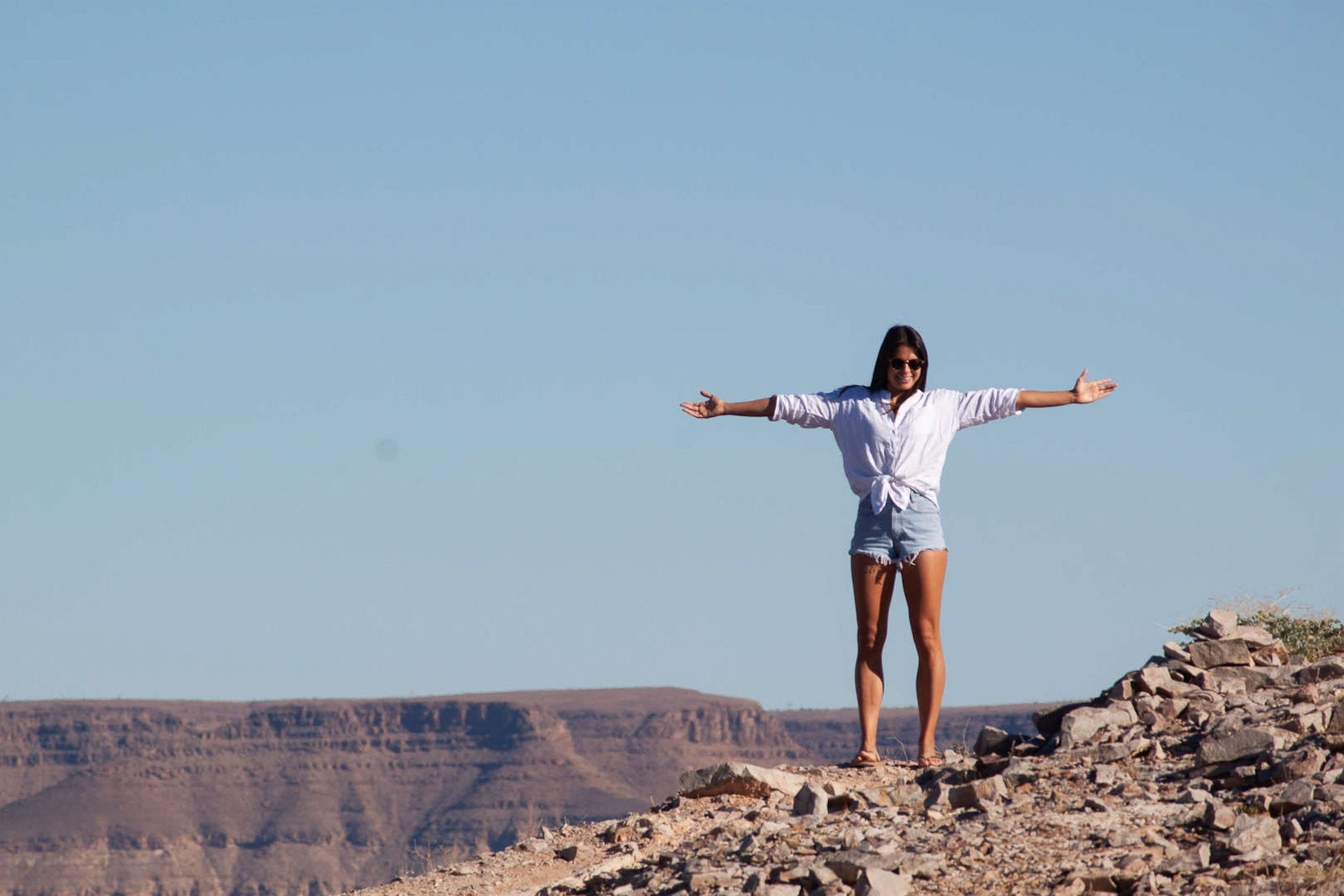
Travel Essentials for Women: 15 Favorites to Never Forget
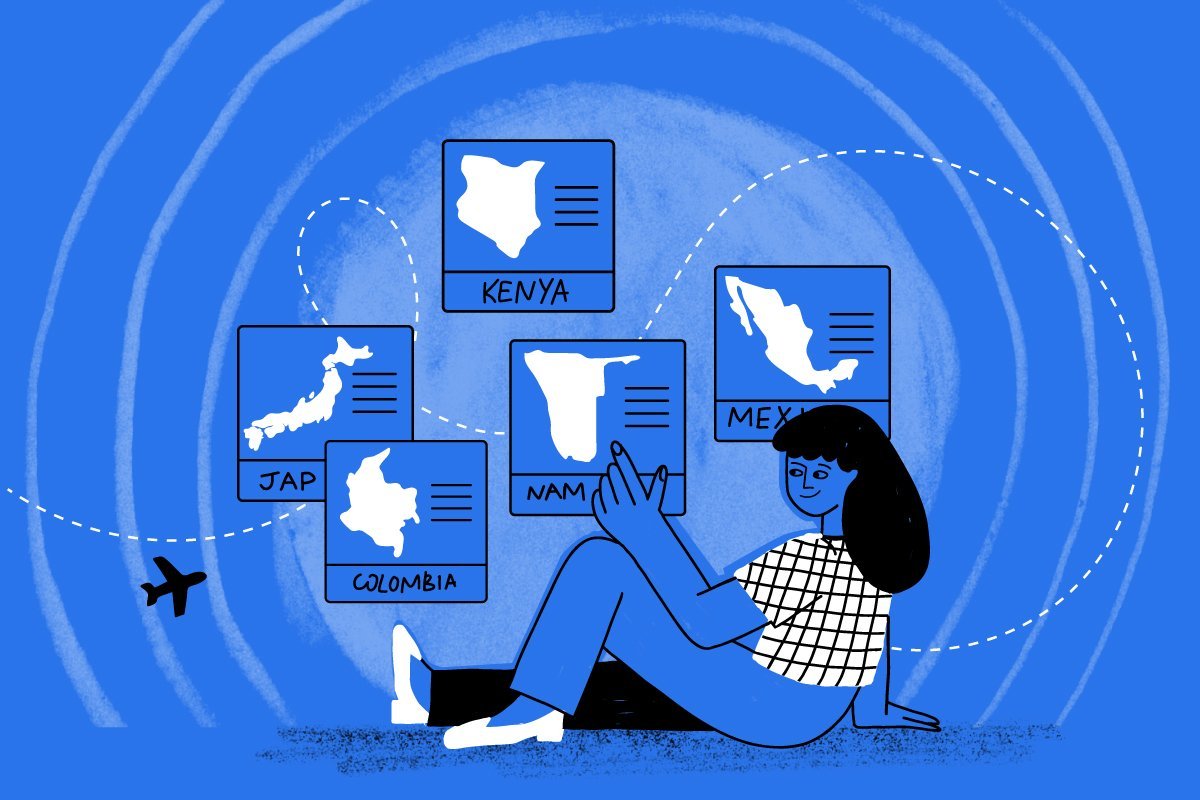
The Best Countries to Visit for 18 Unique Types of Trip

Travel Tips and Tricks: At Least One Will Enhance Your Trip
Disclosure: Whenever possible, we use links that earn us a cut if you pay for stuff we recommend. It costs you nothing, so we'd be crazy not to. Read our affiliate policy .
4 thoughts on “Is South Africa Worth Visiting? Honest, Un-Obvious Observations”
As someone who grew up in South Africa, and who likes to drive, and have driven all over Europe (worked there 5 years), all over Australia, all over Asia, and the entire US (lived here for 40 years), you fail to mention the dangers of driving yourself in SA. This country has one of the highest road fatalities in the world with a flagrant disregard for laws, (dangerous overtakes on blind corners, on blind hill crests, and even in the presence of solid lines) extremely poor law enforcement, and a free for all racetrack mentality of insane proportions. If you’re planning on renting a car in SA with US or European expectations of safety and driving manners, you are naive and taking your life in your own hands. I visit here annually and it’s getting worse, not better. Yellow line driving is now common on two lane roads and is a major cause of head on collisions when practiced on both opposing sides. Your article was otherwise fine, but you weren’t nearly blunt enough about driving there. A beautiful magnificent country well worth a visit, but do not return in a box by driving there uninformed.
Thanks for the differing perspective, BDK. We haven't had similar experiences throughout our many SA road trips, but I don't doubt what you're saying.
My wife and I just returned from six weeks in South Africa – mostly in the Cape Town area..we stayed at a lovely Air BnB in Glencairn overlooking False Bay (Atlantic Ocean) with two terraces, three bathrooms, two bedrooms and a new kitchen – for $45/night (November [2021] = the low season and country still looking for tourists during Covid.
Regarding driving…I've driven in some crazy places (rural Thailand at night; anywhere in Nepal)…South Africa has that "third lane" thing. On long distance highways, the third lane is that no man's land between the oncoming lane and the lane you are driving in. That is the lane folks use to pass when highways are a single lane on either side – and you are stuck behind a truck or some slow driver (and you have a fast SUV). Anyway, people use the "third lane" to pass all the time. You can see it coming from a ways or way…or anticipate it. To me it was not a big deal…I grew up in NYC driving (started in 1976 at 17)…and learned quickly, "do unto others before they do unto you." In other words, you have to learn to be aggressive for yourself…get what/where you need to be – but not crazy or violent about it. In NYC you learned to fight for yourself – or get run over. On the roads in South Africa, after driving the Cross Bronx EXpressway or the Long Island EXpressway – I was at ease…I was generally more pushy than even the more pushy South African drivers…and only got honked at once. So if you are used to city driving in North America – you will do fine here (and it is indeed fun driving here) – just bring sunglasses! You will indeed need sunglasses.
As for black-white relations and vice versa. We were very curious about this coming from NYC (and being white). Now my comments are based upon our experience in the Cape Town area – we did not get to JoBerg which people tell us is a very different vibe/experience. OK here goes (1) We were amazed at how far South Africa has come in 30+ years. This is especially true for whites born since 1995-2000 – there have been no revolutions..no Zimbabwe tragedies…and the infrastructure remains excellent.; (2) For older White South Africans who remember the days when people tipped their hat to one another on the street…when government functioned well…and crime was unheard of…the new South Africa is tough for them to adapt to. They have a legitimate gripe too…That being said the black folks we talked to and interacted with – all were friendly, loving – their eyes and smiles always came from "how can I help?" And if you treated that person with respect, kindness – it was a wonderful interaction. This is what we experienced in 99.9% of our time there. But we also saw how in the fine restaurants, everyone was white – the staff (waiters and such) was black. In the fancy neighborhood where we stayed (Glencairn) everyone on the block who lived there was white, and everyone who worked in those houses or did construction or came to fix the internet or plumbing or whatever – those folks were black. South Africa will really change when one or two black families live on these exclusive streets…and black kids are in the same schools as white kids. BUT who am I to judge? – it is going really well here albeit change is slow! I can still remember in my own Bronx neighborhood where I grew up in the 1960s, if you were black and walked through my white middle class area – you must have been up to no good, were followed and not uncommonly attacked/chased away. I'd say for the older white folks – it is tough for them to give the respect we as foreigners found easy to give. And remember, the stress of racism goes both ways – people who are black and others who are white feel slights or perceived slights – those feelings add up over time. I am a tourist – people easily heard it in my voice…and from America (it is amazing to me how everyone loves America) – so I was given a pass…my experience was necessarily different even though I am white than the experience of a white South African – so take what I say with a grain of salt. (3) People in business liked to hire immigrants – Malawi people; Zimbabwe people…as anywhere immigrants just want a chance and will work harder longer (I suppose this is a stereotype too). BUT (4) everyone is so disappointed by the national government – the African National Congress has let everyone down.
To accurately portray what we experienced would take another six months in the country…and six months more to digest/write-up. I am writing stream of conscience here because it is a topic that is critical to understand where South Africa is heading. If I was a journalist I'd ask everyone what are your hopes and dreams for yourself in South Africa in the next five years? For many blacks: to break through a glass ceiling and own their own business; for whites: to feel safe and assured that Zimbabwe was not going to happen to them (especially middle class whites). But the story is complicated…and what do I know? I was only a short-term tourist…But I remain very optimistic: that look of love…"how can I help?" – that I have not felt in many places in the world. Kudos to all South Africans…
Finally, Cape Point National Park – that flora…the landscape..the ocean there – amazing. My wife and I are PhD biologists – and the Cape Flora (the fynbos area) is extraordinary. The pelagic birding trips for Albatrosses and others…Addo's elephants (three meters away and ignoring you in your SUV – famous for this). The birds of South Africa. Amazing…forget wine – go do stuff that is free, wild, spontaneous – the environment. The Gannet colonies – and the Flamingos at the sewage treatment plant too!
We rented an SUV for $37/day (VW Tiguan) and drove ourselves everywhere. You don't need a guide in the national parks – talk, to to people who know…read books – go out and explore. Live in a mostly unscripted world.
Wow, thanks Robert for your thorough perspective of what it's like to visit South Africa. If I'm ever in NYC again I'll be sure to learn about birding from you on your Central Park tour—that's something about SA I don't appreciate as much as I should. All the best!
What do you think? (Leave a Comment.) Cancel reply

17 Absolute Best Places to Visit in South Africa (+Map & Tips)
By Author Jurga
Posted on Last updated: February 19, 2024
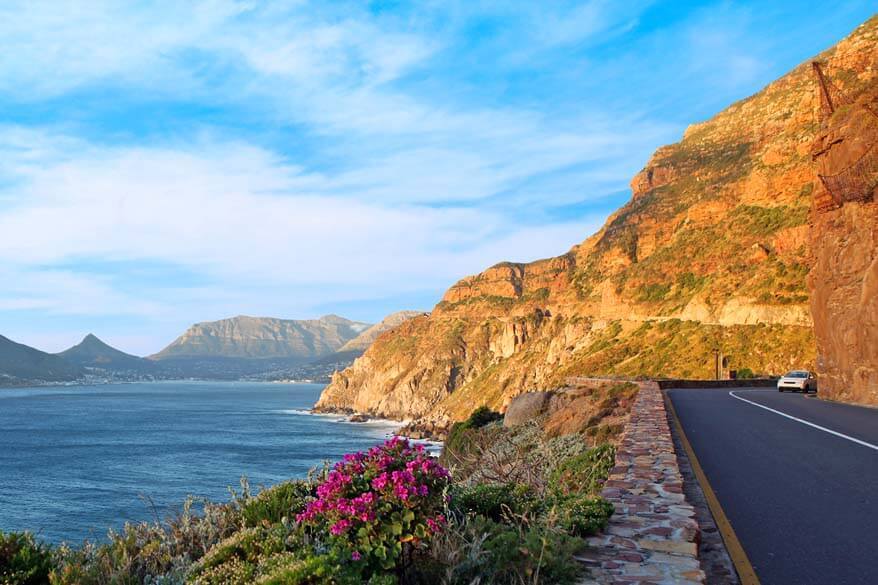
If you are reading this because you searched for the best places to visit in South Africa , then it probably means that you already know that South Africa is one of the most remarkable countries in the world and that you are considering a trip there.
Go for it! South Africa is one of the most beautiful destinations you’ll ever visit!
South Africa is so special and unique that it’s often called The World in One Country . And so it is! S-A is like a perfect mix of the very best of the entire world in one place. At the same time, it’s like no other place on Earth…
In this article, you can find a list of the very best places to see in South Africa. 17 incredible destinations in South Africa that are worth a trip from the other side of the world. Find out!
Disclosure: This article is sponsored by South African Tourism . It’s not a secret that South Africa is our absolute favorite country in the world, so we are really excited to be working with them to inspire you to discover this incredible country. All opinions and enthusiasm about South Africa are, of course, our own.
We fell in love with South Africa the first time we visited it many years ago and I’m sure you’ll feel the same way too. It’s a place that captures your heart forever.
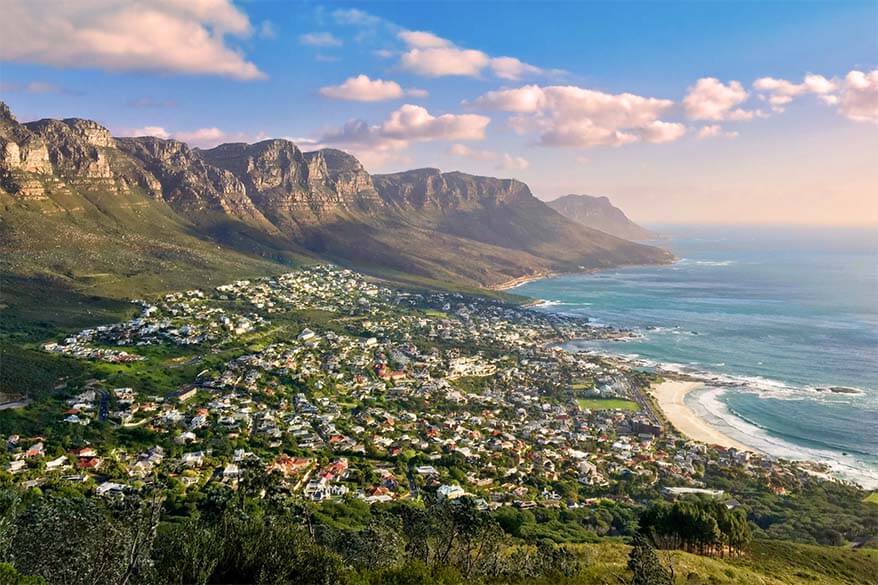
Below, you can find the list of the most amazing places you should visit in South Africa .
This is in no way a complete list, but it should give you a good idea of what to expect and where to go when visiting for the first time. It’s the list of the very best things to do and places to see in South Africa .
I ranked this list by putting my own favorites on top. So if you are limited in time, I suggest that you start with the top of the list and work your way down. At the bottom of this article, you can also find the map indicating all the main tourist attractions in South Africa mentioned in this post. Find out!
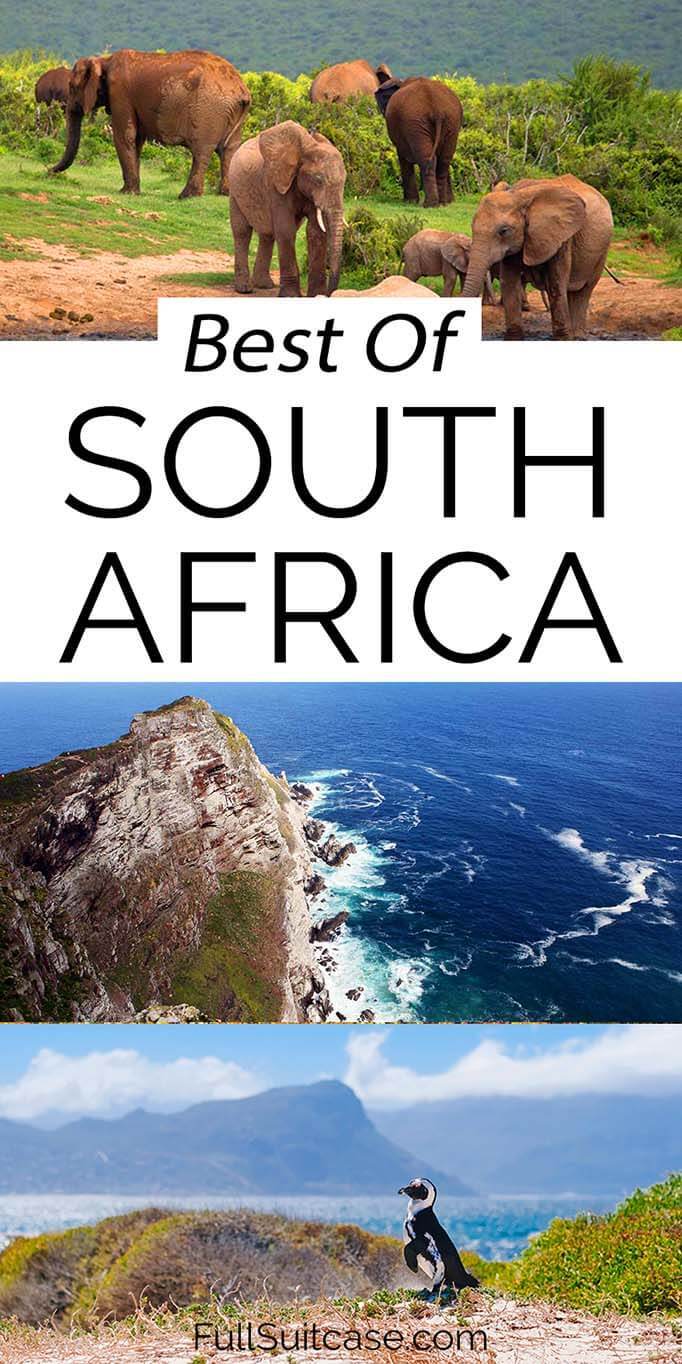
TIP: If you are not sure how to plan your trip, please check our South Africa 2 week itinerary that covers most of the must-see places in South Africa. Please note that it’s a very complete itinerary, but it doesn’t leave much extra time to explore deeper.
If you want to visit every place from this list, you’ll need at least 3 weeks and it will be rushed. If you want to see all the best places in South Africa mentioned in this article AND have some time to explore somewhat deeper, you’ll probably need at least a month…
These are the best places to visit in South Africa:
1. Cape Town
If there is one place you absolutely have to see in South Africa, it’s Cape Town . It was the oldest European establishment in South Africa (1652) and is therefore often referred to as the Mother City.
It’s difficult to describe in just a few words what Cape Town is all about. You really have to experience it in order to be able to appreciate the mingle of African and European cultures, a mix of tradition and modern, and the unique blend of city life and nature…
If South Africa is the world in one country, then Cape Town is the world in one city. Absolutely not to be missed when visiting South Africa!
Here are some of the main places you have to see in Cape Town : Victoria and Alfred Waterfront, Table Mountain, Signal Hill & Lion’s Head, Robben Island, Bo-Kaap area, Kirstenbosch National Botanical Garden, Two Oceans Aquarium, and also the city center with its local markets, shops, restaurants, and museums.
TIP: If the gondola to the top of Table Mountain is open, go there first. It often gets closed due to high winds, so don’t leave it for the last day.
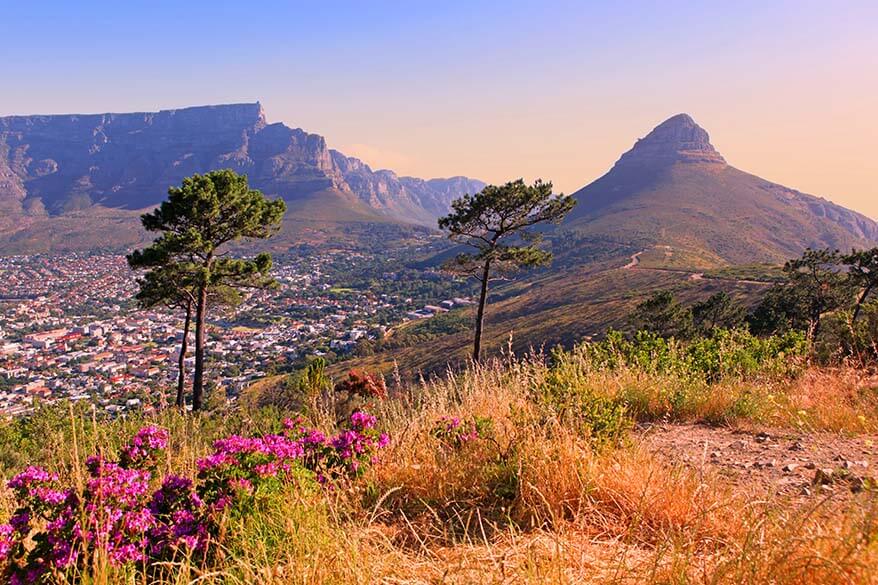
2. Cape Peninsula
Together with Cape Town, Cape Peninsula is one of the most impressive regions of South Africa. This is one of those places that you really don’t want to miss!
The absolute highlights of the Cape Peninsula include Cape of Good Hope and Cape Point and the stunning 12 Apostles coastline from Camps Bay to Hout Bay and further south along Chapman’s Peak Drive .
Not to be missed is Simon’s Town with Boulder’s Beach penguin colony (yes, you can see wild penguins in South Africa!) and also an ocean walkway from Muizenberg to Kalk Bay via St. James beach is really nice. Groot Constantia wine region in Cape Peninsula has spectacular scenery and some of the best wines in South Africa.
Also, in Hout Bay you can take a boat to see a seal colony – it’s called Duiker Island , but most people just refer to it as Hout Bay Seal Island. This is a very popular tourist attraction, so you may want to book in advance. For a more unique experience, you can even go snorkeling with the seals .
TIP: One day is hardly enough to see the highlights of Cape Peninsula. So if you can, try to spend at least a few days in this area. I recommend at least a week for Cape Town and Cape Peninsula, with 3-4 days being an absolute minimum.
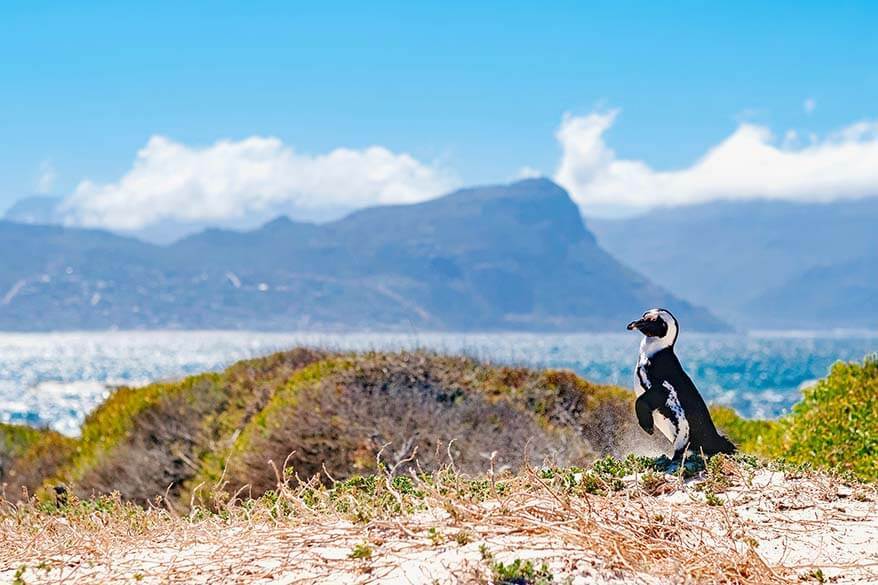
3. The Garden Route
Another absolutely amazing region, the Garden Route is one of those places you really have to see in South Africa as well. This +-200km stretch between Mossel Bay and Stormsrivier is one of the most scenic routes in the world, but you have to take the time in order to truly appreciate it.
You could drive the Garden Route in just half a day, but you won’t see much just by sitting in the car. So ideally you take at least a couple of days to explore this area.
Some of the nicest places along the Garden Route are Storms River and Tsitsikamma National Park , Robberg Nature Reserve , Plettenberg Bay , the whole area around Knysna (don’t miss the Heads and the Featherbed Private Nature Reserve!), Wilderness , and the beautiful coastline along the entire route.
Oudtshoorn , famous for its ostrich farms and Cango Caves , is a bit out of the way from the rest, but it’s also considered as part of the Garden Route. Well worth a visit.
TIP: If you are traveling with kids or if you just love wildlife, don’t miss Monkeyland and Birds of Eden (both just next to each other). Plettenberg Bay Game Reserve is a great place for a family-friendly safari along the Garden Route and Knysna Elephant Park is one of the best ethical places to interact with elephants in South Africa.
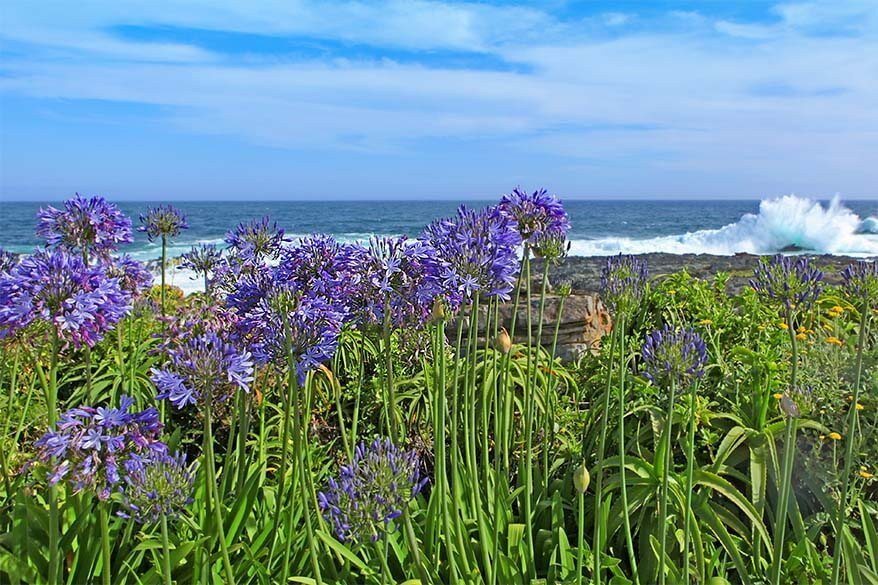
4. Kruger National Park
Without any doubt, Kruger National Park is one of the best-known places to visit in South Africa. If you want the best wildlife safari experience in South Africa, then Kruger NP is definitely the place to be.
Kruger is the oldest and also the biggest National Park in South Africa. To give you an idea, with 2,000,000 hectares (20,000 km 2 ), it’s about the size of Israel or the state of New Jersey. In other words, Kruger NP is huge! Ideally, you plan to spend at least 2-3 days in Kruger NP and make several game drives.
Hundreds of animal species call Kruger home and it’s also the best place to see the Big 5 in South Africa. The Big 5 refers to five most difficult African animals to hunt on foot: lion, leopard, elephant, rhino, and Cape buffalo. Hunting is really not cool anymore, but this term is widely used as a sort of ‘5 must-see African animals’ list.
There are 101 ways to explore Kruger National Park. You can opt for one of the many luxury lodges and private safari rides , organized day tours , or you can drive and explore Kruger NP with your own car. No matter which way you choose to explore Kruger National Park, it’s a place that you really must see in South Africa!
If you have never been on a safari before, please check our ultimate guide to safari in Africa .
TIP: Combine a visit to Kruger National Park with the nearby Panorama Route and Blyde River Canyon (see below).
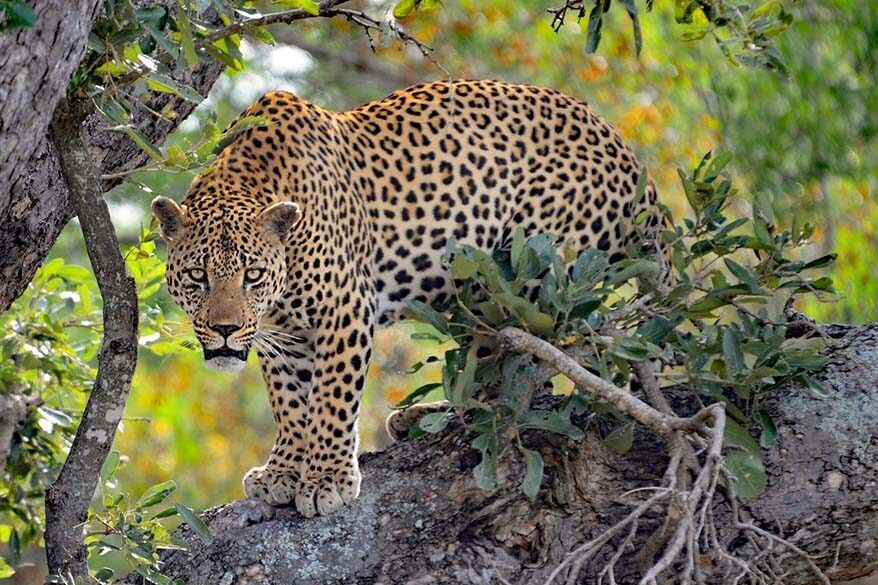
5. Blyde River Canyon & Panorama Route
Blyde River Canyon is one of the most beautiful natural landmarks of South Africa. It’s also one of the largest canyons in the world. Due to its proximity to several main entrances of Kruger National Park, Blyde River Canyon Nature Reserve and the whole Panorama Route make a very popular day trip in the area.
Together with Kruger NP, Blyde River Canyon is one of the most popular tourist attractions in northern South Africa.
Start your day with breakfast at the famous Harrie’s Pancakes in Graskop . Then head north to the Pinnacle , God’s Window , and Wonder View . Further highlights of the Panorama Route include Lisbon Falls and Berlin Falls , also Bourke’s Luck Potholes , and Lowveld viewpoint . But the most impressive of them all is the Three Rondavels viewpoint . The scenery here is simply spectacular!
Three Rondavels was one of the first places we visited just after arrival in South Africa and that image stayed with us forever. It was here that we fell in love with this amazingly diverse country and realized that it has so much more to offer than we ever imagined… Don’t miss if you are visiting Kruger NP and have a day to spare!
If you have more time, you can also consider a visit to the Echo Caves or a small museum-town called Pilgrim’s Rest.
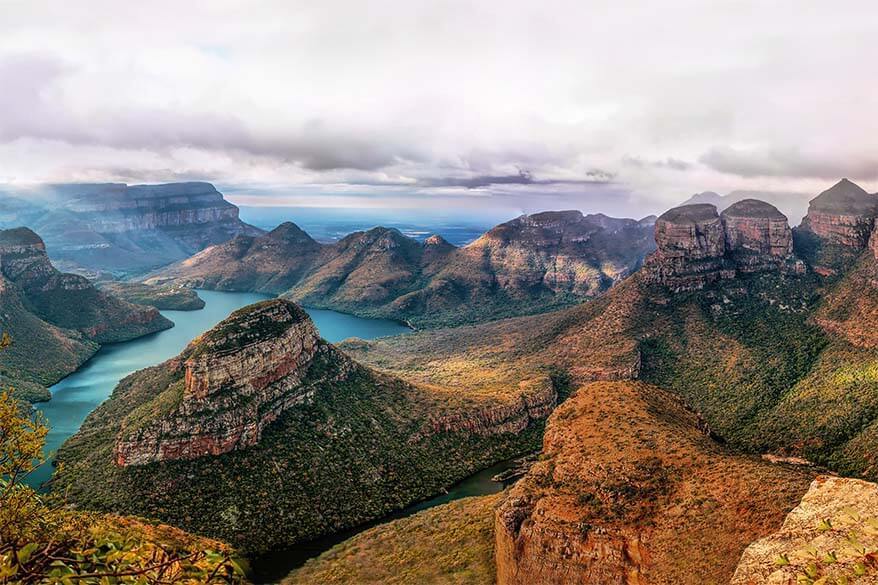
6. Hermanus
Hermanus is my husband’s favorite place in South Africa, one we always wish we had stayed longer at…
The town itself isn’t that special, but its coastline is second to none! Grab a picnic and explore the beautiful coastal walking path. The bay near Hermanus is known as the best place to see whales and dolphins in South Africa and it definitely lives up to its reputation!
You can take a whale watching boat tour and get really close to these majestic animals, but you can usually also see them from ashore. Both experiences are very different and each special in their own way. I really recommend both – taking the boat tour and also walking the coastal route in Hermanus and watching whales and dolphins from the shore.
Please note that whales are not always around. The best time to see whales in Hermanus is between June and December, but some years they arrive earlier or leave later, so you just never know.
We have been on many whale-watching tours all over the world, but nowhere did we see so many whales from so close by as in Hermanus. There were tens of whales just meters away from our boat… We also saw hundreds of dolphins while walking along the coast. It sure is one of the best places to go whale – and dolphin-watching in the world.
TIP: Nearby Gansbaai is also a beautiful place with a stunning coastline and a good chance to see the whales. It’s not as well known and therefore much less visited than Hermanus, but it’s a perfect place to visit for those who have more time in the area and looking to discover some off-beat hidden gems.
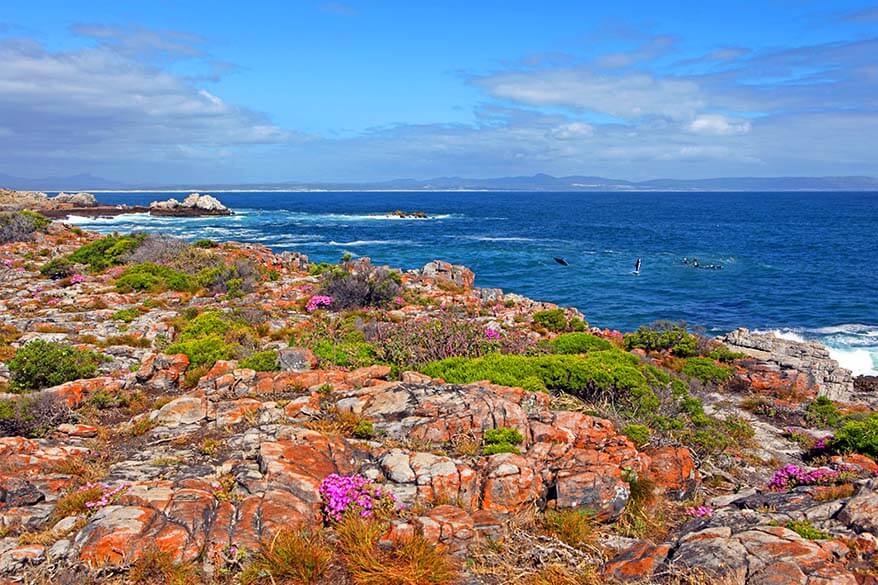
7. South Africa Wine Region: Stellenbosch and Franschhoek
South Africa has become world-famous for its wines and the best region to see the wineries and taste some wines is the beautiful area between Stellenbosch, Paarl, and Franschhoek.
This wine region is just a short drive from Cape Town and is therefore really easy to visit, even if you only have limited time in South Africa.
Stellenbosch and Paarl are bigger towns and I’m not sure if they are worth a visit, but the nearby wineries and the surrounding scenery is a must. We loved the quaint little Franschhoek town with its white buildings, hilly landscapes, and a very cozy atmosphere. Such a beautiful region – a place you have to see in South Africa!
TIP: Don’t drink and drive! If you are staying in Cape Town, you can visit the wine region with an organized day tour. Here is one of the best-rated and most complete wine region tours from Cape Town that I was able to find.
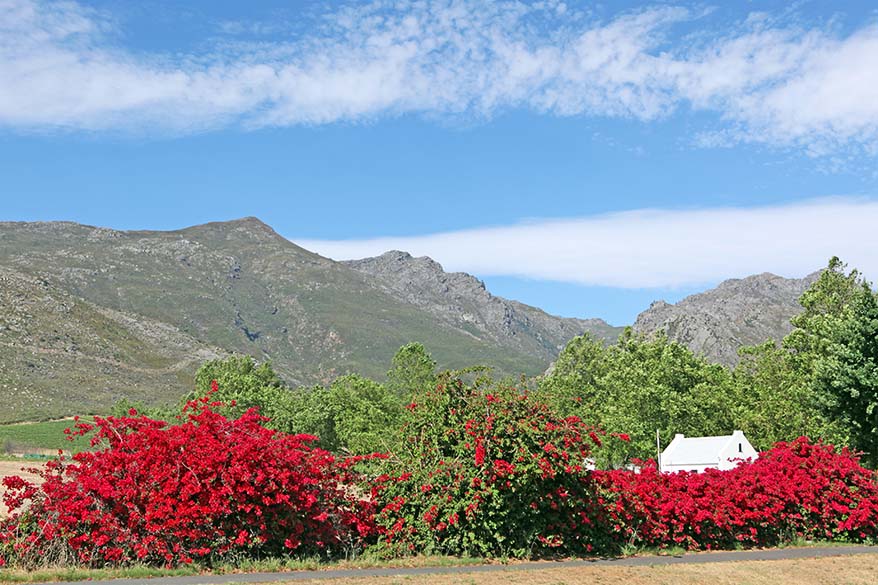
8. Cape Agulhas – Southernmost Tip Of Africa
Cape Agulhas, the Southernmost place in Africa , is so far from every other landmark in South Africa and main tourist routes that it doesn’t get the attention it deserves. But what a beautiful and unique place it is!
Standing at this point where two oceans meet you truly feel like you’ve reached the end of the world…
The best way to visit Cape Agulhas is by making a stop there on your way from Cape Town to the Garden Route (or vice versa). We once did it in a day, just stopping there when driving from Knysna to Cape Town, but it was a really long drive.
TIP: I suggest that you break the drive and either stay in Cape Agulhas or in the area around Hermanus or Gansbaai for one night.
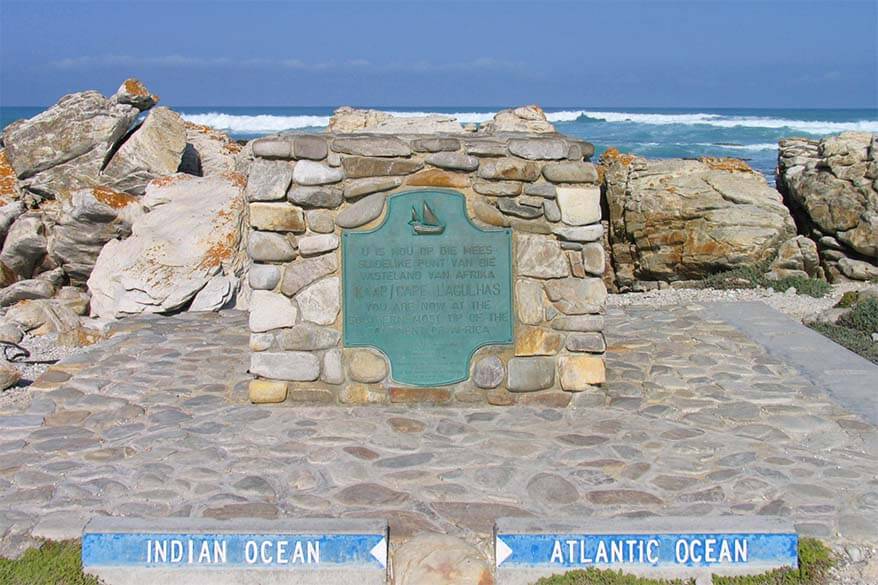
9. Drakensberg
Another wonderful region a bit off the beaten tourist path in South Africa is the Drakensberg mountains . The Dragon Mountain is a +-200km mountain range between the Kingdom of Lesotho and KwaZulu Natal province in South Africa, a few hours drive from Durban.
The region is known for its incredible vistas, countless waterfalls, mountain streams, rock pools, caves, and tranquil scenery pretty much undisturbed by human development. The Drakensberg is the highest mountain range in South Africa and if you visit here in the winter (July) as we did, be prepared for the freezing cold temperatures at night.
Theoretically, you could visit the Drakensberg region just for a day, but ideally, you spend at least a couple of days here. There is a wide range of outdoor activities available, such as hiking or golf to mention just a few…
TIP: If you stay close to the Underberg area (we stayed at this hotel ), you can pop over the border and visit Lesotho for a day ( day tours are available too).
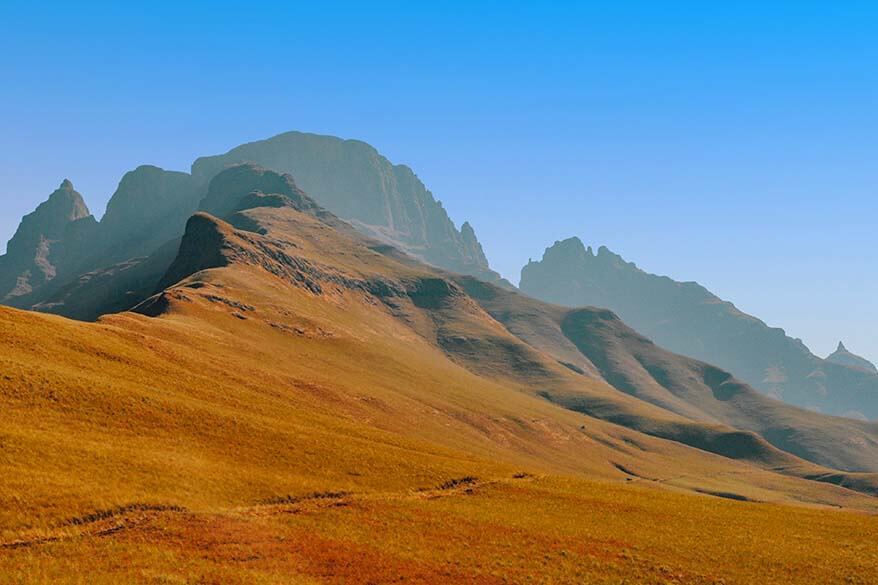
10. Addo Elephant National Park
If you are looking for a malaria-free family-friendly safari experience in Africa, Addo Elephant National Park is one of the very best places to do that.
South Africa’s third-largest National Park is located in the southern part of the country, close to Port Elizabeth and just a few hours drive from the Garden Route.
As the name suggests, Addo Elephant NP is a perfect place to see wild elephants. This park is home to over 600 elephants and they are all around. Many other African animals live here as well and if you are really lucky, you may even get to spot The Big 5…
TIP: You can easily explore the park on a self-drive safari. But – as always – a guided open-jeep safari tour will give you a very different experience. If you come here for a few days and have your own car, I suggest you do both – visit the park on your own but also book at least one safari ride.
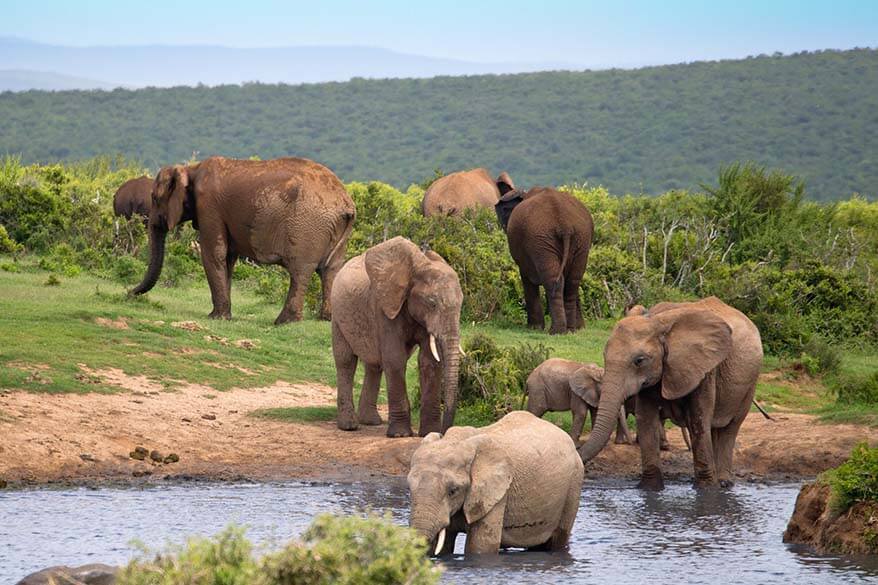
11. iSimangaliso Wetland Park
Listed as a UNESCO World Heritage Site, iSimangaliso Wetland Park has a lot to more to offer than it looks at first sight. It’s not that widely known and definitely not one of the main tourist attractions in South Africa, but it’s well worth a trip.
iSimangaliso Wetland Park has it all: beautiful scenery, unique landscapes, white-sand beaches, snorkeling, diving, and lots of wildlife. You can expect to see rhino, zebra, buffalo, troop baboons, wildebeest, and even elephants, to name just a few…
One of the main reasons tourists visit this area is to see hippos in the wild. iSimangaliso Wetland Park is a paradise for water-loving animals and is, therefore, one of the best places to see hippos and crocodiles in South Africa .
TIP: You can visit the park by car, but if you really want to get close to the hippos and the crocodiles in a safe way, it’s best to book St. Lucia estuary boat tour . The boat tour takes just two hours, so you can spend the rest of the time self-driving and exploring the park.
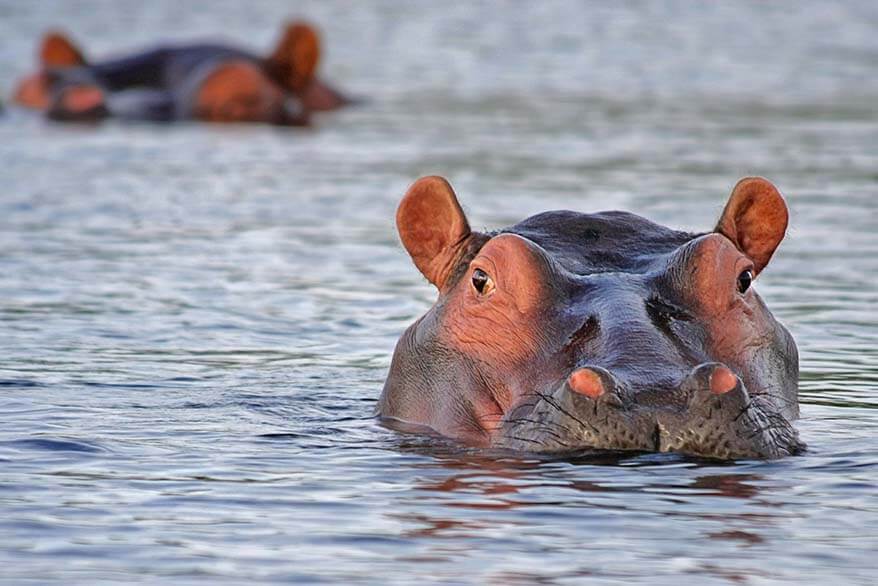
12. Pilanesberg National Park
Just over 2 hours drive from Johannesburg, Pilanesberg National Park is probably one of the easiest and best-accessible places for a wildlife safari in South Africa.
Pilanesberg Game Reserve is set in an extinct volcanic crater, where the soil is rich with grasslands, perfect for wildlife. A man-made lake, Mankwe Dam, is used as a drinking waterhole – a perfect place to see African animals.
Wildlife here includes zebras, lions, elephants, rhinos, leopards, and many other species. Because the park is rather small, it’s quite easy to find the animals, even if you come here just for a few hours.
TIP: You can visit Pilanesberg National Park as a day trip from Johannesburg , but if you have some time to spare, stay a few days. If you like places like Las Vegas in the US , don’t miss the nearby Sun City with entertainment for young and old.
From luxury resorts and casinos, waterparks and golfing, to outdoor activities, wildlife viewing, and even hot air balloon safari – this area truly has it all.
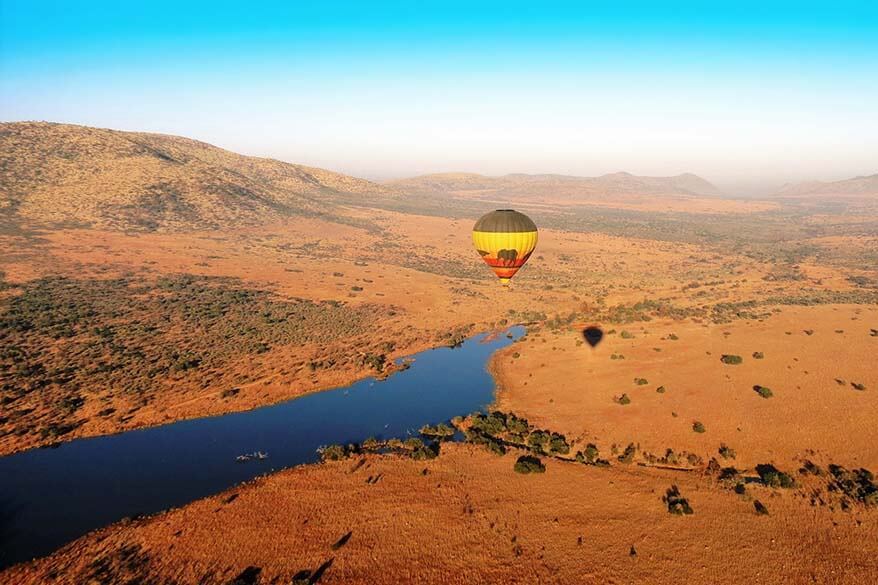
13. Hluhluwe-iMfolozi Park
One can never have too many safari experiences in Africa, right? So if you are visiting St.Lucia/Durban area, then I really recommend a day trip to Hluhluwe-iMfolozi Park .
This park is not as well known as Kruger and the other National Parks mentioned above, but it’s just as beautiful and offers amazing wildlife viewing. Africa’s Big 5 live here and, of course, many other animals.
TIP: You can visit this park on a self-drive safari or take a guided safari tour from Durban . If you want to make the best of your short time, you can also opt for a tour that combines Hluhluwe and iSimangaliso Wetlands, mentioned above.
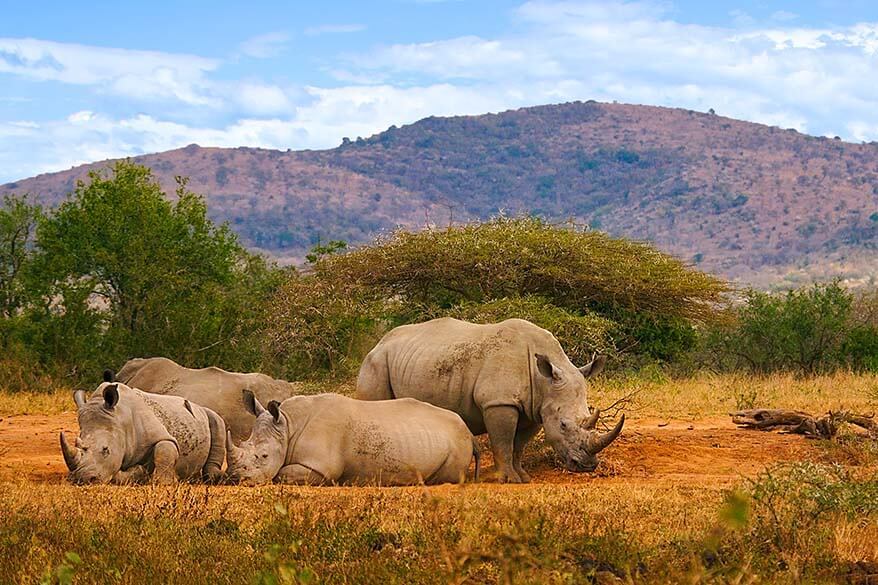
14. West Coast National Park
Just an hour drive north of Cape Town, West Coast National Park is the locals’ favorite, so if you come in a warm season, expect it to be busy. This park has beautiful beaches, stunning coastlines, scenic hiking trails, wildlife, and lots of wildflowers.
Springtime (August – September) is the best time to see the flowers and the park might be even busier than usual.
West Coast National Park is considered a real jewel. It’s not a must-see in South Africa if you are short on time, but if you are staying in Cape Town and have a day to spare, definitely check it out!
TIP: There aren’t many facilities here; it’s all about nature. So if you come for a day, make sure to bring some food and plenty of water.
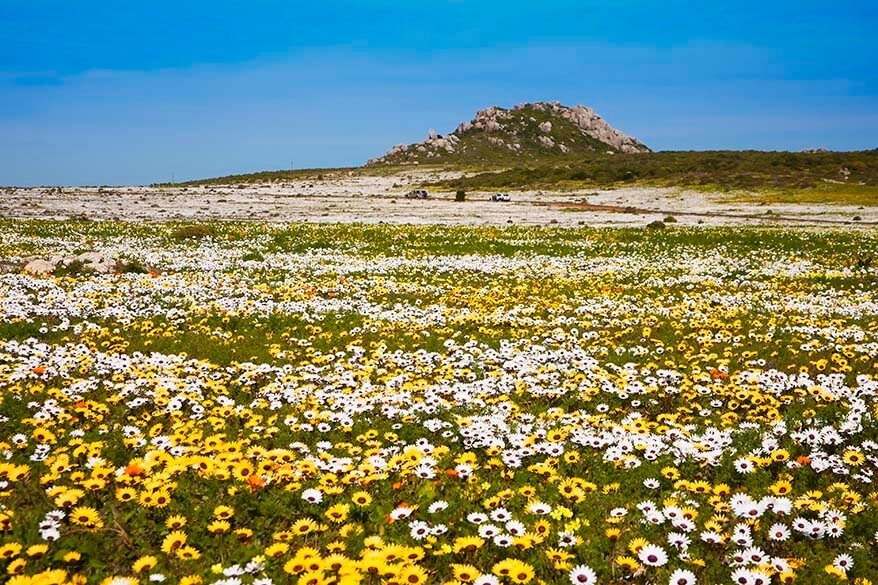
Durban is considered one of the cities that you should see in South Africa. We found that there were better ways to spend our time in South Africa than visiting its cities… so we didn’t stay in Durban longer than necessary. Just in case you wonder, Cape Town is a whole other story, one city you have to see.
Nevertheless, if you are traveling in this area, you shouldn’t miss Durban. One of the best things to do here is go to the beach and stroll the Golden Mile , visit UShaka Marine World or Durban Botanic Gardens .
Durban is also a good base for a day trip to the earlier mentioned Hluhluwe-iMfolozi NP and iSimangaliso Wetland Park, and also to the Drakensberg mountains. A really interesting thing to do in Durban is also this Shakaland and Zulu culture day trip .
TIP: If you are short on time, fly from Durban to Port Elizabeth or Cape Town – it will save you lots of driving.
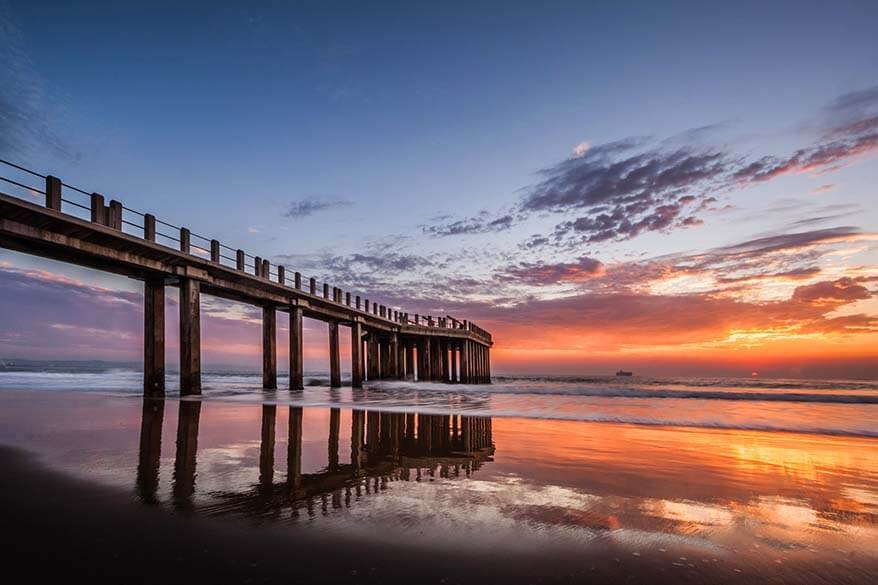
16. Johannesburg
The largest city in South Africa, Johannesburg’s history goes back to the 19th century. It’s hard to believe that this bustling city with a population of 1 million started as a gold-mining settlement.
If you want to learn about South Africa’s long part to democracy, then don’t miss Soweto township ( go with a guide! ) which was once home to Nelson Mandela and also Desmond Tutu.
Must-see in Johannesburg is the Apartheid Museum and Constitution Hill , a former prison complex. Mahatma Gandhi, Nelson Mandela, and tens of thousands of others were imprisoned here at some point in South Africa’s turbulent history…
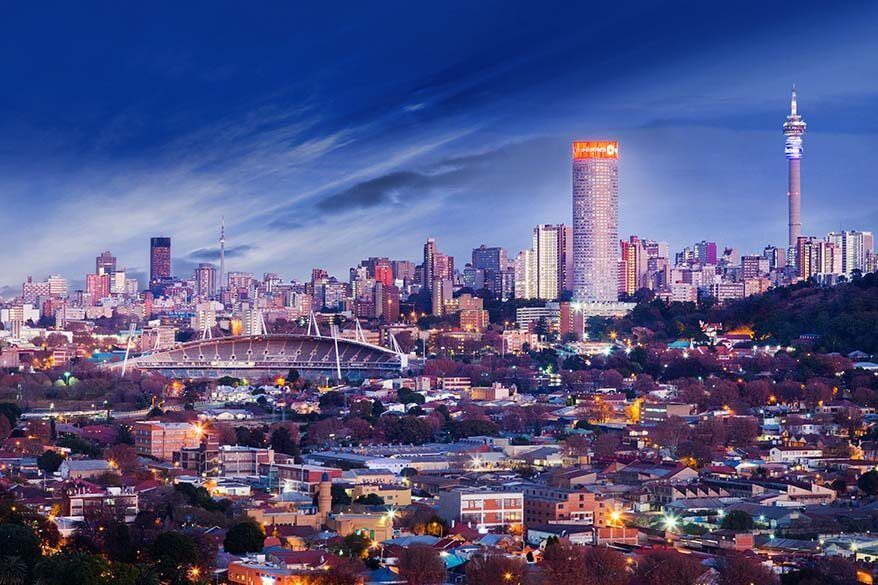
17. Namaqua National Park & Namaqualand
Namaqualand and Namaqua National Park , close to the Namibian border, are so far from all the other tourist attractions in South Africa that you’ll hardly ever see it mentioned as one of the best places to visit in the country. It’s actually more of a hidden gem of South Africa.
Come spring and the dusty valleys are transformed into a magical wildflower wonderland. The whole area is covered in colorful flower carpet, attracting local visitors and international tourists alike.
If you are visiting South Africa in August-September and feel like getting off the beaten path, you may want to include this unique region in your itinerary.
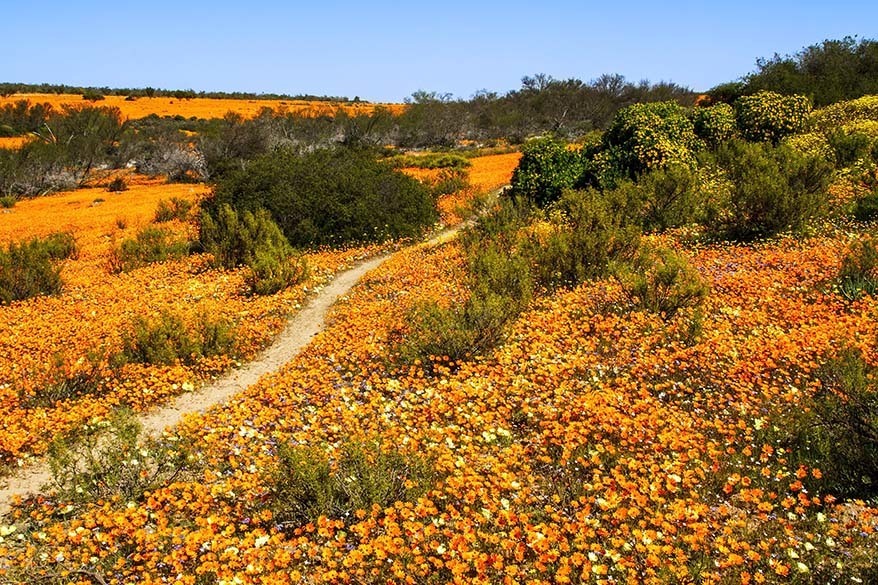
Best places to visit in South Africa on the map
In order to help you plan your trip to South Africa and visit as many of the highlands as possible, I created this map indicating all the places mentioned in this article. This way you can get a better idea of where everything is located and plan accordingly.
How to use this map: Use your computer mouse (or fingers) to zoom in or out. Click on the icons to get more information about each place. Click the arrow on the top left corner for the index. Click the star next to the map’s title to add it to your Google Maps account. To view the saved map on your smartphone or PC, open Google Maps, click the menu and go to ‘Your Places’/’Maps’. If you want to print the map or see it in a bigger window, click on ‘View larger map’ in the top right corner.
So, this is our list of the most beautiful and trip-worthy places to visit in South Africa . If you are wondering where to go and what to see in South Africa, now you should have a much better idea.
South Africa Travel FAQ
Here are some of the popular questions our readers ask about visiting South Africa:
South Africa is a year-round destination and every season has something to offer. The best time to see wildlife in Kruger National Park is the dry season between May and October. Whereas the best time to visit Cape Town and the Garden Route is between September – November and from March to May.
South Africa is huge and there are so many beautiful places to see. But if you have to choose just one area to visit, we recommend Cape Town and Cape Peninsula.
South Africa is not the safest place to visit in the world and the crime rate is quite high. That being said, if you are cautious, aware of your surroundings, and do not take unnecessary risks, crime against tourists is really not that common. We visited South Africa several times, also with kids, and we never experienced any problems.
No, South Africa is not an expensive destination. The biggest cost or the trip is the flight to get there. Accommodation, food, and activities are quite cheap in South Africa. But – as everywhere in the world – a lot depends on the choices you make and mostly on the accommodations that you choose.
2 weeks is the minimum time if you want to see the most beautiful places of South Africa. If you have about 10 days, spend 3 days in Kruger NP and fly to the south of the country for the rest of the trip. If you have 1 week or less, it’s best to concentrate on just one area – either Kruger NP and surroundings or Cape Peninsula and the Garden Route.
TIP: When planning a trip to South Africa, make sure to also check our South Africa itinerary . It contains most of the highlights of South Africa from this list and shows you how to see all the best places in just two weeks. Check it out – it will help you plan a trip of a lifetime!
And if you are traveling with a family, check out this guide for more info on what to expect and where to go when visiting South Africa with kids .
If you found this post helpful, don’t forget to bookmark it and share it with your friends. Are you on Pinterest? Pin these images!
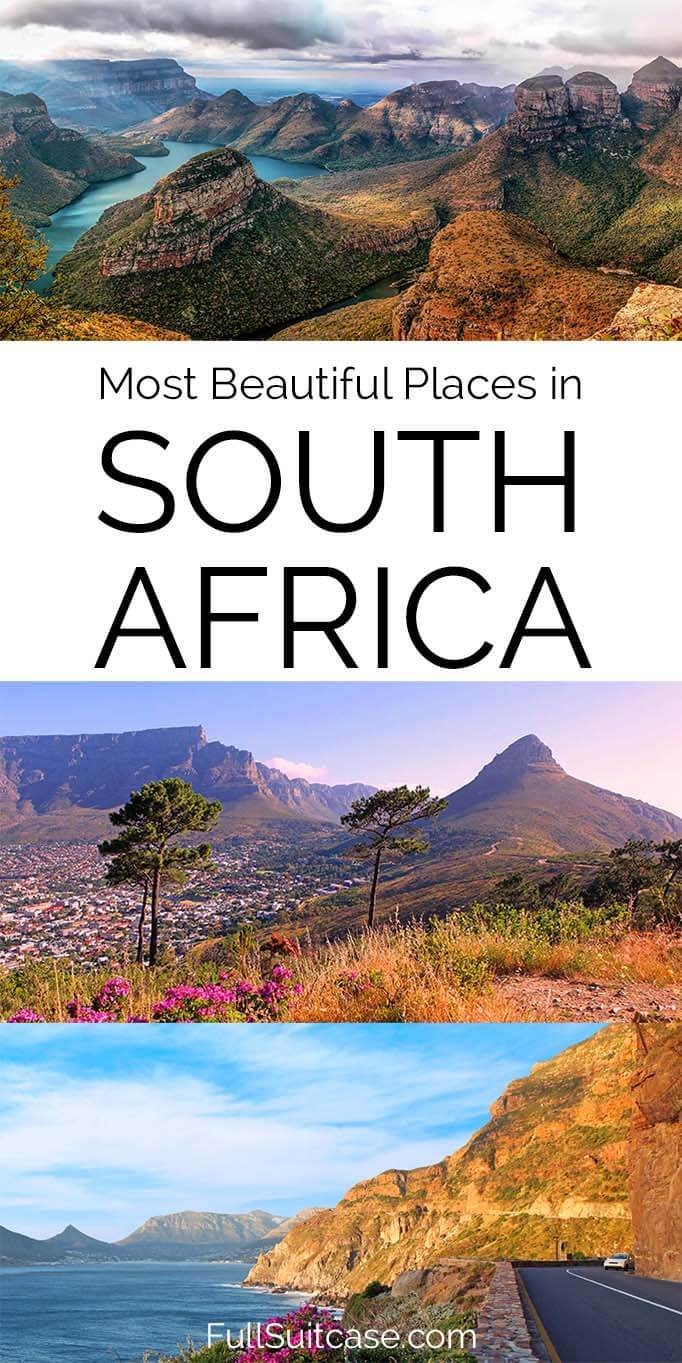
This site uses Akismet to reduce spam. Learn how your comment data is processed .
Sunday 30th of October 2022
Hi, South African here living in Jhb. A must is Oribi Gorge Southern KWAZULU-NATAL, if planning a Durban trip. I love traveling my country as well as other African countries.
We just got back this September from a road trip to Etosha National Park, Namibia. As always we absolutely loved it.
Sunday 6th of November 2022
Thanks for the additional tip and happy travels, Vennie!
Sunday 18th of September 2022
This is so helpful! I will definitely go to South Africa someday. Thank you so much!
Monday 19th of September 2022
Glad to hear that. Hope you can visit South Africa one day - it's a wonderful country!
Wednesday 4th of May 2022
Thanks Jurga! This is a great source of information. Just planning a three week trip to South Africa for December 2022. My first trip to South Africa since 1991. You've given me plenty of ideas for my itinerary.
Oh, lucky you! We're also contemplating another trip to S-A soon. Good luck with the planning and have a great trip! PS We also have a guide with a sample 2-week South Africa itinerary - check it out. You could build on it if you want to visit all these places and add more since you have 3 weeks.
Tuesday 22nd of March 2022
Thanks for sharing such a beautiful informative information on the blog. I have read your other posts which are all really informative for any traveler before arriving South Africa.
Wednesday 23rd of March 2022
Glad to hear you found our guides useful. Happy travels!
Thursday 10th of February 2022
The end of this month I am going to travel to South Africa by myself. I am 21 years old and I am from the Netherlands. The first 2 weeks I am going to work at an Baboon orphanage center in Phalaborwa, which is next to the Kruger National Park. In these two weeks I will have some free time to visit the Kruger Park on a safari. After the two weeks I have 4 weeks to travel by myself to see other beautiful places in South Africa, and stay in hostels etc. My idea is to take a flight after the two weeks from Hoedspruit airport to Durban or Kaapstad, and then stay there for a while and see other nice places. Do you guys have any tips for my journey?
Kind regards,
Friday 11th of February 2022
Hi Jesse, this sounds like an amazing experience for you! With 4 weeks to travel in South Africa (and already having seen Kruger before), you can see a lot. Durban - Drakensbergen area is nice, but I'd definitely try to spend more time in the south - the Garden Route, Cape Town, etc. If you are not renting a car, it will be a bit more difficult to explore outside the cities, but you can find a lot to do in/near them too. If you choose just one place, then Cape Town is really the best option. And you can also take some tours if there are some places you absolutely want to see and can't easily get to on your own. Hope this helps a bit. Have a great time in South Africa!
Nomadic Matt's Travel Site
Travel Better, Cheaper, Longer
South Africa Travel Guide
Last Updated: November 10, 2023
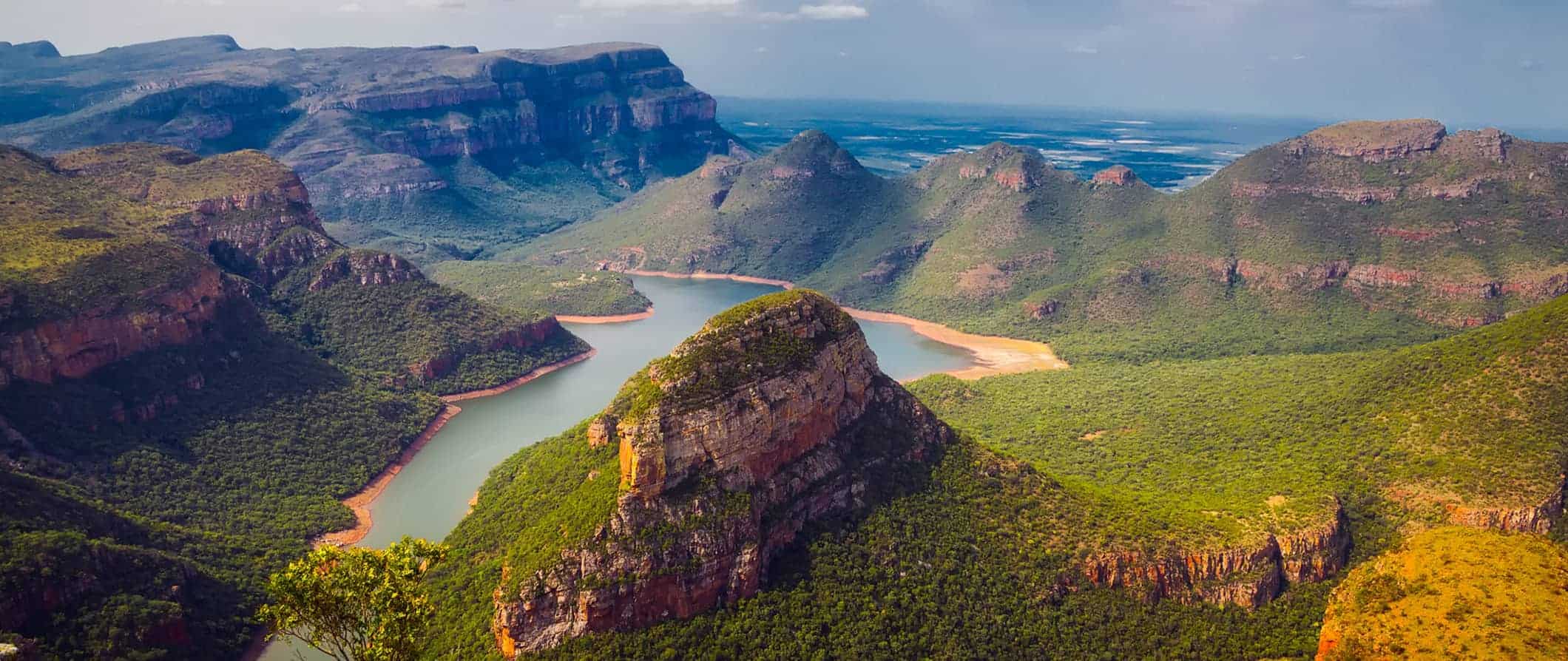
Offering amazing safaris, rugged mountains, world-class wineries, an endless coastline, and lively cities like Cape Town , South Africa is a magical destination that is often overlooked by budget travelers.
Annexed by the Dutch and British before gaining independence in 1931, South Africa struggled with apartheid from 1948 all the way until 1990. The remnants of that dark time can still be seen around the country today, however, things have been improving and the country has been moving forward in leaps and bounds.
While South Africa still struggles with corruption and petty crime (be sure to watch your stuff while you’re here) , its rich but tumultuous history, incredible natural beauty, and international culture make it a worthwhile stop on any round-the-world itinerary. It also has the most UNESCO sites in all of Africa!
This travel guide to South Africa can help you plan the perfect trip without breaking the bank to ensure you make the most of your time in this incredible country.
Table of Contents
- Things to See and Do
- Typical Costs
- Suggested Budget
- Money-Saving Tips
- Where to Stay
- How to Get Around
- How to Stay Safe
- Best Places to Book Your Trip
- Related Blogs on South Africa
Top 5 Things to See and Do in South Africa
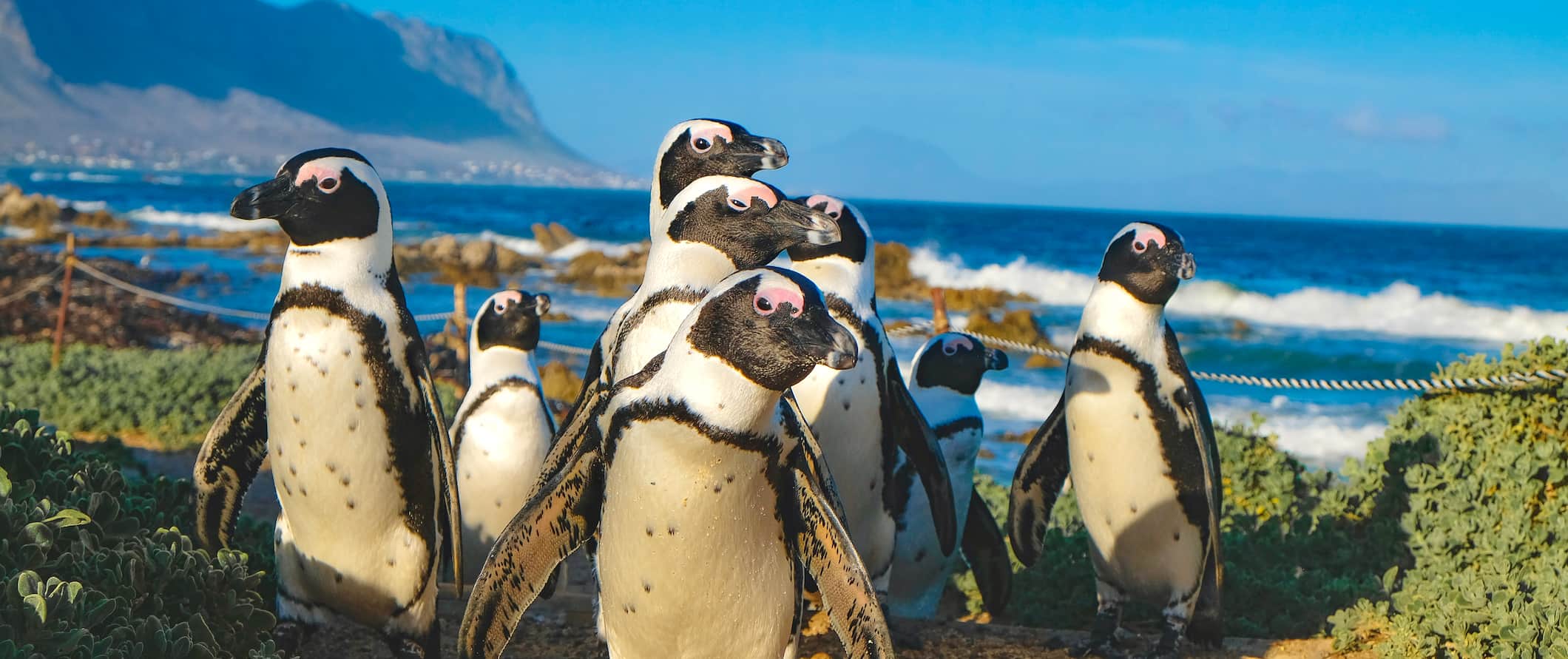
1. Enjoy Cape Town
Hike up Table Mountain, explore Kirstenbosch Botanical Gardens, tan on pristine beaches, visit Robben Island, and go on a wine tour. Cape Town has it all, so spend as much time as you can here. There’s also lots to see outside the city, including Boulders Beach ( where you can see penguins ) and Cape Point.
2. Learn about Apartheid’s tragic past
Gain a deeper understanding of South Africa by visiting the Apartheid Museum in Joburg, taking a tour of Robben Island (where Nelson Mandela spent 18 years in prison), and exploring Soweto (SOuth WEstern TOwnships), a township created by the Apartheid government in Gauteng. It’s a dark, eye-opening era to learn about.
3. Explore Kruger National Park
Kruger National Park is the biggest, most popular, and busiest game reserve in the country. It’s a huge park with over 2 million hectares (almost 5 million acres) of space brimming with wildlife (including the Big 5). A basic three-day budget safari costs about 12,000 ZAR.
4. Drive the Garden Route
This route stretches along the Indian Ocean from Mossel Bay to St Francis, offering beautiful landscapes, serene beaches, picturesque towns, scenic wetlands, and sprawling wineries along the way. The journey is only about 200 kilometers (125 miles), but don’t rush — it’s best to spend a few days stopping and exploring as you go.
5. Day trip to Eswatini (formerly Swaziland)
Formerly called Swaziland, this tiny country was renamed in 2018 (Eswatini means “land of the Swazis”). There are several large game parks and reserves here, making it a great destination for more wildlife spotting. Be sure to visit Hlane Royal National Park. Borders can be a bit slow, so check the wait times before you go.
Other Things to See and Do in South Africa
1. partake in extreme sports.
South Africa offers over 100 extreme sports, including bungee jumping, sandboarding, skydiving, parasailing, jungle zip-lining, scuba diving, and more! Prices vary but expect skydiving to cost around 2,800-3,100 ZAR and bungee jumping to cost around 1,400 ZAR. The world’s third-highest bungee jump point, at Bloukrans Bridge, is here in South Africa (it’s 216 meters/708 feet). If you’re going to go cage diving with sharks, make sure you avoid companies that chum the waters to entice the sharks as that isn’t an ethical or sustainable practice.
2. Explore KwaZulu-Natal
People flock to the South African province of KwaZulu-Natal (KZN) on the east coast to relax, tan, ride the waves, eat amazing food, drink, and spot animals. KwaZulu-Natal’s game-rich Zululand and Elephant Coast in the north provide great wildlife spotting. This is also the birthplace of so many famous and powerful South Africans, including former presidents, the founder of the African National Congress, anti-apartheid leaders, and one of the most influential monarchs of the Zulu Kingdom, Shaka Zulu (1787-1828). KZN has diverse landscapes, interesting activities, and a mix of city life and rural-tribal life. One thing that’s consistent throughout the region is the level of pride in the Zulu culture.
3. Surf the waves
Dungeons Beach, near Cape Town, is a great place to spend some time if you have experience riding gigantic waves. Really — only surf here if you’re a seasoned professional, as the cold water and unpredictable waters are dangerous for new surfers. Beginners should visit Jeffreys Bay (J-Bay), about 75 kilometers (47 miles) west of Port Elizabeth, which is famous for its awesome right-hand point breaking waves. Muizenberg on False Bay is one of the best options for winter longboarding when the north-westerly wind picks up, and Durban has waves ideal for newbies and pro surfers alike. Group surfing lessons cost around 350 ZAR, including equipment.
4. Explore the Cango Caves
These caves, located in the Swartberg Mountains in the Western Cape Province, are 20 million years old and stretch for 4 kilometers (2.5 miles). You can see the exquisite stalagmite formations during the subterranean tours and learn about its history from the Interpretive Center. The standard tour costs 150 ZAR, while a more adventurous (and longer) tour is 220 ZAR, though you should only take this tour if you’re comfortable crawling through very tight spaces. Wear sensible footwear when visiting.
5. Hike Table Mountain
One of the best things in Cape Town is hiking up Table Mountain. It’s a steep, tiring climb that takes around two hours, but the views are worth it. There’s a nice little cafe and a cobblestoned area to walk around at the top so you can relax and admire the view when you’re done. Once you successfully reach the summit, you can take the cable car back down. A one-way ticket is 210 ZAR for adults or 320-390 ZAR for round-trip tickets. Be sure to dress appropriately and bring water as the weather can change quite quickly.
6. Admire the Big Tree in Tsitsikamma National Park
Estimated to be about 800 years old, this majestic Yellowwood tree is located in the Tsitsikamma National Park along South Africa’s Garden Route. This tree of epic proportions stands 36.6 meters (120 feet) high and has a trunk circumference of 9 meters (30 feet). There is a 500 meter (1,640 foot) wooden walkway through the indigenous forest leading to this tree, and from there, you can journey onto a 3-4 kilometer (1.5-2.5-mile) walk if you follow the Ratel Nature Walk signposts. Admission is 12 ZAR. While you’re here, you can also hike many of the other trails in the park, which stretches 80 kilometers (50 miles) along the coastline.
7. Sleep in Gandhi’s house
Did you know that Mahatma Gandhi spent 21 years in South Africa? While he was there, Gandhi’s close friend and German architect Hermann Kallenbach designed and built this farmhouse in 1907, which then served as Gandhi’s South African base from 1908-09. The house is called Satyagraha House and is situated in Orchards, Johannesburg. It’s the spot from which Gandhi developed his plan for passive resistance against the British Empire. It’s been beautifully restored and provides free day visits or overnight stays in one of its seven rooms (prices from 3,080 ZAR).
8. Drive the Namaqualand Flower Route
The Namaqualand Flower Route is a 650-kilometer (404-mile) drive from Yzerfontein to Richtersveld National Park. While you can drive it in one day, most people break it up into sections and take a few days to do it. This region bursts into a sea of color every spring (mainly mid-August and mid-September, peaking in August) when over 4,000 species of flowers bloom. Head north to Springbok, and then make your way down in a southerly direction so the flowers are facing you. The flowers are best viewed on non-overcast days between 10:30am-4pm, so plan your trip accordingly. The Goegap Nature Reserve provides picnic areas and overnight facilities as well. Expect to pay between 320-1,200 ZAR per night.
9. Visit the wineries
South Africa is one of the biggest wine exporters in the world, exporting over 300 million liters (80 million gallons) of wine each year. Visit the vineyards to taste some incredibly fresh wine against a serene, mountainous backdrop. Cape Town is most popular for these tours, but there are great wine regions all over the country, including the Coastal Region, Klein Karoo, Breede River Valley, Olifants River, and Cape South Coast. Jump on an 8-hour day tour that goes from winery to winery, sampling all sorts of wine while learning all about the history of winemaking in South Africa. Tours start at 950 ZAR for a half-day tour.
10. Drive the Sani Pass to the Roof of Africa
Drive the Sani Pass Mountain route in Lesotho — the only route over the Drakensberg escarpment into the mountainous Kingdom of Lesotho. Since it first opened in 1955, the Sani Pass has offered an exhilarating journey as it twists and turns upwards through rocky cliffs that peak at 2,873 meters (9,425 feet) above sea level (hence the name “the Roof of Africa”). Only 4×4 vehicles are allowed on the road, which is treacherous and has been the site of countless accidents. As an alternative to attempting the drive yourself, several tour operators offer day tours, generally costing 940 ZAR. Afterward, bask in your victory as you enjoy a drink at Sani Mountain Lodge, known for being the highest pub in Africa!
11. See the Durban Beachfront
For decades the Golden Mile beachfront in Durban has been popular with cyclists, joggers, and leisurely strollers. You can also explore the Indian District, where dealers in traditional kurtas and saris hawk incense, ornately embroidered fabrics, and aromatic spices. Other sights in the city include visiting the KwaMuhle Museum, the Durban Botanical Gardens, the Tala Game Reserve, the Inanda Heritage Trail, or seeing a Sharks rugby game. Surfing is another popular activity here thanks to the ideal oceanic conditions.
12. Tour Riemvasmaak Community Conservancy
In 1973, under apartheid, 1,500 people were forcibly removed from this area. After the elections in 1994, they were able to return and now welcome visitors to their community. The park is located in the Kalahari Desert, making for some stark — but beautiful — landscapes, with unique rock formations and translucent green fluorite mineral deposits. There are many 4×4, hiking, and mountain biking trails here, as well as plenty of hot springs. There are small guesthouses and camping plots if you’d like to stay overnight.
13. See the penguins
The African penguin is the only penguin to breed on the continent. You can see them at Boulders Beach or Stoney Point Nature Reserve at Betty’s Bay (both locations are a short drive from Cape Town). You don’t often get to see penguins outside of zoos, so it’s definitely worth the drive to see this colony of penguins living their best lives on the beach. Try to arrive before 11am to get the best view of the penguins with the fewest crowds around. Entrance fees range from 25-152 ZAR and full-day guided tours cost 780 ZAR.
14. Surf the waves at Muizenberg Beach
Known for its iconic multi-colored huts on the boardwalk, this is a laid-back neighborhood in Cape Town with a multi-cultural vibe. If you want to hit the waves, you can rent a board for as little as 250 ZAR and a wetsuit 150 ZAR for the day (also available for cheaper by the hour). If you don’t know how to surf, you can also register for SUP or surf lessons at one of the surf shops nearby. Group surf lessons are 235-310 ZAR.
15. Safari in other national parks
While Kruger gets all the love, check out Pilanesberg National Park, Addo National Park, Umfolozi National Park, and the St. Lucia Wetlands. Without the crowds of Kruger, you’ll have ample opportunity to get up close to elephants, lions, leopards, rhinos, and more. From Johannesburg, the Madikwe Game Reserve, Pilanesberg Game Reserve, and the Dinokeng Game Reserve are just some of the options for nearby safaris.
16. Go whale watching
South Africa is one of the best places in the world to go whale watching. If you’re visiting between June and November, there’s an excellent chance of spotting Southern right whales, Bryde’s whales, and orcas. The town of Hermanus, located 120 kilometers (75 miles) southeast of Cape Town, is the base for many of the best whale-watching companies in the country. Some reputable companies include Southern Right Charters, Hermanus Whale Cruises, and Xplora Tours. Expect to pay around 900-1,020 ZAR for a two-hour tour.
For more information on specific cities in South Africa, check out these guides:
- Cape Town Travel Guide
South Africa Travel Costs
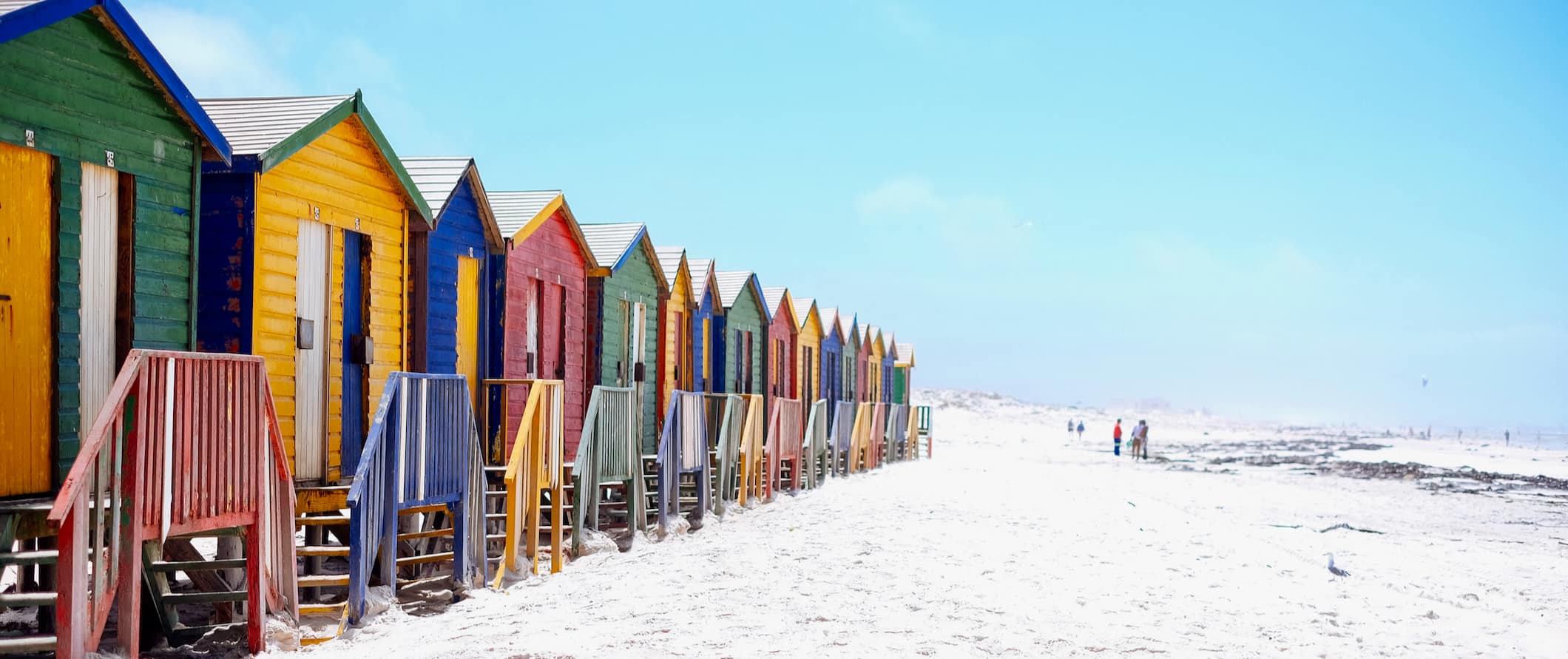
Accommodation – A bed in a 4-8-bed hostel dorm costs 250-300 ZAR per night, and around 215-230 ZAR per night for a dorm with 10 or more beds. A private double room costs 600-935 ZAR. Free Wi-Fi is standard and many hostels also include free breakfast and/or have a kitchen, as well as a swimming pool.
For those traveling with a tent, campgrounds can be found all around the country. Expect to pay between 100-400 ZAR per night, depending on the facilities and location.
If you are looking for a hotel, budget hotels range from about 850-1,200 ZAR for a twin or double in big cities and get cheaper in more rural areas. Standard amenities include Wi-Fi, private bathrooms, and air-conditioning. For a hotel with amenities like free breakfast and a swimming pool, expect to pay at least 900 ZAR per night.
Generally, accommodation prices are higher in Cape Town and Johannesburg and inside of any national parks. If you want to cut your prices, think about staying away from the city center, in lesser visited towns, and outside of the national parks when you’re going on a safari.
In the low season, you can find hostels and hotels for 10-20% cheaper.
Airbnb is also an option around the country, though it’s most commonly available in larger urban areas. A private room costs 300-600 ZAR per night while an entire home or apartment costs at least 700-900 ZAR.
Food – Due to its history of colonization and immigration, South African cuisine is a mix of indigenous, Dutch, British, Indian, and Malaysian culinary traditions.
Above all, South Africa is known for its meaty meals. A favorite pastime of South Africans is the braai , an open-air barbeque that originated in the townships of Johannesburg. Often served with your plate of barbeque are chakalaka , a dish of onions, tomatoes, peppers, carrots, and beans, and pap, a maize porridge.
Other popular dishes include bobotie (a baked dish of curry-spiced minced meat with egg on top) and potjiekos (a stew with meat, veggies, and potatoes). Common desserts include melktert (a custard tart) and malva pudding (like sticky toffee pudding).
Overall, restaurants in South Africa are pretty affordable. At a café, some coffee and a small meal cost 100 ZAR. At a casual restaurant serving traditional South African cuisine, expect to pay around 150 ZAR for a meal.
In terms of traditional barbeque, prices for one person vary, but are usually between 100-220 ZAR. Be sure to try biltong (thinly sliced air-dried meat), droewors (air-dried sausage), and boerewors (farmers sausage) if you’re a meat-eater.
A delicious dish that originated in the Indian community is bunny chow, a spicy curry served in a bread bowl that can also be served vegetarian. This dish is usually found at street food and takeaway spots, costing around 65-90 ZAR. At a sit-down Indian restaurant, expect to pay 90-140 ZAR for a typical curry meal.
In terms of fast food, a meal at Nando’s or another fast-food chain costs about 60-85 ZAR per person. A Chinese takeout meal costs around 75-125 ZAR.
At a nicer restaurant, a three-course meal with wine costs 280-320 ZAR per person, though you can find some main dishes for around 120 ZAR. In the same types of restaurants, a burger is 100-130 ZAR, a whole pizza is 120-160 ZAR, and a pasta dish is 90-155 ZAR.
Expect to pay around 30-35 ZAR for a beer and 50-70 ZAR for a cocktail. A glass of wine is 45-60 ZAR, while a bottle costs 120-250 ZAR. A bottle of water is 11 ZAR, soda is 20 ZAR, and a cappuccino is 25 ZAR.
The low-cost alternative to eating out is to buy groceries. A week’s worth of basic groceries for one person costs around 400-550 ZAR. This gets you basic staples like rice or pasta, seasonal produce, and some meat or fish. If you want to keep costs low, avoid expensive items like chicken, beef, and cheese.
Backpacking South Africa Suggested Budgets
On a backpacker’s budget of 850 ZAR per day, you can stay in a hostel, cook most of your meals, limit your drinking, do mostly free activities (walking tours, enjoying nature), and use public transportation to get around.
On a mid-range budget of about 1,900 ZAR per day, you can stay in a private hostel or Airbnb room, eat out for most meals, enjoy a few drinks, take the occasional taxi to get around, and do more paid activities like going on a safari or taking surf lessons.
On a “luxury” budget of 3,600 ZAR or more per day, you can stay in a hotel, eat out anywhere you want, rent a car, do more safaris and adventure sports, drink more, and do whatever else you want. This is just the ground floor for luxury though. The sky is the limit!
You can use the chart below to get some idea of how much you need to budget daily, depending on your travel style. Keep in mind these are daily averages — some days you’ll spend more, some days you’ll spend less (you might spend less every day). We just want to give you a general idea of how to make your budget. Prices are in ZAR.
South Africa Travel Guide: Money-Saving Tips
It doesn’t cost a lot of money to travel around South Africa. Except for adventure sports and tours, everything is relatively cheap. But that doesn’t mean you can’t save more money! Here are some tips for saving money in South Africa:
- Pitch a tent – Most hostels have yards that they allow travelers to pitch a tent in. It costs much less and you still have the option to use the bathroom, kitchen, and other amenities.
- Work for your room and board – South Africa has plenty of farms and an active WWOOFing community. If you’re looking to stay for a while, cut your food and accommodation costs by spending some time working on a winery or farm.
- Sleep on the train – The Shosholoza Meyl train service connects Johannesburg, Cape Town, Durban, Port Elizabeth, East London, Komatipoort, and Musina. Prices vary depending on where you are going, but a one-way ticket from Cape Town to Johannesburg costs around 690 ZAR and takes over 24 hours.
- Rent a car – Renting your own car is the best way to get around South Africa since the buses can be quite slow. Prices vary depending on what sort of vehicle you get, but they are generally around 500 ZAR per day.
- Drink in hostels – Most hostels have a small bar where socializing after a day of sightseeing is the thing to do. Local beer and wine can be purchased cheaper here than most bars and restaurants. If you’re going to drink, this is the place to do it!
- Cook your own food – Purchase groceries at discount supermarkets like Pick n’ Pay or Checkers to prepare meals at your hostel. This will cut down your costs significantly!
- Bring a water bottle – The tap water here is generally not safe outside of urban areas so bring a reusable water bottle with a filter to save money and reduce your plastic use. LifeStraw is my go-to brand as their bottles have built-in filters to ensure your water is always clean and safe.
Where to Stay in South Africa
Looking for a budget-friendly place to rest your head in South Africa? Here are some of my suggested places to stay:
- 91 Loop (Cape Town)
- Never at Home Green point (Cape Town)
- Curiocity Backpackers (Johannesburg)
- Kruger Inn Backpackers (Kruger)
- The Kingdom Resort (Pilanesburg)
- 1322 Backpackers International (Pretoria)
How to Get Around South Africa
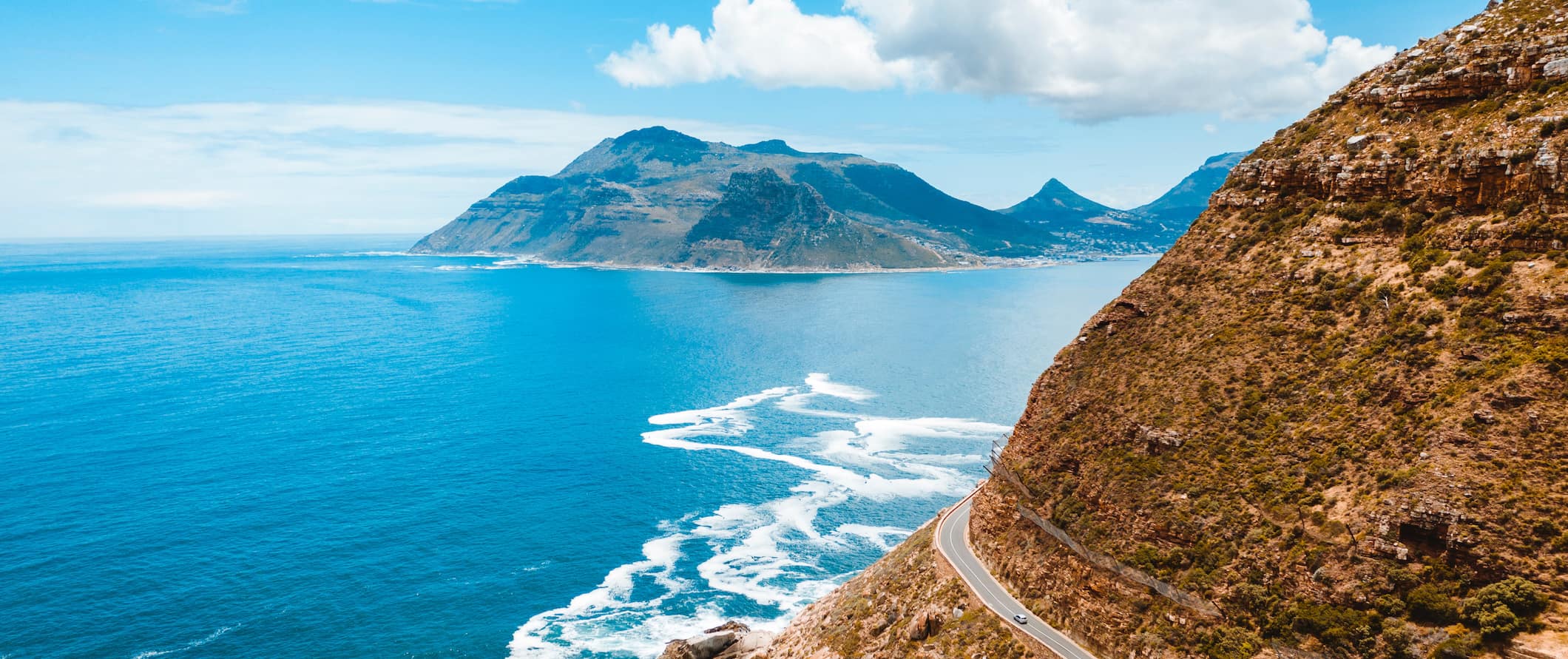
Public Transportation – Public transportation is available in the larger cities, though it is notoriously unreliable (and I wouldn’t recommend taking buses or vans within the cities for safety reasons). I also definitely don’t recommend taking the metro around Pretoria or Johannesburg as they’re not safe.
If you must use public transportation, I only recommend MyCiTi buses in Cape Town, which costs 7-13 ZAR for up to 20 kilometers (12 miles), and the People Mover in Durban (6 ZAR per ride, or 16.50 ZAR for a day pass).
Taxi – Instead of buses, minibusses, or shared taxis, I suggest calling for a private taxi. Rates are generally low and vary between cities. In Cape Town, rates average 12 ZAR per kilometer, often with a minimum charge of 30 ZAR.
Ridesharing – Even safer than taxis is Uber, which is available in Cape Town, Johannesburg, Pretoria, Durban, and Port Elizabeth. This is how I recommend getting around if you’ll have phone service while you’re there.
Bus – Buses are generally the most reliable public transportation between cities, with trips costing anywhere from 250-700 ZAR. The most popular operators are:
- City to City
Since Greyhound pulled out of South Africa in 2021, Intercape is now the main bus provider, with an extensive reach throughout the country. For longer distances, you can choose a more comfortable reclining seat on their overnight Sleepliner bus.
City to City offers a less expensive, no-frills service that goes to many off-the-beaten-track places, including townships and mining towns.
In terms of prices for main routes, the 18-hour bus from Cape Town to Johannesburg costs around 380-600 ZAR, while the 8.5-hour bus from Durban to Pretoria is 225 ZAR.
To find bus routes and prices, use BusBud .
Train – Train rides are less common but more comfortable and safer than buses. Shosholoza Meyl (South African Railways) has long-distance trains that serve Cape Town, Port Elizabeth, Bloemfontein, Durban, East London, Johannesburg, Queenstown, and East London. They’re comfortable and safe, making various stops at smaller towns along the way. Both tourist and economy classes are affordable options.
The overnight journey from Johannesburg to Cape Town costs around 750 ZAR and is a gorgeous ride with a dining car, showers, and accommodation in a two- or four-berth compartment (if available, couples are given coupes and single travelers and groups are put in compartments). If you are traveling alone and you want a coupe to yourself, you’ll need to buy two tickets.
The economy class is fine for shorter daytime trips; however, it doesn’t have sleeping carriages and is not a comfortable or safe option for overnight travel.
Tourist-class sleepers can get fully booked a month or so ahead, especially on popular routes, so plan ahead.
For those who are interested in luxury, the famous Blue Train , which runs from Pretoria to Cape Town, costs 38,000 ZAR for a luxury double berth. The trip lasts a few days and includes wine, cigars, great food, and comfortable compartments. It’s the fanciest way to see the country!
Flying – Depending on the route, domestic fares are generally affordable. It costs 750 ZAR from Cape Town to Johannesburg, 1,000 ZAR from Cape Town to Durban, or 600 ZAR from Pretoria to Durban. The main budget airlines are Kulula and FlySafair.
Car Rental – If you plan on exploring a lot, a small car can be rented for 500 ZAR per day. Check with your hostel to see if they recommend a certain company to book from. Otherwise, Around About Cars, Avis, Budget, Hertz, and other car rental companies exist in South Africa. Make sure you get insurance and keep all the paperwork as accidents are not uncommon.
You can use your driving license from your home country, provided it is in English (or you have a certified translation). However, if you get stopped by the police, they usually ask to see your passport too so keep at least a photocopy in your car.
When to Go to South Africa
The best time to visit South Africa’s parks is from May to September. This is the dry season and wildlife is easier to spot because there’s less vegetation around waterholes, so you can see the animals as they gather to quench their thirst. As this is winter, mornings and nights are chilly.
May and September are wonderful times to visit because it is less cold and, especially in September, the wildlife viewing is excellent. Most days are sunny, there is little to no rain, and there are very few mosquitos.
The winters are mild and produce average highs of approximately 17°C (63°F). This is the low season, so the parks are not crowded (save for Kruger during school holidays).
The wet season (summer) runs from October to April. This is after the first rain, so the scenery turns green and the country looks lush and fresh. This is the best time for bird watching because most of the migratory birds are around. When it does rain, it doesn’t rain for long so you can usually wait it out. Seeing animals is harder since there are more lush landscapes and more places for the animals to be hidden or blocked by trees and bushes.
Parts of South Africa see summer highs get up to 28°C (81°F), with averages closer to 25°C (77°F). Prepare for much larger crowds in the national parks when there are school holidays.
Generally speaking, temperatures are more consistent throughout the year at the coast, while the arid/mountainous areas of the interior see the greatest fluctuation in seasonal temperatures. Even in the Kalahari Desert, nighttime temperatures can drop below freezing. It’s a good idea to pack for all occasions, as often people joke about how you can experience all four seasons in one day in South Africa.
How to Stay Safe in South Africa
South Africa requires extra vigilance because there’s a lot of petty crime here. While you’re unlikely to ever be in any real physical danger, petty crime and harassment are rampant. Avoid carrying expensive gear and lots of money, especially late at night. Always keep your valuables secure and never dress flashy. Do your best to fit in at all times so you don’t stand out as a target.
Don’t walk around alone late at night. If you have a rental car, keep your doors locked at all times to prevent theft and carjacking. Never leave anything in your vehicle overnight as break-ins can occur.
Solo female travelers will want to be cautious here. Avoid traveling alone when you can and don’t travel alone at night. Always keep an eye on your drink when out at the bar and be extra careful in crowded areas as sexual harassment isn’t uncommon.
Crime rates are higher in the townships (settlements established during apartheid for forced racial segregation), but that doesn’t mean avoid them altogether. Just visit during daylight hours, especially with a local guide.
Be extra careful in Johannesburg, where crime rates are the highest in the country (although again, it’s mostly petty crime). If you’re driving, pay attention to what’s happening behind your car as well as in the front. If someone exits a car and starts approaching you, move on quickly.
If you’re going to visit Hillbrow, Berea, Joubert Park and Yeoville make sure you do it with a local as these are riskier neighborhoods to explore on your own.
If you’re worried about getting ripped off, you can read about common travel scams to avoid here.
If you do experience an emergency, dial 10 111 for assistance.
Always trust your gut instinct and make copies of your personal documents, including your passport and ID. Forward your itinerary along to loved ones so they’ll know where you are.
For more in-depth coverage of how to stay safe in South Africa, check out this post we wrote that answers some frequently asked questions and concerns.
The most important piece of advice I can offer is to purchase good travel insurance. Travel insurance will protect you against illness, injury, theft, and cancellations. It’s comprehensive protection in case anything goes wrong. I never go on a trip without it as I’ve had to use it many times in the past. You can use the widget below to find the policy right for you:
South Africa Travel Guide: The Best Booking Resources
These are my favorite companies to use when I travel. They consistently have the best deals, offer world-class customer service and great value, and overall, are better than their competitors. They are the companies I use the most and are always the starting point in my search for travel deals.
- Skyscanner – Skyscanner is my favorite flight search engine. They search small websites and budget airlines that larger search sites tend to miss. They are hands down the number one place to start.
- Hostelworld – This is the best hostel accommodation site out there with the largest inventory, best search interface, and widest availability.
- Booking.com – The best all around booking site that constantly provides the cheapest and lowest rates. They have the widest selection of budget accommodation. In all my tests, they’ve always had the cheapest rates out of all the booking websites.
- Get Your Guide – Get Your Guide is a huge online marketplace for tours and excursions. They have tons of tour options available in cities all around the world, including everything from cooking classes, walking tours, street art lessons, and more!
- SafetyWing – Safety Wing offers convenient and affordable plans tailored to digital nomads and long-term travelers. They have cheap monthly plans, great customer service, and an easy-to-use claims process that makes it perfect for those on the road.
- LifeStraw – My go-to company for reusable water bottles with built-in filters so you can ensure your drinking water is always clean and safe.
- Unbound Merino – They make lightweight, durable, easy-to-clean travel clothing.
- Top Travel Credit Cards – Points are the best way to cut down travel expenses. Here’s my favorite point earning credit cards so you can get free travel!
South Africa Travel Guide: Related Articles
Want more info? Check out all the articles I’ve written on backpacking/traveling South Africa and continue planning your trip:
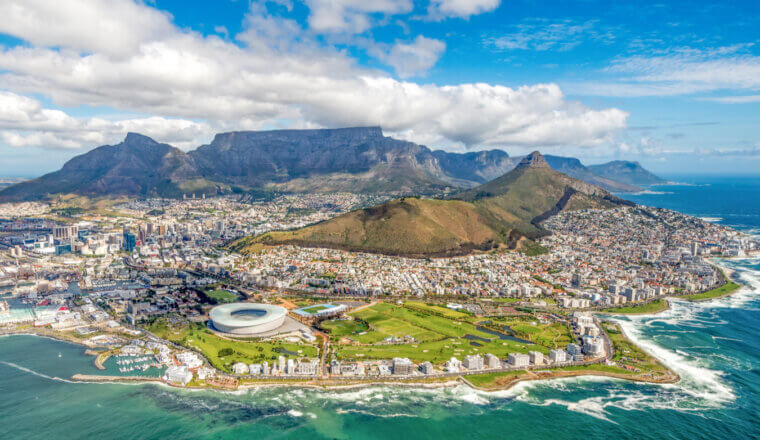
How to Save Money When You Visit Cape Town
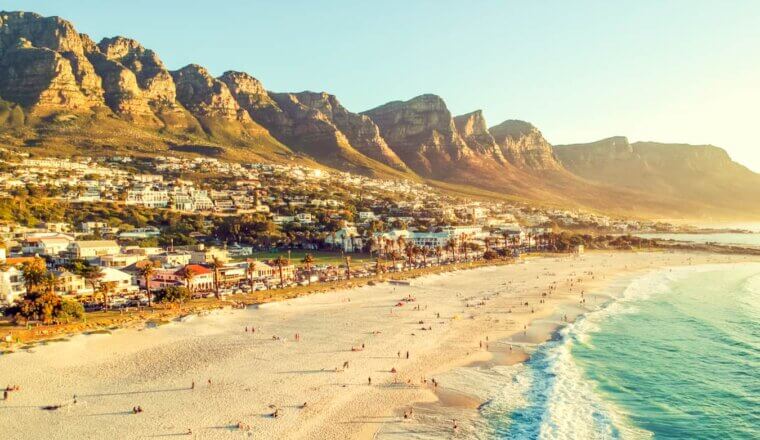
The 5 Best Hostels in Cape Town
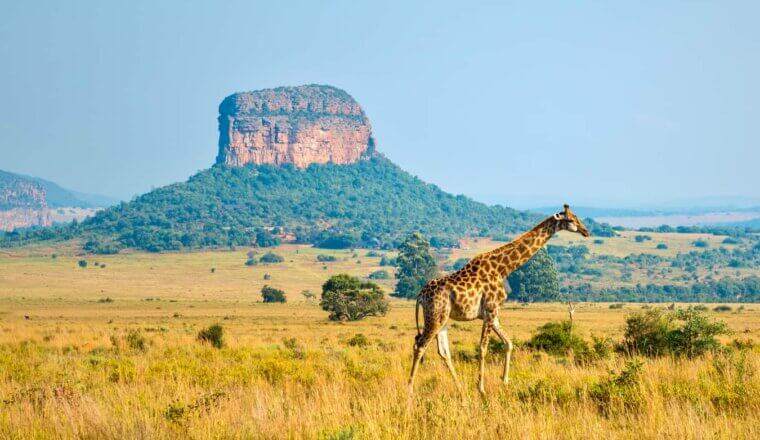
The 12 Best Things to Do in South Africa
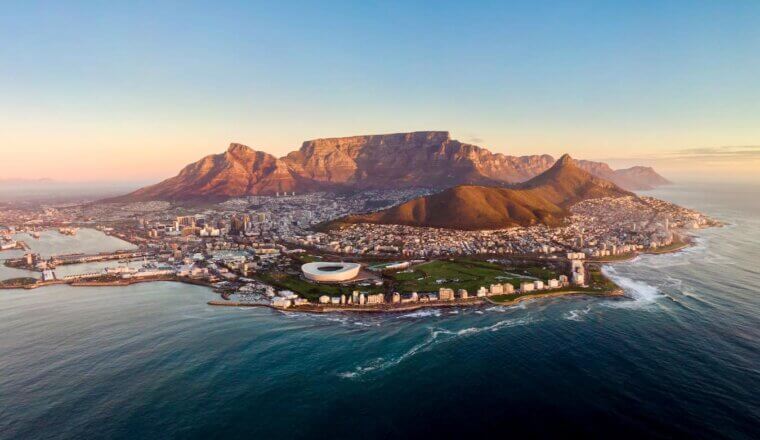
Cape Town Itinerary: What to See and Do in 4 (or More) Days
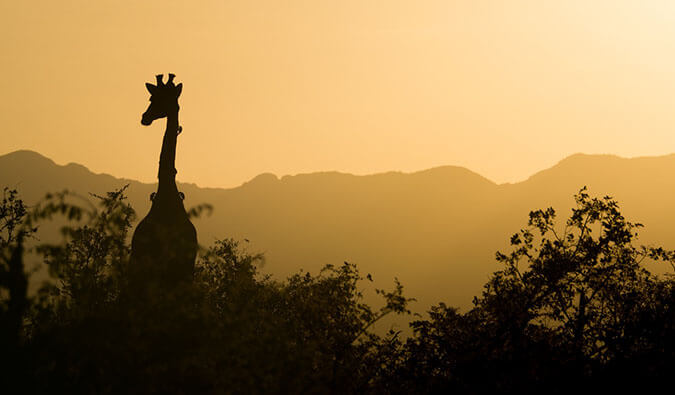
Six of the Greatest Safaris in Africa
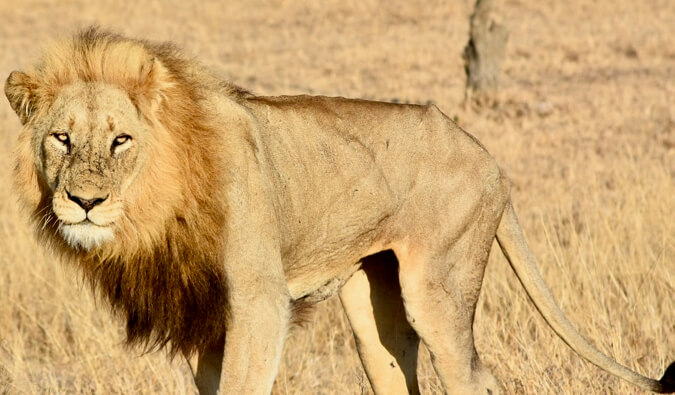
24 Photos from My Safari to Kruger National Park
Get my best stuff sent straight to you, pin it on pinterest.
- Where To Stay
- Transportation
- Booking Resources
- Related Blogs
- South Africa
- 10 Things To Know Before...
10 Things to Know Before Visiting South Africa

Avoid unpleasant surprises when visiting South Africa for the first time by planning ahead and knowing what to expect. Here’s a quick guide with all the basic need-to-knows.
Language shouldn’t be an issue if you can speak english.
South Africa boasts an incredible eleven official languages , of which English is one. Most South Africans speak English, even if as a second language, so tourists don’t have much trouble communicating. If you do decide to learn a few basic terms in local languages, ensure you also research which languages are spoken in which parts of the country, as not everyone speaks all eleven.
South Africa is a very large country
South Africa is approximately twice the size of France, so don’t expect to see it all in a week. Plan your trip by deciding which cities, towns and areas you’d like to visit. Most tourists opt for the bigger cities, like Cape Town , Johannesburg and Durban , but there’s much more to see than just the main attractions.
Big cities have many similarities to Western countries
Many tourists are surprised when arriving in South Africa that it’s very similar to Western countries. The standard of retail shops and restaurants is right up there with the rest of the world. So, if you happen to forget any essentials, from electronics to clothes, you’ll be able to easily pick it up in South Africa.
South Africa is great for traveling on a budget
The monetary unit is the South African Rand and everything, including food and alcohol, is well-priced compared to Western countries. Accommodation is also affordable, whether you opt for a hotel-stay, a guest house or self-catering unit.

The food is diverse and cheap
The country boasts amazing restaurants, from fine dining to casual eateries and markets – South Africa is a foodie’s dream come true. Whether you’d like to try traditional dishes like “smileys” or “walkie talkies”, chow down on a world-class steak or discover delicious vegetarian cuisine, South Africa has it all and more.
You might need a visa
The South African Department of Home Affairs website provides detailed information on which nationalities need visas to travel to South Africa, as well as how to obtain it. Luckily for Europeans, Canadians, Australians, New Zealanders and Americans, they can visit the country for 90 days without the hassle.

Don’t be careless with your belongings
South Africa is very tourist-friendly, but just as in most countries topping traveller’s lists, pickpockets and scammers are not uncommon. Don’t flaunt expensive jewellery or electronics and lock valuables like passports away in your accommodation’s safe.
Renting a car is the best way to see it all
Public transport in South Africa can’t be compared to that of developed countries. Taxis aren’t readily available and the country doesn’t make use of a metro system. There is however the Gautrain in Johannesburg and Pretoria, and Uber operates in all big cities. Your best bet, however, is renting a car and road tripping , just remember that South Africans drive on the left.

Drink the water in cities
The water is drinkable in all big cities but double check when visiting smaller towns, the countryside and the bushveld.
You need to go to the bush to see animals
Wild animals don’t roam free all over the country, if you want to see the Big Five you’ll have to visit the bushveld. The Kruger National Park is a favourite but there are many other fantastic reserves scattered around the country.

Since you are here, we would like to share our vision for the future of travel - and the direction Culture Trip is moving in.
Culture Trip launched in 2011 with a simple yet passionate mission: to inspire people to go beyond their boundaries and experience what makes a place, its people and its culture special and meaningful — and this is still in our DNA today. We are proud that, for more than a decade, millions like you have trusted our award-winning recommendations by people who deeply understand what makes certain places and communities so special.
Increasingly we believe the world needs more meaningful, real-life connections between curious travellers keen to explore the world in a more responsible way. That is why we have intensively curated a collection of premium small-group trips as an invitation to meet and connect with new, like-minded people for once-in-a-lifetime experiences in three categories: Culture Trips, Rail Trips and Private Trips. Our Trips are suitable for both solo travelers, couples and friends who want to explore the world together.
Culture Trips are deeply immersive 5 to 16 days itineraries, that combine authentic local experiences, exciting activities and 4-5* accommodation to look forward to at the end of each day. Our Rail Trips are our most planet-friendly itineraries that invite you to take the scenic route, relax whilst getting under the skin of a destination. Our Private Trips are fully tailored itineraries, curated by our Travel Experts specifically for you, your friends or your family.
We know that many of you worry about the environmental impact of travel and are looking for ways of expanding horizons in ways that do minimal harm - and may even bring benefits. We are committed to go as far as possible in curating our trips with care for the planet. That is why all of our trips are flightless in destination, fully carbon offset - and we have ambitious plans to be net zero in the very near future.

Guides & Tips
The best places to travel for adventure.

The Best Private Trips to Book for a Special Occasion

Top Small-Group Tours for Solo Travellers

Places to Stay
The most luxurious hotels in the world you can stay at with culture trip.

Unforgettable Trips for Exploring National Parks

The Best Luxury Trips to Take This Year

The Best Hotels in Nelspruit for Every Traveller

The Best Hotels in East London, South Africa, for Every Traveller

The Best Private Trips You Can Book With Your Friends

The Most Amazing Kayaking Experiences With Culture Trip

The Ultimate South Africa Safari Holiday

The Best Private Trips to Book for Birthdays
Culture trip spring sale, save up to $1,100 on our unique small-group trips limited spots..

- Post ID: 1672186
- Sponsored? No
- View Payload

11 Reasons Why You Should Visit South Africa
South Africa is a diverse and vibrant country with a rich tapestry of landscapes, cultures, and experiences. There are several reasons why you should visit South Africa.
With all it has to offer, it really is the perfect place to visit for almost every type of traveler. From solo travelers to families, it has something to offer everyone. My husband and I did our honeymoon in South Africa, and I’m so thrilled we did. South Africa is one of my favorite places I’ve been so I’m excited to share these reasons to visit South Africa with you.
1. The Wildlife is Incredible
Few destinations rival South Africa when it comes to opportunities to get up close to and learn about wildlife. There are so many unique and incredible opportunities for wildlife enthusiasts.
Plus, unlike some other destinations I’ve been to, it’s much more accessible. There are flights, plenty of lodging options, and more affordable places to get up close to animals. Here are a few places you can experience unique animal encounters.

Kruger National Park
One of Africa’s most famous game reserves, Kruger National Park is home to a wide variety of wildlife, including the Big Five (lion, elephant, buffalo, leopard, and rhinoceros). On our safari here, we could see all of them on the first day of the safari. It’s incredible for wildlife!
Subscribe to get my editable PDF safari packing list .

Private Game Reserves
Beyond Kruger National Park, there are numerous private game reserves and conservation areas where you can see a wide range of animals in their natural habitats. These game reserves will often also have the big five and see fewer visitors daily for a quieter experience. Here are several options through Viator .


Penguins on the Cape
Swimming with sharks.
Swimming with sharks is a thrilling and adventurous activity that attracts many adrenaline enthusiasts. South Africa is known for offering opportunities to experience shark cage diving, where you can get up close and personal with various shark species, including the formidable Great White Shark.
Shark diving hotspots in South Africa include Gansbaai, Mossel Bay, Cape Town, Port Elizabeth, and Durban. Gansbaai remains the top-rated destination for cage diving with great white sharks, and this is an adrenaline rush!
Marine Big Five
The term Marine Big Five originated in South Africa, and observing these prolific species in their natural habitat is nothing short of awe-inspiring. Although sightings are not guaranteed, there are a few destinations along the coast that will give you the best opportunity to witness and spend time with them. These include the Western Cape coastal region, Gansbaai, and the Southern Peninsula.
- Marine Big 5 Full Day Guided Return Transfer Cape Town – Gansbaai
- Whale Watching, Wine Tasting & Penguins
- Marine Big 5 Safari full day trip from Cape Town

2. Beautiful Landscapes
South Africa has a wide array of landscapes that are worth adding to your South Africa itinerary .
Table Mountain
Dominating the skyline of Cape Town, Table Mountain offers stunning views of the city and the surrounding coastline.
This is a must for anyone visiting; the views are breathtaking, and each angle offers a different coastline or city view. Not only can you enjoy it from below, but you can also hike to the top or take the Table Mountain Cableway.
Tickets are R60 – R1050 and can be combined with the Hop On Hop Off Bus Tour , so if you decide to do this as well, I recommend getting the combo ticket to save some money and enjoy both!
In addition to being home to diverse wildlife, Kruger also offers beautiful landscapes. It’s got lots of mountains and hills with gorgeous sunsets. The landscape in Kruger is very green and lush during the summer.
Panorama Route
The Panorama is a scenic drive between Johannesburg and Kruger National Park in the Mpumalanga province of South Africa. It’s renowned for its breathtaking landscapes, deep canyons, waterfalls, and panoramic viewpoints. It provides visitors with a captivating journey through the Drakensberg Escarpment, offering numerous natural wonders and attractions. Here are some key highlights of the Panorama Route:
Blyde River Canyon is a spectacular natural wonder located in the northeastern part of South Africa. It is one of the largest canyons in the world and forms part of the Drakensberg mountain range. Here are some key features and aspects of the Blyde River Canyon:
- Three Rondavels, also known as the Three Sisters. These are three round, hut-shaped rock formations that resemble traditional African dwellings. They are a popular photographic spot and provide a stunning backdrop against the canyon’s cliffs.
- Bourke’s Luck Potholes are another geological attraction near the canyon. This unique rock formation is created by the confluence of the Treur River and the Blyde River, resulting in cylindrical potholes and deep, smooth-walled pools.
- God’s Window is a viewpoint along the edge of the escarpment offering sweeping views of the Lowveld and the distant plains. On a clear day, you can see as far as Kruger National Park.
- Lisbon Falls is one of the highest waterfalls in Mpumalanga, cascading down from approximately 90 meters (295 feet). It’s a picturesque spot and an excellent place for photographs.
- Berlin Falls is another impressive waterfall along the route, surrounded by lush greenery. The falls are named after the miners from Berlin who worked in the area during the gold rush.
- Mac-Mac Falls is a pair of waterfalls with a total drop of around 65 meters (213 feet). The site is historically significant due to the gold rush era.
- Graskop Gorge Lift provides an opportunity to descend into the gorge and explore a network of walking trails and suspension bridges, offering a unique perspective of the landscape.
Drakensburg Mountains
The Drakensberg Mountains, also known as uKhahlamba in Zulu (meaning “Barrier of Spears”), are a stunning mountain range in South Africa, stretching for about 1,000 kilometers (620 miles) across the eastern part of the country.
The Drakensberg Mountains have been designated as a UNESCO World Heritage Site for their natural beauty and rich cultural significance. The uKhahlamba Drakensberg Park is a protected area that encompasses the range and is home to various plant and animal species.

3. Rich History and Heritage
South Africa has a long, rich, and important history. From early inhabitants thousands of years ago to trade during the 1600s to modern-day fights for equality and the ending of apartheid, South Africa’s history is a narrative of diverse cultures, struggles, and triumphs.
All of these different pieces of South Africa’s history make it a wonderful destination. Make sure you visit Robben Island, where Nelson Mandela was held for 18 years. Today, it is a well-visited landmark in history. Robben Island is a very popular tourist site, so it’s worth booking this well in advance if you know you want to visit.
In Johannesburg, visit Soweto and the Apartied Museum to get a better understanding of that dark period in South African history, then head for Soweto to visit both Nelson Mandela’s and Desmond Tutu’s houses.

4. Amazing Food
The flavors you’ll find in South Africa are amazing! South African cuisine reflects the country’s diverse cultural heritage, blending flavors from indigenous communities, European settlers, and influences from Asia. The result is a unique and delicious array of dishes that showcase the nation’s culinary diversity.
Below are a few of our favorite dishes:
- Braai is a South African tradition of grilling meat over an open flame. Almost any meat can be cooked this way, but our favorite was steak. Delicious!
- Bunny Chow is a uniquely South African fast food dish that originated in the Indian community. It consists of a hollowed-out loaf of bread filled with curry (often chicken or mutton) and is a popular street food.
- In the 17th century, the Dutch and French landed and settled in Cape Town, bringing slaves from Indonesia, India, and Malaysia, along with their spices and traditional cooking methods. When combined with local produce, aromatic spices such as cinnamon, saffron, turmeric, and chili.
- Fish & Chips in South Africa is a common dish that is very tasty. You’ll find that this dish is made with hake in South Africa, rather than Cod that you’ll find in England.
- Seafood is abundant in South Africa! The large variety of fish and shellfish found here include kingklip, snoek, red roman, hake, cod, sole, and tuna, to name some of the more popular ones. Other much-loved delicacies from the sea are abalone, oysters, mussels, prawns, langoustines, calamari, shrimps, and crayfish (rock lobster).

5. Incredible Wine
South Africa has a long tradition of wine-making and is renowned around the world for its wine. About an hour from Cape Town, you’ll find Stellenbosch, Franschhoek , and Paarl, which are all wonderful places to enjoy wine. We visited Franschhoek on our trip, and it was definitely a highlight of the entire trip.
A visit to the Winelands includes a guided tour around the vineyards , learning about the history and production of South African wine, and, of course, a generous amount of wine to sample. Consider using the Franschhoekine Wine Tram for some extra fun too!

6. Everyone is Friendly
South Africans are known for being friendly, and you’ll feel welcomed everywhere you go on your trip. We found kind people in every city we visited and locals were very helpful when we had questions. They know how to do hospitality in South Africa.

7. Tons of Adventure and Outdoor Activities
If you’re looking for a chance for adventure, South Africa is the perfect place to visit. There are a lot of adrenaline-pumping activities you can do while there. Whether it’s hiking in the Drakensberg Mountains, diving with sharks in Gansbaai, or surfing along the coastline, South Africa offers a plethora of outdoor activities for adventure enthusiasts.
Below are a few adventurous activities in South Africa:
- Paragliding
- Zip-lining Based at the Foot of the Table Mountain Reserve
- Shark Cage Diving
- Helicopter Flight from Cape Town
- Canyoning Trip in The Crags, South Africa
- Quad Bike Adventure Atlantis Dunes

South Africa boasts picturesque coastal areas. There are so many beautiful places along the coasts of South Africa including several incredible scenic drives.
- The Garden Route, stretching along the southern coast, offers breathtaking beaches and landscapes.
- Champans Peak Drive offers amazing views, especially during sunset.
- False Bay is home to many different cute coastal towns, great views, and beautiful beaches.
- Durban is known for its surf culture and amazing waves on the east side of South Africa.

Cities like Cape Town and Johannesburg offer a mix of modern and traditional elements with vibrant art scenes, museums, historical sites, and more. In Pretoria, you can see the beautiful Jacaranda trees that line the streets with their gorgeous purple flowers. In Durban, you can explore the beaches and arts scene. Every city has something unique to explore.
South Africa is often referred to as the “Rainbow Nation” due to its diverse population and cultures. You can experience a blend of African, European, and Asian influences in unique cities across South Africa.

10. Great Escape from the Cold During Winter (in the Northern Hemisphere)
South Africa experiences a variety of climates due to its diverse geography, which includes coastal areas, mountains, plateaus, and semi-arid regions. The country is located in the Southern Hemisphere, so its seasons are opposite to those in the Northern Hemisphere.
The weather in many popular places to visit is nice year-round. Here’s a general overview of the weather in South Africa.
Cape Town and Western Cape
Cape Town has a Mediterranean like climate with warm, dry summers (December to February) and cool, wet winters (June to August). Winter temperatures rarely drop below freezing, and summer temperatures can reach the mid-30s degrees Celsius (mid-90s degrees Fahrenheit).
Johannesburg and Gauteng Province
Johannesburg has a high-altitude subtropical climate characterized by hot summers with afternoon thunderstorms (November to March) and cool, dry winters (June to August). Summer temperatures can range from the mid-20s to mid-30s degrees Celsius (mid-70s to mid-90s degrees Fahrenheit), while winter temperatures can drop below freezing at night.
Kruger National Park and Limpopo Province
Kruger National Park and the northern regions have a subtropical climate with hot, humid summers and milder, dry winters. Summer temperatures can surpass 40 degrees Celsius (104 degrees Fahrenheit), while winter temperatures range from mild to warm.
Durban and KwaZulu-Natal
Durban has a subtropical climate with hot and humid summers (December to February) and mild, dry winters (June to August). Summer temperatures often reach the high 20s to mid-30s degrees Celsius (mid-70s to mid-90s degrees Fahrenheit).

11. Easily Accessible
There are multiple airlines that offer flights into major cities in South Africa, making it much more accessible than other countries on the continent. Plus, since there are so many airlines, prices are more competitive, so it tends to be cheaper to get to than many neighboring countries.
South Africa’s main cities are well connected by convenient flights as well. The domestic airline with the most extensive network is Airlink , which flies through 17 South African airports, along with others in southern and central Africa. FlySafair is also reliable and recommended, but it reaches less than a dozen destinations.
Uber is readily available in major cities and very affordable. Uber is a convenient, secure, and reliable service that you can count on in most parts of the country.
You can also get to other countries and places easily from South Africa. You could consider extending your trip with an adventure in Chobe National Park in Botswana, Victoria Falls in Zambia and Tanzania, or Namibia. All are accessible by a short flight.

Related posts

7 Unique Day Trips from Cape Town – By a Local

10 Days in South Africa: Itinerary for an Amazing Trip

Cape Town vs Johannesburg: A Tale of Two South African Cities for Travelers
Leave a reply cancel reply.
Your email address will not be published. Required fields are marked *
Save my name, email, and website in this browser for the next time I comment.
This site uses Akismet to reduce spam. Learn how your comment data is processed .
These are 11 great reasons. I really hope I get to visit someday. Great post – very inspiring!
It’s a great place to visit!
I’d love to visit South Africa! The landscapes look stunning and the food looks incredible! What an amazing place to explore. Thanks for the inspiration!
It is really beautiful. We loved everything about it and I’m sure you would too!
Read our Privacy Policy
© 2024 Meghan The Traveling Teacher | Design by Life in Color Designs

13 Great reasons why you should visit South Africa
by Sabine | Nov 6, 2016 | South Africa , Travel Tips | 27 comments
Located in the extreme southern part of the African continent, South Africa makes a unique tourist destination. Home to some of the most diverse landscapes, abundant wildlife and world renowned cities, these are some great reasons to visit South Africa, any visitor will be amazed by what the country has to offer. Having visited South Africa many times over the last years, I can only say that once you have discovered a part, you will want to come back for more.

This post may contain affiliate links, which means we may earn a small commission on qualifying purchases, at no extra cost to you. For further info, please see our Disclosure
Being married to a South African just opened more opportunities for me to discover the great outdoors, the lesser touristy areas and the off the beaten paths. I would say, no more excuses, here are my 13 reasons why you should visit South Africa.
Many visitors will ask themselves; where to go in South Africa, what are the best places to visit in South Africa and what are the things to see in South Africa?
So here is why we think you should visit South Africa:
Table of Contents
South Africa has abundant wildlife
South Africa is home to an abundant variety of wildlife, nearly 300 species of mammals and 850 species of birds. There is excellent game viewing all over the country in the various national parks. Going on a safari and spotting the famous Big Five animals is high on top of many people’s bucket lists. One of the reasons for visiting South Africa is going on a safari of a lifetime. Kruger National Park is the largest game park in the country. Kruger park is very easy to visit and will provide for one of the best safari in South Africa. Another very popular park that most tourists will include on a trip to South Africa is Addo Elephant Park, located close to the beautiful Garden Route.

Adventure capital of the world
South Africa is a great destination for any adrenaline junkie. There is not much that cannot be done in the country when it comes to any adrenaline indulged activity. From bungee jumping, to paragliding, abseiling, kite surfing, rafting, mountain biking, hiking, skydiving, deep sea fishing, surfing, scuba diving, even skiing…and so much more. With the great outdoors scenery and the beautiful climate, there is never a dull moment in South Africa.

To name a few important activities, at 216 metres, the Bloukrans bungee jump is recognised as the highest commercial jump in the world, the Cape Argus Cycling Tour is the worlds largest individually timed cycling race and the Comrades marathon is the world’s oldest ultra marathon race.

The Oldest Wine Industry Outside Europe
One of the places to see in South Africa are the Winelands in the Western Cape. Even though South Africa is considered as one of the new world wine countries, it’s wine history dates back some 350 years. The first grapes were pressed in 1659. Today, South Africa is the worlds 9th largest wine producer. The famous Route 62 is said to be the worlds longest wine route, with seemingly countless wine farms, vineyards and even brandy cellars. The Pinotage is South Africa’s signature grape and makes an excellent blend of wine.
When in South Africa, visit the Cape Winelands, with its sunlit vineyards and dramatic mountain ranges.
Cape Town is considered to be one of the most international cities in the world, a cosmopolitan melting pot of people, culture and food. It’s a vibrant city with lot’s of atmosphere and things to do for any visitor. Cape Town is also one of the most visited cities in Africa. Who would not like to have a look at one of the worlds natural wonders, Table Mountain? So Cape Town is definitely one of the cities to visit in South Africa as well as a very good reason to visit South Africa in general.
Read also : Interesting Facts about Cape Town

South Africa is a photographer’s paradise
With some of the most spectacular landscapes, famous South African landmarks, amazing wildlife, beautiful people and famous landmarks, South Africa is a haven for any photographer, professional and amateur. And the country boasts a lot of very Instagrammable places. Cape Town is such a city with a lot of very Instagram-worthy places to get the best shot for any Instagram account or personal photo book.
Culinary variety
South Africa is a melting pot of cultures, which of course also has an influence on the food scene. The variety in flavours, ingredients and ways of cooking is just phenomenal. One can have a spicy Indian curry, a hearty stew made in a cast iron pot over an open fire, an outdoor braai (barbecue), a sweet Malay curry, sushi, ‘pap en vleis’ and so much more. Did you know that the South African braai is an important part of the local food culture?

Great value for money
Another great reason to visit South Africa is the great value for money you will get. Any type of budget will be suitable for visitors to South Africa. There is something for every wallet, from very luxurious to highly affordable. South Africa is not reserved for a specific visitor with either lots of money or on a tight budget. From luxury indulgence in a private game resort to a budget safari in Kruger National Park, from highly priced activities to free hikes in the mountains, from luxury 7 star hotels to a dormitory bed in a backpacker hostel.
Ethnic and cultural diversity

South Africa is also known as the ‘Rainbow Nation’, meaning a nation that joins a great variety of cultures and languages, all living together as ‘One Nation’.
South Africa has a rich history, which dates back to some of the earliest human settlements, to the first inhabitants, the San, to the Bantu speaking tribes and more recent the European integration in the country. Various sites can be visited to see and experience the different stages of history. For example, the Battlefields, the Cradle of Humankind, the Bushman rock paintings, various cultural villages and places of more recent history such as Soweto and Robben Island.

Premium Game Reserves
South Africa has a great collection of wildlife and game reserves, either private or public. Each and every one of them has unique scenery, climate and landscape, with wildlife adjusted to that specific area. With nearly 1 million visitors per year, the largest and most famous wildlife park by far is Kruger National Park. Other largely visited game parks are St. Lucia Wetlands, Hluhluwe and Addo National Park. Many people will visit South Africa to see wildlife and to experience their first safari.
Apart from the national and public parks, South Africa hosts lot’s of private game reserves, each and every one being unique and special.

Whale Watching
South Africa is also one of the worlds best destinations for whale watching. Being it from a boat or even from the coastal shores, every year multiple whale species migrate from the cold waters of the Antarctica area to warmer climates en route via South African waters. You can basically see whales all along the coast. The most popular area for whale watching is Hermanus where whales are regularly spotted swimming in the bay and can be seen from the shore.
Read also : Safari in South Africa – A practical guide
Very diverse landscapes
South Africa is the worlds 3rd most biodiverse country and is the only country in the world holding its own floral kingdom. This means the country has some of the most spectacular landscapes and diverse scenery. A large part of the country is semi-desert, but there is also a very long coastal line, multiple mountain ranges, as well as plenty flower varities, forests, and savannah areas.

Family friendly travelling
South Africa is a very family friendly destination. Hygiene standards are high, hardly any medications need to be taken and the countries infrastructure is world class. Most campsites or accommodations will cater for families with children. And there are plenty of activities that are enjoyable for kids, like going on a safari and spotting wildlife, huge play parks with trampolines, as well as hiking and swimming, to name but a few. It’s a great country for a first time visit to the African continent for any family and the kids will be excited about all the great indoor and outdoor experiences they will encounter.
A 4×4 lovers paradise
The off-road and 4×4 culture in South Africa is huge. Even though the general road infrastructure is really great, there are many 4×4 trails for any off-road lover. Even some national or nature parks are best explored with a 4×4 vehicle. The famous Sani Pass between Lesotho and South Africa should only be visited with a 4×4, same for the Baviaanskloof and some routes in national parks like Mountain Zebra and Karoo NP.
Read also: Sani Pass – The road to the sky
Why do people visit South Africa?
This quote of Ernest Hemingway sums it all up: ‘I never knew of a morning in Africa when I woke up and was not happy.’
I can only confirm this.
What is the best time to visit South Africa?
South Africa is a year round travel destination and any time is fine to visit this beautiful country. The only thing to keep in mind is that the Western Cape and Cape Town have their rain season during wintertime and the rest of the country has summer rainfall. Due to the winter rains, Cape Town can be cloudy and cold during the months of July and August, but don’t let the rain put you off to visit South Africa.
Inspired? Pin this to your Pinterest boards:

27 Comments
Great travel blog we love your South African articles. We enjoy following your adventures to so many less touristy spots
I have lived in South Africa my entire life. I have travelled extensively to all continents – some multiple times – and have seen and experienced some of the best things the world has to offer.
But nothing gives me more pleasure than getting into my car with a friend or family and just travelling anywhere in South Africa. Since tourism started taking off in the 90’s the standard of accommodation and restaurants of all gradings has become hugely competitive and world class.
A lifetime is not long enough to see, explore and experience everything.
The cliche of “the world in one country” rings true, but with a touch of magic that is unique.
Born and raised in South Africa I too have travelled extensively around the country, yet every time I take another trip somewhere in SA I always discover something new. Yes, there is a whole other world out there, and I have seen a lot of it, but there is never a shortage of interesting and intriguing things right within the borders of South Africa.
I have visited Africa twice so I know how amazing the entire region is! SA is definitely on my must-visit list of places 🙂
Which countries have you visited? When you have SA planned, let us know 😉
I’ve never really thought about South Africa before as I’m not that into hot counties. It does look interesting though. The animals and scenery has my vote!
You might give it a thought, it’s a beautiful country. And South Africa is not that hot at all. It does snow there in some areas. There is even a ski resort 😉
I may have to look into it! 🙂
Great compilation of features about South Africa! I’ve not made it there yet but I hope to visit South Africa within the next few years! So much to see and explore, the wildlife itself is already very enticing!
I’ve been dying to get to South Africa for quite a while. I recently nabbed a fuel-dump fare at a ridiculously cheap price and was set to visit in August. However, the airline didn’t honor the fair and cancelled the flight. I still plan to visit, as it is so rich with culture and history. I also had no idea that it has the oldest wine history outside of Europe.
You might find another great deal with an airline to get to South Africa. And indeed about the wine, so one more reason to go sooner rather than later, to enjoy this lovely wine 😉
I would love to visit Africa someday with my boyfriend. One of the reasons is that I would like to visit all continents in the world. Aside from that, I am also thirsty to know their cultures and the people of Africa. I firmly believe that the Africans are one of the nicest people on Earth.
They really are. And I love your idea to visit every continent on this planet. You will love Africa, there are so many different countries, cultures and landscapes to enjoy!
Thanks for the tips! Now I am living in Tanzania, it’s my goal to make it down to South Africa at some point! This article will come in incredibly useful!
I heard lot about wildlife in SA. These 13 points depicts the beauty pf SA. hoping to visit in next couple of months.
South Africa has always been somewhere I’ve wanted to go and after reading this post, even more so! Everything I loved about travelling round the world this past year, seems to be available in SA. Desperately want to go on a safari, would really enjoying checking out the wine scene and who wouldn’t want to spot some whales. Thanks for sharing and happy travels.
South Africa has it all in 1 country, there is something for everyone. It’s really worthwhile visiting it and it is very affordable, which is a plus.
I love East Africa for its abundance of beautiful nature and amazing wildlife, and I know South Africa ticks those boxes too. I think what makes it all the more appealing is the extra diversity and, oh yes, the wine you refer to. Definitely want to visit here one day 🙂
East Africa has a lot of great things to visit. South Africa as well, just somehow different. I’d say, visit the country one day and you’ll see 😀
Amazing photo of the giraffes! I’d love to visit South Africa – it’s high on my list in 2017! Thanks for sharing 🙂
I was sold from the moment I saw those penguins, haha! The landscape is gorgeous, I hope I can visit soon, it looks like an amazing country.
I completely agree with all 13 points! I loved South Africa for all these reasons, but particularly the wildlife, game reserves, adventure activities, wine regions and the amazing natural beauty! I can’t wait to go back!
It’s a country that attracts you, right? Any plans in going back soon?
I’m interested in going .Is this a travel agency where people travel in a group ?
No, we are not a travel agency, The Travelling Chilli is just our personal travel blog. But if you are interested in group travel, have a look at this company: https://africatravelco.com
SA is most well known for the game reserves. The other factors are kind of eye opener to me. I am really attracted to its culture.
I didn’t need as many reasons as this – I know it has so much to offer – but you’ve made it even more tempting. I particularly love the fact that it’s family friendly and has so much natural beauty.
Submit a Comment Cancel reply
Your email address will not be published. Required fields are marked *
This site uses Akismet to reduce spam. Learn how your comment data is processed .

We're Sean and Sabine. Life partners, world nomads & food lovers. It is with The Travelling Chilli that we'd love to inspire anyone to pack their bags and to go explore the world, but particularly Africa!
For the record: Unless explicitly stated otherwise, we have in fact personally visited all the places written about.

- An introduction to South Africa
Top 10 reasons to visit South Africa

South Africa has great weather and a host of activities to choose from
South Africa is a rewarding country to sell because it offers so much for everyone. Your visitors can expect a wealth of unique sights and experiences.
- Affordability: Although there are plenty of globally award-winning five-star establishments and luxury lodges, there are also superb value-for-money budget accommodation, tours and experiences all over the country.
- Wildlife: South Africa is one of the world’s top game-viewing destinations. Choose the world-famous Kruger National Park or any of the scores of other safari destinations – one of life’s great experiences.
- Beaches: South Africa has some of the world’s finest beaches, from the popular Cape Town, Port Elizabeth and Durban ones, to many that are unspoiled and remote.
- Scenic beauty: South Africa really is many worlds in one. Expect stunning coastlines, dramatic mountainscapes, huge areas of untamed bushveld, starkly beautiful semi-deserts, lakes, waterfalls, spectacular canyons, forests and wide plains, plus Cape Town, undeniably one of the most beautiful cities in the world.
- Friendliness: Over and over again, visitors comment on the friendliness they encounter everywhere in South Africa. The people of our ‘Rainbow Nation’ are made up of many diverse cultures and will give visitors a warm welcome wherever you go
- Weather: South Africa has some of the best weather in the world – rarely too hot, rarely too cold, and the sun shines most of the time. Your clients will be able to get out and about as and when they feel like it
- Adventure activities: It’s hard to beat South Africa when it comes to the Great Outdoors and adventure activities. Whether your clients are adrenalin junkies or just want to get active, choose from bungee jumping and shark cage diving, to hiking, horse riding, whale watching, snorkelling, scuba diving, hiking and scores more adventures.
- History : Travel back in time to some of the oldest mountains on Earth; some of our early ancestors at the Cradle of Humankind; the ruins of an ancient African royal kingdom; South Africa’s oldest castle; historic battlefields where Boers, Zulus and Brits clashed and died; gold-rush towns; and iconic sites of the Freedom Struggle.
- Excellent infrastructure: South Africa has excellent major transport networks, good tourist facilities, safe drinking water nearly everywhere, a superb banking system with numerous ATMs countrywide, good accommodation for all pockets, and mouth-watering eating options
- Responsible tourism: South Africa is recognised globally for its major conservation efforts and its protected areas. It is also committed to community and conservation projects, and aims to be as ‘green’ as possible.

Become an SA Specialist
- SA Specialist: Essentials
- SA Specialist: Experiences
South African Tourism has an email address you can contact: [email protected]
© 2024 SA Specialist South African Tourism
Guide: how to navigate Press ESC or click the start SA Specialist button to close the guide
Hrmm. Looks like you're using an older browser, which means some site features may not work they way they should. For the full gadventures.com experience, we recommend upgrading to the most recent version of your browser . It's worth it! Honest!
View all tours
North America
Central america & caribbean, south america, north africa & middle east.
Few travellers make it to this icy continent, but the lucky ones who do get to explore a frozen Eden ruled by the elements and teeming with wildlife.
G Adventures Land
G adventures sailing & cruises, g adventures private travel.
Whether it’s a family retreat or a girls trip, you can surround yourself with a hand-picked crew and customize a tour that fits you all perfectly.
The Geluxe Collection
Our new line of premium active adventures is officially here. With perfectly paced itineraries, one-of-a-kind accommodations and elevated dining, this is adventure at its finest.
National Geographic Journeys
Go deeper into the cultures and habitats of the places we explore. More is included and you’ll enjoy greater hands-on exploration, interactions with local experts, and freedom to roam.
National Geographic Family Journeys
Are you an adventure-loving family in search of meaningful ways to discover the world together? These tours are specially designed for travellers seven and up and their inquisitive families.
Jane Goodall Collection
Step deeper into the animal kingdom while respecting all of its inhabitants. Our incredible collection of wildlife-focused tours is endorsed by the world-renowned ethologist.
Roamies by Hostelworld
The thrill of adventure. The awesomeness of hostels. Get ‘em both on these immersive small group trips for 18 to 35-year-old travellers.
Why choose us
As the leader in small group travel for 30 years, we know how to do it right: flexible itineraries, freedom to roam, safety, peace of mind, and locally based guides.
Change the world just by having the time of your life. When you travel with us, you become a force for good by acting responsibly and creating positive impact.
Together with our non-profit partner, Planeterra, we ensure local communities touched by our tours benefit from our visits in as many ways possible.
Trees for Days
Leave your destination even greener than you found it! For every day on tour, we’ll plant a tree in your honour and ensure that our forests get to live their best lives.
Travel resources
Last minute deals.
Looking to have the time of your life in the next 90 days or so? You can save big if you’re ready to book now.
Loyalty discount
Back home from a G Adventures tour? Submit a quick trip evaluation to save 5% on your next tour with us.
Student discount
Got proof that you’re pursuing higher learning? Then we’ve got a travel voucher with your name on it.
All travel deals
New ways to save pop up all the time. Here’s where you’ll find every hot deal in one easy place.
10 Reasons you Should Visit South Africa
Adventure, food and wildlife like no other await you in the varied landscapes of south africa..
One of the top countries to visit in Africa, South Africa is full of adventure , history, wildlife and great food. Here are my top ten reasons you need to visit South Africa.
1. Adventure
Are you a thrill seeker or looking to spice your life up a bit? Then South Africa is the place for you . Whether you are interested in going Shark Cage Diving, Paragliding off of a mountain over a capital city or blokarting down by the beach then South Africa is definitely the place you should visit.
There are many countries where you can go on safari but there is only one Kruger National Park , one of the largest game reserves in the world. (Which also goes into Mozambique and Zimbabwe along with being in South Africa). You can either drive through the park on your own or take private tours. There are also many lodges that you can stay over night at giving you the opportunity to do many game drives and see some of the magnificent animals on safari like those in the Big Five.
3. Penguins
Not just in any country can you go to the beach and expect to see penguins but in South Africa you can. There is a colony of 3,000 penguins that live in and around Boulders Beach in Cape Town, South Africa . Also if you are so inclined you can visit SANCCOB a sea bird rehabilitation centre with the majority of its residents being penguins and you can arrange for a private behind the scenes tour. You might get a chance to pet Rocky the resident rock hopper penguin and you can even adopt a penguin! You aren’t allowed to take it home though sadly.
4. The Blue Train
One of the most luxurious trains in the world, you can take a 27 hour train ride from Pretoria to Cape Town or in the other direction. The rooms vary from having two single beds to a full bed and some even have full sized bathtubs while others include standing showers. Each section of the train has its own butler, there is a turn down service, the appointment only gift shop sells diamonds and there is a cigar lounge with of course an open bar.
South Africa is famous for its wines with the majority of the vineyards being located just outside of Cape Town. There are many vineyards and wineries that you can visit for lunch, enjoy tasting menus, take tours and of course purchase some fabulous wines.
6. Language
There are no language barriers in South Africa as almost everyone speaks English and the country as a whole has 11 official languages. You might actually be surprised to find out that not only does everyone speak English but many are bi-lingual, tri-lingual or can speak even more languages.
If you like learning about history then this country has a story that you would be amazed to learn about. South Africa has a large tumultuous history and is one that people should learn about and understand if visiting. In Johannesburg you can visit the Apartheid Museum, Liliesleaf Museum and the country’s Constitutional Court to educate yourself on its past.
8. Johannesburg
Johannesburg is the largest city in South Africa and the largest city in the world not located by a river, ocean or lake. A neat fact about this city is that it also has 10 million trees (more trees than people) and is home to the biggest man made forest in the world. Known for great food and shopping it is also home to the continents biggest airport and is where many people begin their trips in South Africa.
South African cuisine has a lot of outside influences like from Europe and Asia from colonialism times. They have some of the tastiest meats in the world and venture outside of the typical beef and pork. Ostrich is found on many menus as is springbok and if you are lucky you might even get to enjoy Kudu. They enjoy a good BBQ aka braii and one of the meats I liked most was biltong, which is similar to beef jerky. South Africa is also big on beer production with their SAB World of Beer tour in Johannesburg said to be the top tourist attraction in the country.
10. Cape Town
One of three capital cities in South Africa, this seaside city is beautiful and picturesque with a great backdrop of the famous Table Mountain National Park. South Africa’s top tourist destination has lots of beautiful coast lines and beaches near by, many whale watching tours, amazing scenery, and it has a walkable waterfront area with tons of great restaurants and shopping and more.
Have I convinced you to visit yet? Was there anything I missed? Please add it to the comments below.
Getting There
G Adventures runs a number of departures in South Africa encompassing a wide range of departure dates and activities to cater to different tastes. We’re thrilled at the prospect of showing you this big blue planet of ours — check out our small group trips here .

Read more from
Capturing patagonia: an analog film adventure, by haramar kandola.
Steeple-like peaks, turquoise lagoons, contemplative moments at camp — our very own Haramar Kandola shares analog snaps from Torres del Paine

5 ways solo travel helps you meet new people
By g adventures.
See how small group tours like National Geographic Journeys with G Adventures help spark lasting connections

6 best places to propose for a unique engagement
By jessica moy.
From glowworm caves to snow monkey parks, discover our best destinations to pop the question

Going solo: how to travel the world on your own
See how small group tours pave the way for incredible solo adventures (especially for women!)

Mexican street food: a beginner's guide
By richard kitzinger.
One frequent (but first-time Mexico) traveller takes a crash course to prep for a Classic Mexico Adventure
Delete post?
Note: If you only want to remove this post from public view, you can choose to unpublish it instead.
Weather & Climate
Places to Visit
Driving in South Africa
Safety in South Africa
How to Spend 10 Days in South Africa
Foods to Try in South Africa
Drinks to Try in South Africa
Best Restaurants in Johannesburg
Best Restaurants in Cape Town
Things to Do in South Africa
Things to Do With Kids
Best Beaches
Best Surfing
Best Dive Destinations
Best Golf Resorts
Kruger National Park
48 Hours in Johannesburg
Things to Do
Apartheid Museum
Airport Guide
Table Mountain
Game Reserves Near Cape Town
Best Time to Visit
The Best Time to Visit South Africa
:max_bytes(150000):strip_icc():format(webp)/DSC00412-5b73daf7c9e77c0057ca2198.jpg)
Subman/Getty Images
South Africa is the ultimate year-round destination. No matter when you decide to travel, there's always something amazing going on—from whale migrations and prime game-viewing in winter; to blissful sunshine and Christmas festivities in summer. For generally good weather for whatever you want to do, the best time to visit South Africa is May through October, during the southern hemisphere's winter. Days are still clear and warm, with colder nights.
Weather in South Africa
South Africa is a vast country, with a mix of desert, tropical coastlines, temperate woodlands, and snow-capped mountains. Because of this, climates can vary.
Unlike many other African countries, South Africa does have four distinct seasons. May through September is typically the drier season, covering winter and a shorter spring season, and making it ideal for game drives and other outdoor activities. October through April is the wet season, encompassing fall and summer. This is an excellent season for bird-watching, and even then, rains are often quick showers that are unlikely to affect your trip. December through February are very hot (the equivalent of summer for the Northern Hemisphere) and can be crowded since schools are on holiday.
In general, high temperatures range from around 80 degrees Fahrenheit in the summer to 60 degrees Fahrenheit in the winter.
The Best Time to Go on Safari
The best time to go on safari is during the dry season . For most of the country, this means traveling during the southern hemisphere winter (May to October), when the weather is typified by clear, warm days and chilly nights. At this time of year, there is less foliage on the trees, making it easier to spot animals in the bush. The lack of available water draws wildlife to dams and waterholes, which is where you'll get some of your best sightings. Dry weather also means better road conditions for self-drive safaris at parks like Addo and Mkhuze , while the chill keeps mosquitoes at bay (a major plus for safaris in malarial areas of South Africa).
Game reserves near Cape Town are the exception to this rule. In the southernmost part of the country, summers are the driest time of year. Therefore, it's best to travel between November and March for the best safari sightings. Be aware, though, that this time of year coincides with the busiest period for tourism in South Africa and you'll need to book accommodations and game drives in advance. For keen birders, the rules are reversed. The rainy season brings an influx of insects and fills up the rivers and lakes, attracting a host of migratory birds from Europe and Asia.
The Best Time to Visit Cape Town
Cape Town is undoubtedly a year-round destination, with each season bringing its fair share of unique benefits. But, if you want to make the most of the region's incredible scenery, the most reliable weather occurs during the hot, dry summer months (November to February). Take the opportunity afforded by endless sunny days to browse the city's outdoor markets, hike up Table Mountain , or catch a tan on one of the spectacular beaches of the Cape Peninsula.
The Best Time to Visit the Drakensberg
For keen hikers, the Drakensberg Mountains are one of South Africa's top attractions. Weather-wise, the optimum time for hiking is during the fall (April to May), when you can expect warm, dry days and cool nights. At this time of year, the scenery is also mainly green and beautiful in the wake of the summer rains. Temperatures drop dramatically during the winter, with many of the higher trails coated in ice and snow. In summer, heavy rains are frequent in the north of the country (although the range's many waterfalls are at their most spectacular).
The Best Time to Head to the Coast
South Africa's twin coastlines extend for more than 1,700 miles (2,500 kilometers) and offer an unlimited array of activities. The best time to visit depends mostly on what you want to do. If sunbathing is your top priority, then summer (November to January) is undoubtedly the hottest time of year. Be warned though: If you're headed north to KwaZulu-Natal or Zululand, summer also means frequent thunderstorms and high humidity.
Whale-watching is also best in winter and spring. From June to October, humpbacks and southern right whales can be seen passing close to shore on their annual migration to the breeding grounds off Mozambique . If you're coming to South Africa to scuba dive, there is no "off" season, just different seasons. Shark-diving mecca Aliwal Shoal offers baited shark dives all year round, but if you want to swim alongside a tiger shark, you'll need to time your trip to coincide with the influx of warm water from December to April. However, June to August is Sardine Run season, offering the opportunity to witness one of the underwater world's most significant natural events. Rock and surf fishermen can also experience world-class fishing on the Transkei coast during the annual Sardine Run.
The Best Time For Wildflower Blooms
Every year, the arrival of spring sparks the start of an incredible natural phenomenon in the Northern Cape. Almost overnight, the province's arid desert landscapes are transformed into a rich tapestry of color by the simultaneous blooming of thousands of wildflowers. Creating a sea of orange, pink, purple, yellow, and white, the super bloom includes over 3,500 different species , of which almost a third are endemic. Timings are difficult to get right because the rains dictate the bloom. However, it usually starts in the far north in late July or early August, moving slowly south until it fades in September.
Spring is when the peak wildflower bloom and whale migrations take place. It's also the ideal time to visit Durban, in the north, where the climate can be muggy at other times of the years.
Events to check out:
- Hopefield Fynbos Show takes place every August and September, celebrating this dramatic flower with food stalls, tractor races, and more.
- During the first half of September, more than 10,000 Zulu maidens in traditional dress head toward Zulu king’s KwaNyokeni Palace in KwaZulu-Natal Province as part of a four-day procession .
- Johannesburg hosts the 10-day Arts Alive Festival every September. Performances include stage dance, concerts, and more, performed by both local and international talents.
If you're traveling on a budget, avoid the rush of high summer, when accommodation and activities are at their most expensive across the much of the country.
- The Swartland Heritage Festival takes place in November, celebrating more than 20 different wine producers and food from the region.
- The new year kicks off with a bang thanks to the Cape Town Minstrel Carnival, or the "Kaapse Klopse" in Afrikaans. Held on January 1 and continuing through the first week of the year, costumed minstrels parade through the streets of Cape Town, playing traditional jazz and music.
The Winelands of Franschhoek, Paarl, and Stellenbosch are extraordinarily beautiful in fall when the weather is cooler, and the trees start to change color, and the season is also optimal for hiking throughout the country.
- The Cape Town International Jazz Festival , southern Africa's biggest jazz festival, is held each March or April.
- AfrikaBurn is a unique event not unlike Burning Man in the U.S. Held in late April, the incredible week-long event takes place in Ceres, near the Tankwa Karoo National Park.
If you're interested in discovering South Africa's best surf spots , winter brings big swells and consequently, the best waves. This is also the ideal season to head out on safari.
- August 9 is a country-wide celebration for Women's Day.
- The National Arts Festival takes place in July in Grahamstown. The 11-day-long festival includes theatrical dramas, opera, street entertainers, and visual art.
- If you love oysters, don't miss the Knysna Oyster Festival, held every July in Knysna. Events include shucking contests, eating challenges, and even a marathon.
The best time to visit South Africa is May through October, during the southern hemisphere's winter. At this time of year, the days are clear and warm and the nights are cool.
During the dry season (May through October), South Africa's wild game is most active, making this an exceptional time for a safari. In Kruger, Madikwe, Pilanesberg, and KwaZulu-Nata, animals hang out around water sources and are easier to spot due to the thin vegetation.
The World Health Organization, as well as the National Travel Health Network and Centre, recommend getting the following vaccinations before traveling to South Africa: hepatitis A, hepatitis B, typhoid, cholera, yellow fever, rabies, and tetanus.
Weather Spark. "Average Weather in Cape Town, South Africa, Year Round." Retrieved February 24, 2021.
Ikeda, Takayoshi et al. Scientific reports vol. 7,1 2458. “Seasonally lagged effects of climatic factors on malaria incidence in South Africa.” 29 May. 2017.
National Geographic. "South African Coast Article, Marine Biodiversity Information." Retrieved February 24, 2021.
The Most Romantic Places to Vacation in July and August
The Best Time to Visit Johannesburg
Weather in Cape Town: Climate, Seasons, and Average Monthly Temperature
South Africa Guide: Planning Your Trip
The Best Time to Visit Boston
The Best Time to Visit Kruger National Park
Weather in South Africa: Climate, Seasons, and Average Monthly Temperature
The Best Time to Visit the Great Barrier Reef
18 Best Places to Visit in South Africa
The Best Time to Visit Spain
7 of the Best Dive Destinations in South Africa
The Best Time to Visit Morocco
A Brief Overview of Africa's Dry and Rainy Seasons
Serengeti National Park, Tanzania: The Complete Guide
18 Top Things to Do in South Africa’s KwaZulu-Natal Province

- South Korea
- Indonesia (Bali)
- Central Asia
- African Safari
- South Africa
- Itinerary Ideas
- How to Plan a Trip to South Africa — 6 Easy Steps
A land of wonders and natural beauty, South Africa is a dream destination for adventure seekers, culture enthusiasts, and nature lovers alike.
However, planning a trip to South Africa can be overwhelming due to its vast size and numerous options , especially for families. Choosing the wrong timing or an unsuitable safari experience could ruin your meticulously planned journey.
This guide provides practical tips and tailored recommendations for families and couples visiting South Africa. From family-friendly attractions to romantic getaways, we'll help you to create an itinerary that caters to everyone. Let's embark on a South African journey that fulfills your travel desires, whether you're a family or a couple.
Content Preview
- 1. Consider When to Travel
2. Choose What to Do and Where to Go
3. decide how many days to stay, 4. consider your budget, 5. check out the visa policy.
- 6. Getting to and Around
1. Consider When to Travel to South Africa
South Africa offers diverse climates and landscapes, making it a year-round destination with something to offer in every season. The timing of your trip to South Africa can greatly impact the experiences and sights you encounter during your adventure.
Our experienced team has explored South Africa during different seasons, providing you with firsthand knowledge to offer you insightful and reliable recommendations.
For a remarkable safari experience, the best time to visit is from May to September. During these months, the dry season has less vegetation, making it easier to spot animals around water sources in reserves like Kruger and KwaZulu-Natal.
If you're dreaming of a beach vacation, the summer months of December to February are the perfect time to visit. With warm and sunny weather, you can bask in the sunshine and enjoy the beautiful coastal landscapes.
For those interested in whale watching, the optimal time to visit South Africa is from June to November. During this period, southern right whales migrate to the coastal regions to mate and give birth. July to September is considered the peak whale-watching season.
According to our experience, if your travel dates are flexible, the ideal time period is September to October , when the weather is still comfortable and there are fewer crowds. It is a great time to experience a combination of different regions and wildlife.
See more details on our page: The Best/Worst Times to Visit South Africa .
South Africa is enormous. The natural terrain ranges from sub-tropical forests to deserts to bushveld to wetlands, with varying climates to go with it.
It can be challenging to choose where to go. We are experts and especially excel at helping families and couples to tailor a suitable itinerary by combining their needs with the characteristics of this country. Here are the top things to do and where to do them:
1). Embark on a Safari Experience: Which Game Reserve will Suit You?
You might have heard of the famous Kruger National Park. However, if you want to have comfortable or luxurious accommodation, or are traveling with children, Kruger may not be the best choice for you .
With such a range of choices of the safari destination, which one to go? Everything depends on your own preference.
Do you want to have a luxury safari? Sabi Sands Game Reserve , a stupendous reserve with wildlife drama, beauty, and high-end luxury, is the best option. Do you want to drive yourself? Kruger Park is a great choice. Do you want to find a kid-friendly safari? Choose one malaria-free national park in Eastern Cape .
Let us know your interests and requirements , and our experts will recommend the reserves that are best suited to your needs.
Insider's tip: For the best wildlife viewing experience, consider scheduling your trip between June and September. Book your safari for the morning when there are more animals out. --- Eason Wang, GH South Africa Specialist
2). Explore Cape Town
We recommend spending a few days in Cape Town, a vibrant city offering a mix of natural beauty and cultural attractions. Ascend Table Mountain for breathtaking views, visit historic Robben Island, explore the colorful Bo-Kaap neighborhood, and stroll along the lively V&A Waterfront. Don't miss the opportunity to enjoy delicious cuisine at local restaurants.
Insider's tip: If you aim to secure restaurant and hotel reservations more easily, it's advisable to avoid traveling during the busy Christmas and Easter peak seasons. --- Eason Wang, GH South Africa Specialist
3). Bask in the Sun on the Beaches
South Africa offers breathtaking beaches along its coastline. Consider visiting stunning spots like Camps Bay in Cape Town, Clifton Beaches, or the pristine shores of the Eastern Cape's Garden Route . Relax on the sandy beaches, soak up the sun, or take part in water sports and coastal activities.
4). Go Whale Watching by Land or Sea
During the whale-watching season, go to popular spots like Hermanus and False Bay near Cape Town. Observe these majestic creatures from land as they come near the shore or join a boat tour for an up-close encounter. Look out for southern right whales, humpback whales, and dolphins leaping from the waves.
Insider's tip: Joining a guided whale-watching tour can greatly enhance your experience. These tours often have experienced guides who can provide insights into the whales' behavior and ensure compliance with responsible whale-watching practices. --- Eason Wang, GH South Africa Specialist
5). Take a Road Trip Along the Garden Route
The Garden Route is renowned for its stunning landscapes, pristine beaches, and charming towns.
As you travel along the coastal stretch, you'll encounter lush forests, dramatic cliffs, pristine beaches, and panoramic views that will leave you in awe. You can enjoy activities, such as whale watching, hiking, zip-lining, and exploring the Cango Caves.
Be sure to stop at viewpoints, such as the Knysna Heads, Tsitsikamma National Park, and Wilderness, for unforgettable photo opportunities.
Insider's tips: Plan for a minimum of 5–7 days to fully enjoy the Garden Route, giving ample time for exploration and relaxation. --- Eason Wang, GH South Africa Specialist
6). Indulge in Wine Tasting in the Cape Winelands
If you are wine enthusiasts or travelers looking for a unique and immersive experience, you should not miss the Cape Winelands, just a short drive from Cape Town.
Explore historic towns, such as Stellenbosch, Franschhoek, and Paarl, known for their world-class vineyards. Take part in wine tastings, cellar tours, and indulge in gourmet cuisine complemented by exceptional wines from some of South Africa's finest estates.
Insider's tip: Booking tastings or tours for mornings or weekdays can provide a more personalized experience. Consider booking a guided tour to fully enjoy the wine tasting while gaining insights from a local guide. --- Eason Wang, GH South Africa Specialist
For first-timers, 10-14 days is ideal to see the highlights of South Africa. You could go on a safari in Kruger National Park, explore the vibrant city of Cape Town, or visit the stunning beaches of the Garden Route.
Considering a shorter visit, you're recommended to spend at least 7–8 days visiting Cape Town and Kruger National Park .
If you're interested in exploring Cape Town and the beautiful coast along the Garden Route, it is recommended to allocate 10-14 days for your trip . This will give you enough time to thoroughly enjoy these regions and all they have to offer.
However, if you want to truly experience the diverse landscapes and attractions South Africa has to offer, a three-week itinerary would be ideal . You could start in Cape Town, drive along the scenic Garden Route, continue to the renowned Kruger National Park for an unforgettable safari experience, and conclude your journey in Johannesburg.
South Africa is a great starting point to visit other places in Southern Africa. From Johannesburg, you can easily catch flights to Victoria Falls, Botswana, Zambia, Namibia, and Mozambique . Adding these destinations to your South African trip is a breeze.
You might want to contact a travel specialist to have your requirements, including the length of your vacation, designed into a fulfilling tour that's uniquely planned for you.
When it comes to expenses, South Africa offers a relatively affordable travel experience compared to the USA or Europe.
Accommodation in South Africa is generally reasonably priced , providing excellent value for money. For a truly luxurious experience, high-end resorts charge upwards of US$300 to US$400 per night. However, mid-range hotels are also available, ranging from US$150 to US$250 per night, depending on the location and season.
The biggest expense of a trip to South Africa is often the safari experience. Prices can vary greatly depending on the type of accommodation chosen, ranging from budget campsites to luxury lodges costing approximately US$1,000 per night, which offer all-inclusive packages with accommodation, meals, game drives, and other activities included.
While flight costs can be a significant portion of the overall trip expenses, it's important to note that South Africa doesn't have as many budget airline options as Europe or America. As a result, flight tickets for longer distances in the country can be relatively pricey. For example, a return flight between Cape Town and Johannesburg starts from around US$150 and goes up to US$180 on popular days.
Private tours in South Africa are highly recommended!
Private tours in South Africa may be slightly more expensive compared to some popular tourist destinations, such as Egypt or Thailand. However, they still offer overall excellent value for money and are the best choice for enjoying a trip to South Africa, especially for families and couples.
Please feel free to contact us and we will be delighted to create a customized itinerary and provide you with a personalized quote.
Citizens of the USA, most European Union countries, and Australia may enter South Africa for tourism or business purposes without a visa for stays of up to 90 days.
However, it's advisable to check the latest requirements and ensure that your passports are valid for at least 6 months beyond your intended departure date.
6. Getting To and Around South Africa
International flights.
Travelers from major U.S. cities, Europe, and Australia can easily fly into South Africa. There are numerous international flights connecting these regions to either Johannesburg or Cape Town, which are the main entry points.
Domestic and Regional Flights
Upon arrival in Johannesburg or Cape Town, you can easily access other destinations within the country through domestic or regional flights.
South Africa's domestic airline network offers frequent flights to popular tourist destinations, such as Durban, Port Elizabeth, and Kruger National Park. Regional flights can take you to neighboring countries, such as Namibia, Botswana, or Victoria Falls in Zimbabwe, expanding your exploration possibilities.
Getting Around in South Africa
When considering transportation options within South Africa, it's important to note that public transport is likely not be the most reliable or efficient choice, even in major cities like Cape Town and Johannesburg. Strikes are common and routes are limited.
To ensure a smoother travel experience, a private tour with a dedicated guide and driver is highly recommended.
Why Global Highlights (10,000+ reviews & 98.8% 5-star rating)
- Save Your Time:
- Less research, more enjoyment!
- Real-time 1V1 expert planning
- Maximize Your Flexibility:
- Personal local guide and ride
- Explore at your own pace
- Celebrate Your Journeys:
- Specially-crafted family adventures
- Celebrate milestones with style!
- 9-Day Tanzania Family Safari with Serengeti
- 12-Day Kenya Best Safari Tour with Amboseli
- 9-Day Kenya Active Family Private Safari Tour
- 12-Day Kenya and Tanzania Best Safari Tour
- How Long Should You Spend in South Africa? - Itinerary Ideas from 1-2 Weeks
- Best & Worst Times to Visit South Africa 2024/2025 for Safaris, Beaches...
- 7 Days in South Africa: The 5 Best Itineraries for First Timers, Families, and Couples
- South Africa Weather in January 2024: Travel Tips for First-Timers
- South Africa Weather in February 2024: Travel Tips for First-Timers
- South Africa Weather in March 2024: Travel Tips for First-Timers
- South Africa Weather in April 2024: Travel Tips for First-Timers
- South Africa Weather in May 2024: Travel Tips for First-Timers
- South Africa Weather in June 2024: Travel Tips for First-Timers
- South Africa Weather in July 2024: Travel Tips for First-Timers
- South Africa Weather in August 2024: Travel Tips for First-Timers
- South Africa Weather in September: Travel Tips for First-Timers
- South Africa Weather in October 2024: Travel Tips for First-Timers
- South Africa Weather in November 2024: Travel Tips for First-Timers
- South Africa Weather in December 2024: Travel Tips for First-Timers
Get Inspired with Some Popular Itineraries
More travel ideas and inspiration, sign up to our newsletter.
Be the first to receive exciting updates, exclusive promotions, and valuable travel tips from our team of experts.
Why Global Highlights
Where can we take you today.
- Southeast Asia
- Japan, South Korea
- India, Nepal, Bhutan, and Sri lanka
- Travel Agents
- Loyalty Program
- Privacy Policy
Address: Building 6, Chuangyi Business Park, 70 Qilidian Road, Guilin, Guangxi, 541004, China
When is the best time to visit South Africa in 2024?

Mar 10, 2024 • 5 min read

You'll find something exciting to do in South Africa at any time of year © pixdeluxe / Getty Images
From dynamic Cape Town and cosmopolitan Johannesburg to staggering expanses of wilderness such as the Kalahari and the Drakensberg Mountains, South Africa has a breadth of experiences that is hard to match .
The variety of the landscape , weather and festival seasons throughout the country means the best time to visit will depend on what you want to do when you get there.
In general, the climate in South Africa is warmer in the north and cooler in the south. You'll also find different weather on the coasts compared to the elevated plateau that makes up most of the country, where it tends to be drier. Usually, the Indian Ocean coast feels more tropical, while the weather on the Atlantic coast is milder, though cold fogs and hot desert winds can still roll in.
Cape Town and the Western Cape are unique in having their rainy season in the winter (June to August). In the rest of the country, the rains arrive during the southern hemisphere summer (November through March), but the deluges rarely last for long and give you the chance to photograph dramatic thunderstorms.
However, most visitors' biggest consideration is the vibrant festival calendar and the annual migrations and breeding seasons for the country's diverse wildlife populations. Here's everything you need to know about picking the best time for your South African adventure.
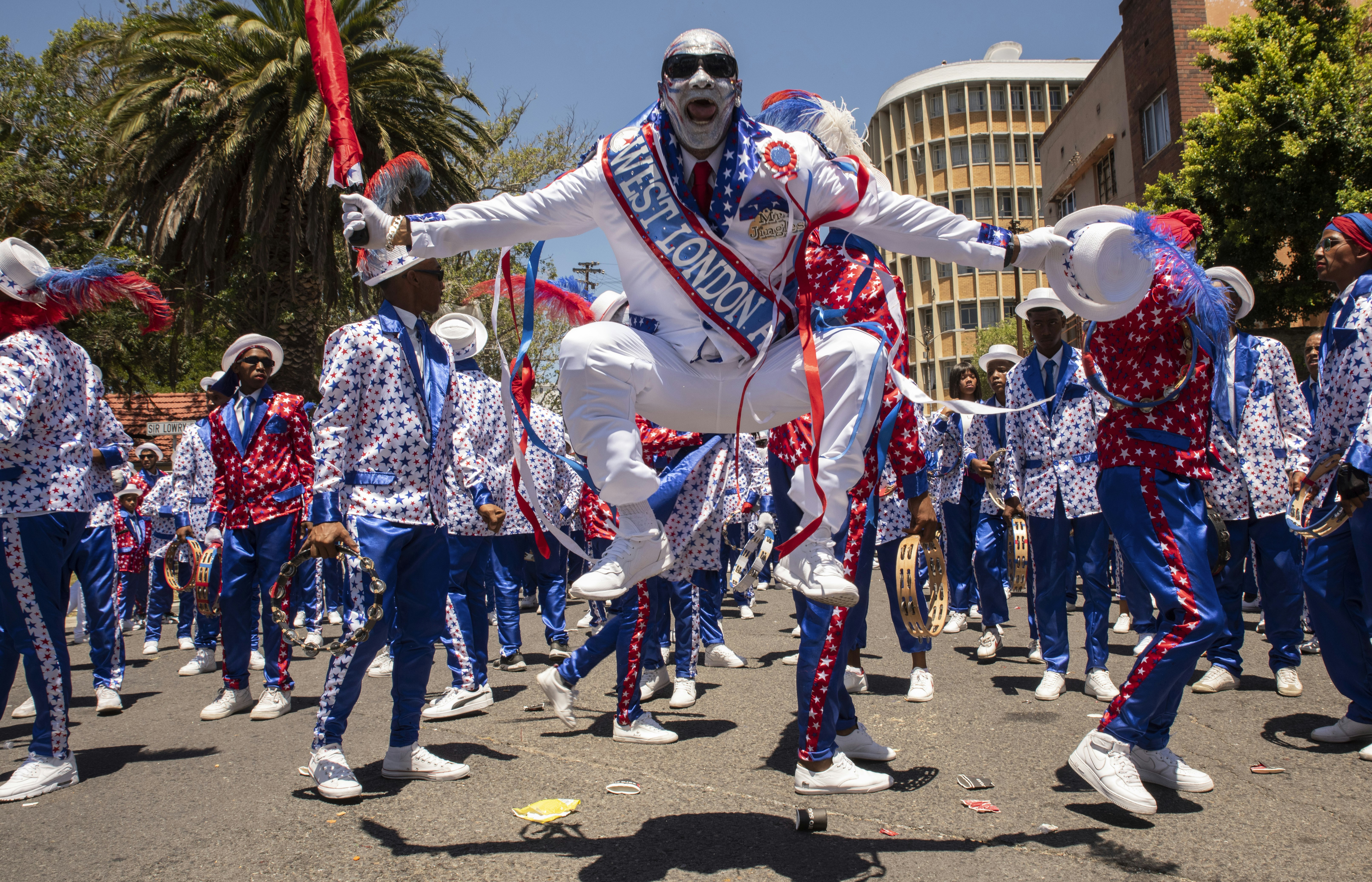
November to March is peak festival season, with peak prices
November to March is summertime in South Africa, with daytime highs reaching 32°C (90°F), often with quite a lot of humidity. If you’re looking to visit during the peak season, planning ahead is essential. Accommodations in coastal areas and national parks are often booked out months in advance, and popular vacation spots see accommodation prices rise by 50% or more.
That said, if you have the budget to travel in the high season, you can enjoy a host of festivals and events. AFROPUNK , a massive international multi-day music festival that draws artists from all over the world, kicks off in December. Held annually on January 2, the Cape Town Minstrel Carnival (known locally as Kaapse Klopse) is a high-spirited street parade dating from the mid-1800s with important links to overcoming apartheid and South Africa's long history of enslavement.
Cape Town’s Pride Festival is held in late February or early March, followed by the Cape Town Cycle Tour , which brings in cycling enthusiasts from all over the globe. March also sees the Klein Karoo Nasionale Kunstefees , one of South Africa’s largest arts festivals, held at Oudtshoorn in the Western Cape.
The Lowveld – made up of open grassland and woodland areas between 150m and 610m (492ft and 2001ft) above sea level – is steamy and warm, and the landscapes are lush and green; the Highveld, at a higher altitude, is slightly cooler. This time of year is especially good for walking and beach bumming in the Western Cape.

April, May, September and October mean lower prices and great wildlife watching
South Africa's shoulder seasons see smaller crowds and several important festivals – including April’s Splashy Fen Music Festival in Durban. The big lure in the fall (April–May) is wildlife watching, as the tail end of the dry summer weather brings wildlife out into the open. The rutting season for impala – one of South Africa’s most abundant antelopes – begins in April, with displays of dominance (like the clashing of horns) increasing as the days get shorter.
The spring months of September and October bring the best chances for cetacean encounters in whale-watching centers such as Hermanus . Wildflower season peaks in late August in the north and early September in the south, but blooms can appear from July depending on the rains, and the spectacle continues into October if it’s not too hot.
June to August is the best time for budget travelers
The South African winter from June to August brings lower prices (except for safaris) and smaller crowds. This is the rainy season in Cape Town and the Western Cape, but there’s still plenty of sunshine around. Look out for wallet-friendly winter deals at Cape Town restaurants.
Elsewhere in the country, winters are much drier, and conditions are ideal for a safari. Be prepared, though, for chilly nights and cold early morning game drives. Top winter festivals include the National Arts Festival (June) in the Eastern Cape and Knysna’s 10-day Oyster Festival in June or July.

South Africa's game reserves are best in the winter months
Rain can be an obstacle to your travels if you plan to go on safari. Northern game reserves such as Kruger National Park are driest from May to September, during the South African winter. While you might not have the lush backgrounds to your photos that you would in the spring and summer, wildlife is often easier to spot because the vegetation dies back and animals congregate around water holes.
The chilly winter nights also mean fewer mosquitoes, but you'll need to bring layers to keep warm during dawn game drives. For safaris in the Western Cape, the South African summer months are drier, but this coincides with the busy Christmas period and South Africa’s summer school holidays.
Peak whale-watching is in September and October
Though whales and dolphins can be seen year-round off South Africa’s southern and eastern coasts, September and October are the peak cetacean-spotting months. Between June and November, southern right whales and humpbacks migrate to and from Antarctica to breed and have their babies in the warmer waters off Mozambique and Madagascar. May to June also sees a massive run of sardines that attracts whales, dolphins, sharks and sea birds ( Durban is an excellent base to watch the spectacle).
While you’ll see more from a whale-watching boat, whales often come close enough to the shore to be spotted from land. This is particularly so near the town of Hermanus , celebrated by the World Wildlife Fund as one of the world's top whale-watching destinations, where whales can be seen as early as April. Gqeberha (formerly Port Elizabeth or PE) on the Eastern Cape is known as the world bottlenose dolphin capital, and pods are frequently seen between January and June.
This article was first published Mar 5, 2021 and updated Mar 10, 2024.
Explore related stories
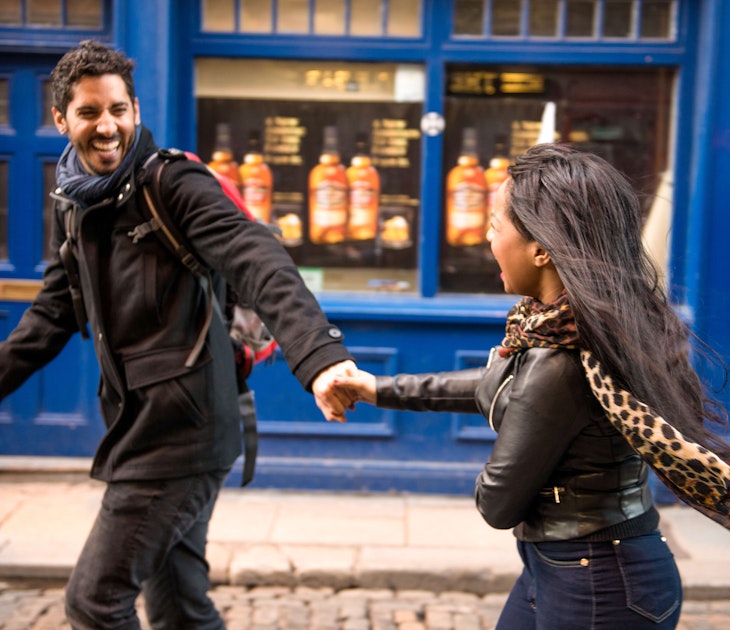
Destination Practicalities
Mar 30, 2024 • 4 min read
Who wouldn't jump at the chance to visit the Emerald Isle? Here’s how to check if you need a visa before setting off on your Irish adventure.

Mar 19, 2024 • 6 min read

Feb 27, 2024 • 6 min read
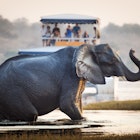
Feb 20, 2024 • 17 min read

Jan 17, 2024 • 8 min read
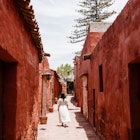
Dec 14, 2023 • 3 min read
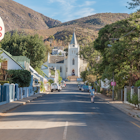
Nov 30, 2023 • 5 min read

Nov 27, 2023 • 7 min read
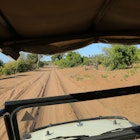
Oct 27, 2023 • 8 min read
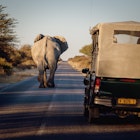
Oct 21, 2023 • 5 min read
- Meet the Team
- Work with Us
- Czech Republic
- Netherlands
- Switzerland
- Scandinavia
- Philippines
- South Korea
- New Zealand
- South Africa
- Budget Travel
- Work & Travel
- The Broke Backpacker Manifesto
- Travel Resources
- How to Travel on $10/day
Home » Africa » Travel Safety
Is South Africa Safe for Travel? (Insider Tips)
The megadiverse country that is South Africa has an abundance of wildlife roaming its national parks. Combine this with some stunning road trips, a whole load of colourful culture, some world-famous wineries and surf spots, and we have a true wonderland here!
There is, however, that old chestnut of South Africa’s reputation for crime and it is a big deal in this African nation. Not just isolated in townships or rural areas, tourists have been known to be the victim of crime even in big cities and around popular attractions.
Visiting can be a scary prospect, and for many people, this puts them off. That’s why we have created this guide to staying safe in South Africa – it’s 100% possible to visit and have an awesome time, it just takes some getting used to… and a little insider knowledge.
Our guide is filled to the brim with information about visiting the Rainbow Nation including what to watch out for and what sort of places you should avoid. We’ve even got some tips for solo female travellers in South Africa so all things considered we’d say we’ve got you covered on your trip to this cool country.

Unlock Our GREATEST Travel Secrets!
Sign up for our newsletter and get the best travel tips delivered right to your inbox.
How Safe is South Africa? (Our take)
Is south africa safe to visit (the facts.), is it safe to visit south africa right now, south africa travel insurance, 22 top safety tips for traveling to south africa, keeping your money safe in south africa, is south africa safe to travel alone, is south africa safe for solo female travellers, is south africa safe to travel for families, is it safe to drive in south africa, is uber safe in south africa, are taxis safe in south africa, is public transportation in south africa safe, is the food in south africa safe, can you drink the water in south africa, is south africa safe to live, how is healthcare in south africa, helpful afrikaan travel phrases, faq about staying safe in south africa, final thoughts on the safety of south africa.
South Africa has a lot going for it: vast wilderness, miles upon miles of coastline, great surfing, good food (and wine), as well as some great cities to visit to soak up some culture. Don’t forget that wildlife: this is a biodiverse wonderland!
However, this multicultural nation is not without its troubles; there is a high level of crime in South Africa, as well as poverty. Tourists should definitely take care when visiting the country, that’s for sure.
Much of the crime that occurs in South Africa happens in townships and isolated areas. Depending on where you’re staying in South Africa , it can be more or less dangerous. That being said, incidents involving tourists have happened in recent years in popular spots around Cape Town and other areas once considered as “safe”.
There’s a whole lot of stuff to talk about when you talk about the safety levels going on here, so let’s delve into the details of exactly how safe South Africa is…
There is no such thing as a perfect safety guide, and this article is no different. The question of “Is South Africa Safe?” will ALWAYS have a different answer depending on the parties involved. But this article is written for savvy travellers from the perspective of savvy travellers.
The information present in this safety guide was accurate at the time of writing, however, the world is a changeable place, now more than ever. Between the pandemic, ever-worsening cultural division, and a click-hungry media, it can be hard to maintain what is truth and what is sensationalism.
Here, you will find safety knowledge and advice for travelling South Africa. It won’t be down to the wire cutting edge info on the most current events, but it is layered in the expertise of veteran travellers. If you use our guide, do your own research, and practise common sense, you will have a safe trip to South Africa.
If you see any outdated information in this guide, we would really appreciate it if you could reach out in the comments below. We strive to provide the most relevant travel information on the web and always appreciate input from our readers (nicely, please!). Otherwise, thanks for your ear and stay safe!
It’s a wild world out there. But it’s pretty damn special too. 🙂
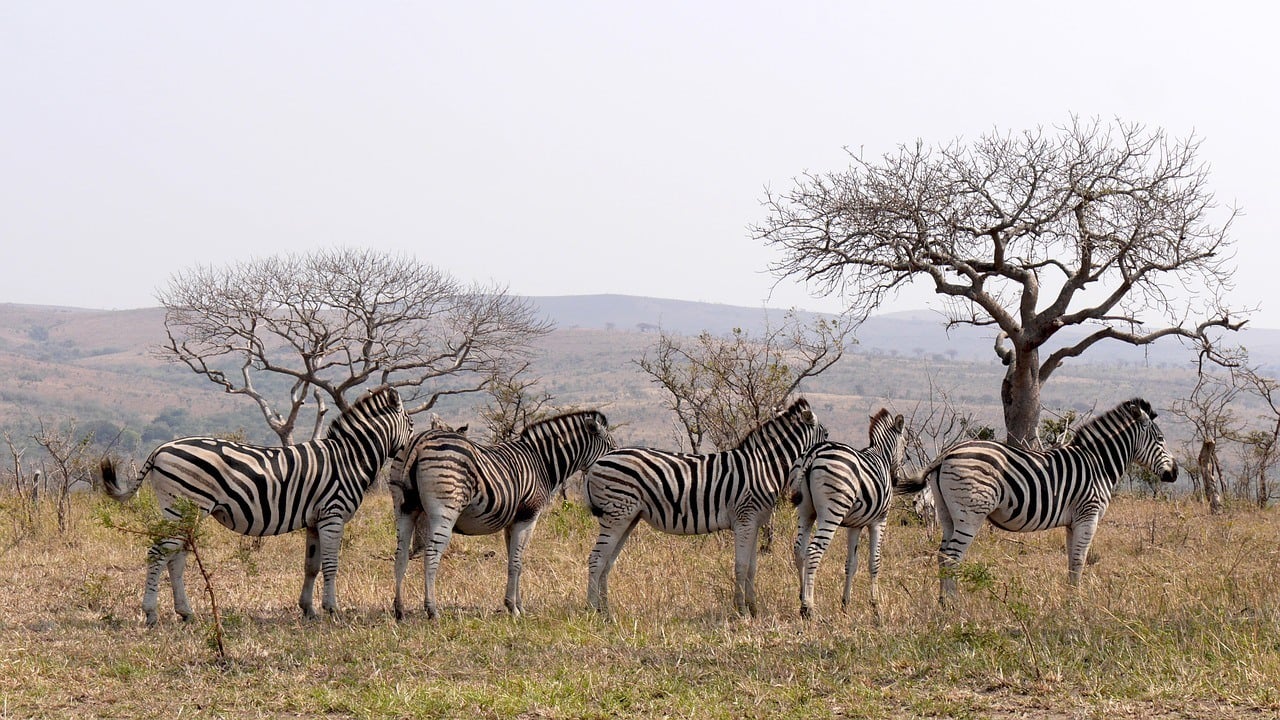
The Broke Backpacker is supported by you . Clicking through our links may earn us a small affiliate commission, and that's what allows us to keep producing free content 🙂 Learn more .
South Africa, despite the crime, brings in high levels of tourists year on year. People are drawn here to explore the country’s culture, wildlife and natural beauty.
To put that into numbers, 3.5 million people travelled through the country in 2017 alone. The travel and tourism industry supports over 10% of the jobs in the Rainbow Nation, making it a vital part of what makes South Africa tick.
Tourism, in fact, is very important, especially when you look at the high levels of unemployment and poverty, mixed with inequality. It’s certainly worth tourists’ time: South Africa has 8 UNESCO-approved attractions, for a start.
Crime, however, is also very high. That said, since 1995 the murder rate has virtually halved from 67.9 per 100,000 (1995) to 35.2 per 100,000 (2018).
This year, in 2019, an average of 605 houses each day have been burgled per day; phones, jewellery, and electronics are often the target.
When you look at the Global Peace Index for 2019 though, South Africa comes in at 127 out of 163 countries analysed. This may seem low, but consider this: the United States is at 128.
South Africa certainly has its fair share of troubles. There is a high level of crime, which can and does pose a risk to visitors; however, at main tourist destinations, crime is comparatively low.
The police in South Africa aims to protect tourists – in fact, tourist police patrol popular spots. Generally, the most violent crimes take place in townships, on the fringes of major cities, well away from your big museums and Garden Routes. That, however, doesn’t mean you shouldn’t be vigilant at all times.
Regular protests, demonstrations and strikes occur across the country. These can happen at short notice and can also become violent, with roadblocks disrupting traffic, too; needless to say, you should steer clear of these.
Nature can be a threat to your safety: we’re talking everything from beach conditions to following exactly what your guide says on safari (wild animals are wild for a reason) and protecting yourself from the heat.
ALWAYS sort out your backpacker insurance before your trip. There’s plenty to choose from in that department, but a good place to start is Safety Wing .
They offer month-to-month payments, no lock-in contracts, and require absolutely no itineraries: that’s the exact kind of insurance long-term travellers and digital nomads need.

SafetyWing is cheap, easy, and admin-free: just sign up lickety-split so you can get back to it!
Click the button below to learn more about SafetyWing’s setup or read our insider review for the full tasty scoop.
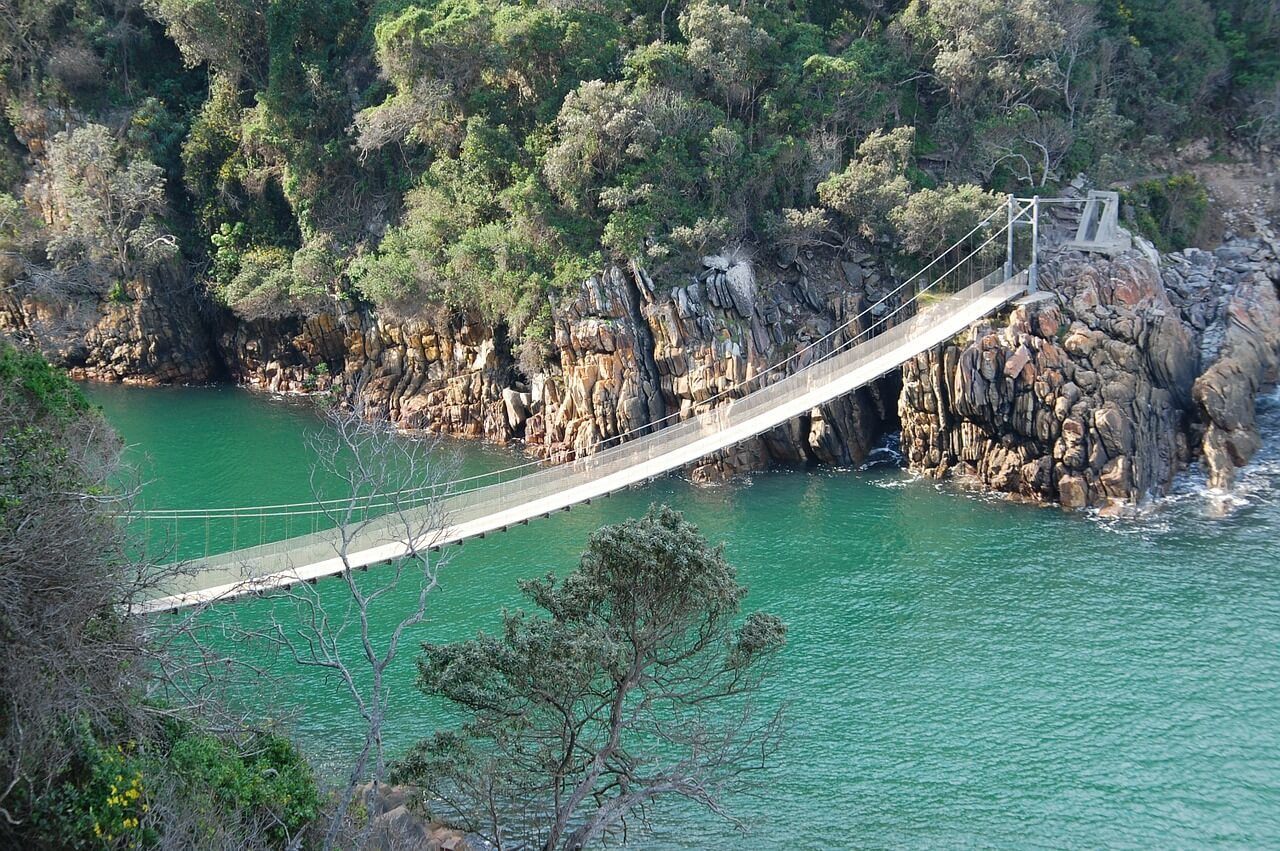
There’s a high level of crime in South Africa, but it’s best not to be paranoid. Plenty of people travel here and spend months backpacking through South Africa with no issues at all; just keep things in perspective and be aware of your surroundings. Yes, you’re going to have to be cautious, and vigilant, so here are some travel tips for South Africa to keep in mind and make sure your trip runs as smoothly as possible.
- Be very careful of your surroundings at ATMs – there are many, many scams surrounding ATMs
- Try to avoid wandering around city centres at night – there’s a higher risk of theft here
- Don’t look flashy – the richer you look, the more likely you are to be a target
- Leave valuables and travel documents in a safe place in your room – a safe, obvious as it sounds, is a good idea
- Don’t leave valuables lying around on tables – cameras, wallets: they could be gone in an instant
- Be careful of dangling handbags – opt for a money belt (more on that later)
- Consider carrying a decoy wallet – or small stash of cash to hand over if you are mugged
- Take the advice of locals – if someone says such-and-such a place is unsafe, it’s likely that it is very much unsafe
- Do not walk around looking like you’re lost – vulnerable tourists are more at risk, so try to look confident
- Be wary of your bag in airports and transit hubs – keep it close to you
- Don’t walk anywhere after dark in cities (especially by yourself) – cab, walk in a group, Uber: anything
- Pick up a local sim card – it’s worth the money to have one of these, for the data alone
- Drugs are openly used, but… – there are heavy penalties for possession, so don’t get involved
- Stick with groups and to popular trails when hiking – people have been attacked even on Table Mountain
- Be careful in quiet areas – again, there’s safety in numbers
- Avoid remote areas after dark – everything from viewpoints to picnic spots and isolated beaches, are no-go at night
- Steer clear of protests, marches, demonstrations – it’s just not good to get caught up in these
- Carry a copy of your passport – to show authorities/police if they need to see it
- Don’t buy any prohibited animal products – ivory, rhino horns, anything from endangered species; you’ll be (rightly) prosecuted if caught
- Listen to your guide on safari – getting too close to wild animals, or veering off where you should be going, can be deadly
- AIDS is an epidemic in South Africa – this is the biggest HIV epidemic in the world. Take the obvious precautions
- Research your accommodation thoroughly – make sure your room is safe, lockable, secure
South Africa, obviously, has some issues. It is better to be aware of things going on in the country than to be shocked by them; the information isn’t there to scare you off, it’s here to ensure you have as safe a trip as possible. The most important thing is to avoid being by yourself in remote or isolated areas, city or countryside, as this is when you’ll be most at risk. Other than that: be vigilant!
Losing your money whilst you’re travelling anywhere in the world isn’t fun; not only will it mean you miss out on a night or two of fun, but it could also mean not being able to pay for accommodation, or even cutting a trip short.
In South Africa, where crime levels are relatively high, you may be worried about having your money stolen – not an uncommon thing to worry about when visiting this country. The solution, however, is simple: wear a money belt.

The Pacsafe Money Belt is our best bet. It’s affordable, it looks and acts like a belt, and it’s sturdy – what more could you ask for out of a money belt!
Where many other money belts can look obvious to would-be thieves, bulging underneath clothes, it’s the simplicity of the Pacsafe Money Belt that we love: it looks just like a belt and acts like one too.
The only difference is with this belt is that there’s a hidden zipper pocket where you can stash your cash. This means that, even if you have to throw down a dummy wallet, you still walk away with a secret cache of money in this awesome little belt.
The best ideas are often the simplest, and this is definitely the case with the Pacsafe Money Belt: a solid option if you’re looking to keep your money safe in South Africa.
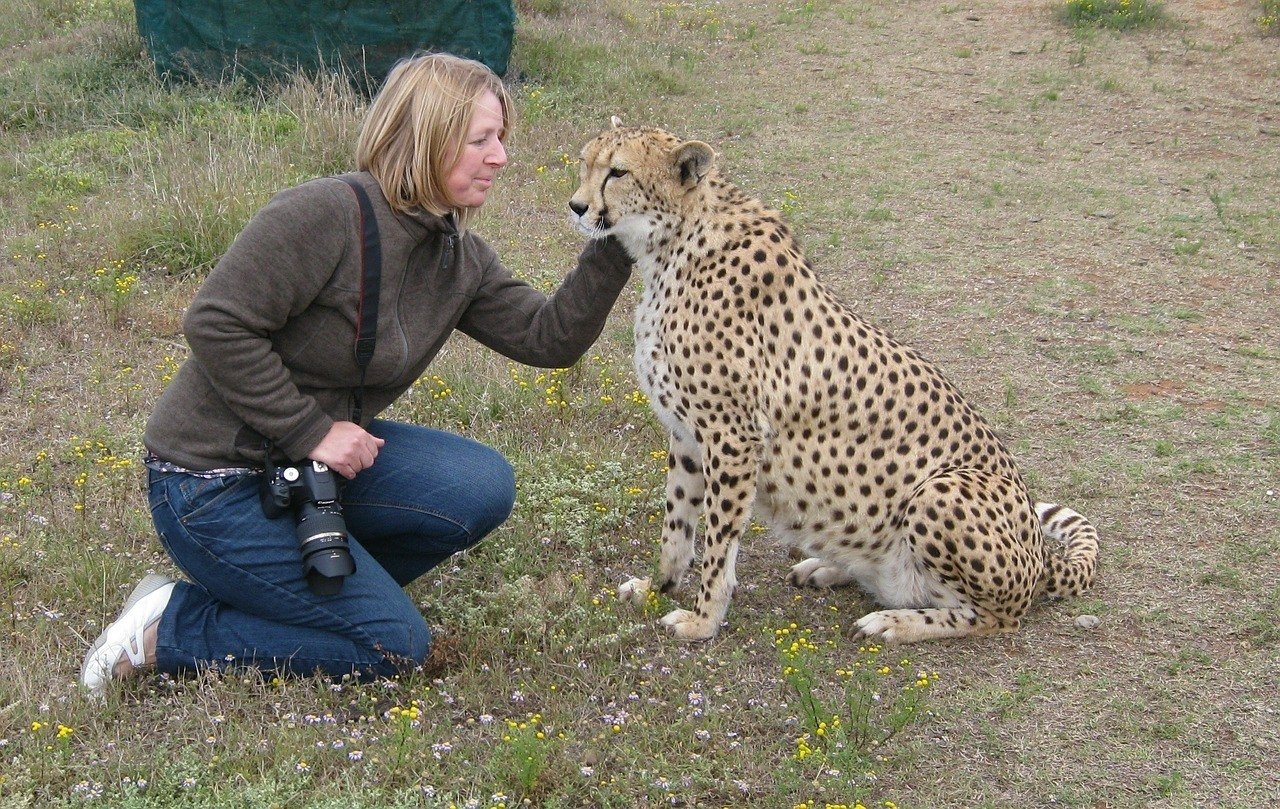
There’s nothing quite like travelling by yourself. Having only yourself to rely on, it may be challenging, but the rewards you reap from pushing yourself and doing new things far outweigh the bad parts of solo travel. It’s all about doing things for yourself – and it’s awesome.
Travelling by yourself in South Africa isn’t always the safest option, but it is a fun country to travel solo in. It’s well-trodden, it’s pretty straightforward, and lots of people do it. Here are some solo travel tips for South Africa to keep as safe as can be.
- Know when you should join a tour. Hiking by yourself, or travelling by yourself at night, is not a good idea. So, if you’ve got an overnight trip to make, or feel like getting out into the wilderness that South Africa is so famous for, then consider booking yourself onto a tour. Do your research, though, and make sure you’re with a reputable company and guide.
- Listen to locals and ask questions on where it’s safe to go, what you should be doing, and what you should be avoiding. Local people are the ones who have the vital insider knowledge that you need in this country.
- Another good local source is social media; for example, there are Facebook groups for organising group hikes and other communal meet-ups. It’s in these kind of online groups that you’ll be able to ask advice for solo travel around the country, too. Hit up the South Africa National Parks website for information on joining hiking groups for destinations such as Table Mountain.
- Try to keep a low profile: solo travellers, or just people by themselves, are more of a target for crime in South Africa than anyone in a group.
- With this in mind, try to blend in; wearing shorts and t-shirt whilst everyone else is in jeans will make you stand out like a sore thumb, so take note of what everyone around you is dressing like.
- Travel light. This is crucial if you don’t want to feel (or actually be) vulnerable when getting off buses, trains and navigating airports. The more you have, the more it’ll weigh you down, and the more conspicuous you will look as a tourist.
- Don’t party too hard. Be careful in terms of drinking too much and avoid recreational drug use; we’re saying this so that you avoid hurting yourself or being a victim of crime, which can happen more easily when you’re intoxicated.
- Keep your phone charged. All of your practical information, including maps, will be on this. Being without your phone in a part of a town that doesn’t feel all that good is something that won’t help you at all, so make sure it always has a battery. Speaking of which, make sure you always have emergency numbers stored in your phone (write them down in case your phone goes missing).
- Make sure you know where your bank cards, passports and your money is – and don’t keep them all in one place. Losing everything all at once isn’t just not fun: it can be pretty serious. Being alone means you won’t have a friend or family member to help you out with cash if you need it.
- Let people know your plans; even if they change last minute. Tell friends, family, new travel buddies, what you plan to do in the next few days because, at the end of the day, it’s better for someone to know where you are and what you’re doing than no one knows. Don’t go off-grid, is what we’re saying.
Solo travel in South Africa is not as difficult as you may think it is. This is a well-trodden, much-visited place, with plenty of other travellers to meet up with along the way.
However, there are definitely times when you’ll need to watch out for your safety a lot more than if you were travelling in a group. You’ll need to keep your wits about you, try to blend in, not look like a vulnerable tourist (i.e. a target) and keep your valuables well hidden.
Other than that, it won’t be the easiest place in the world to travel solo, but if you’re up for the challenge: enjoy!
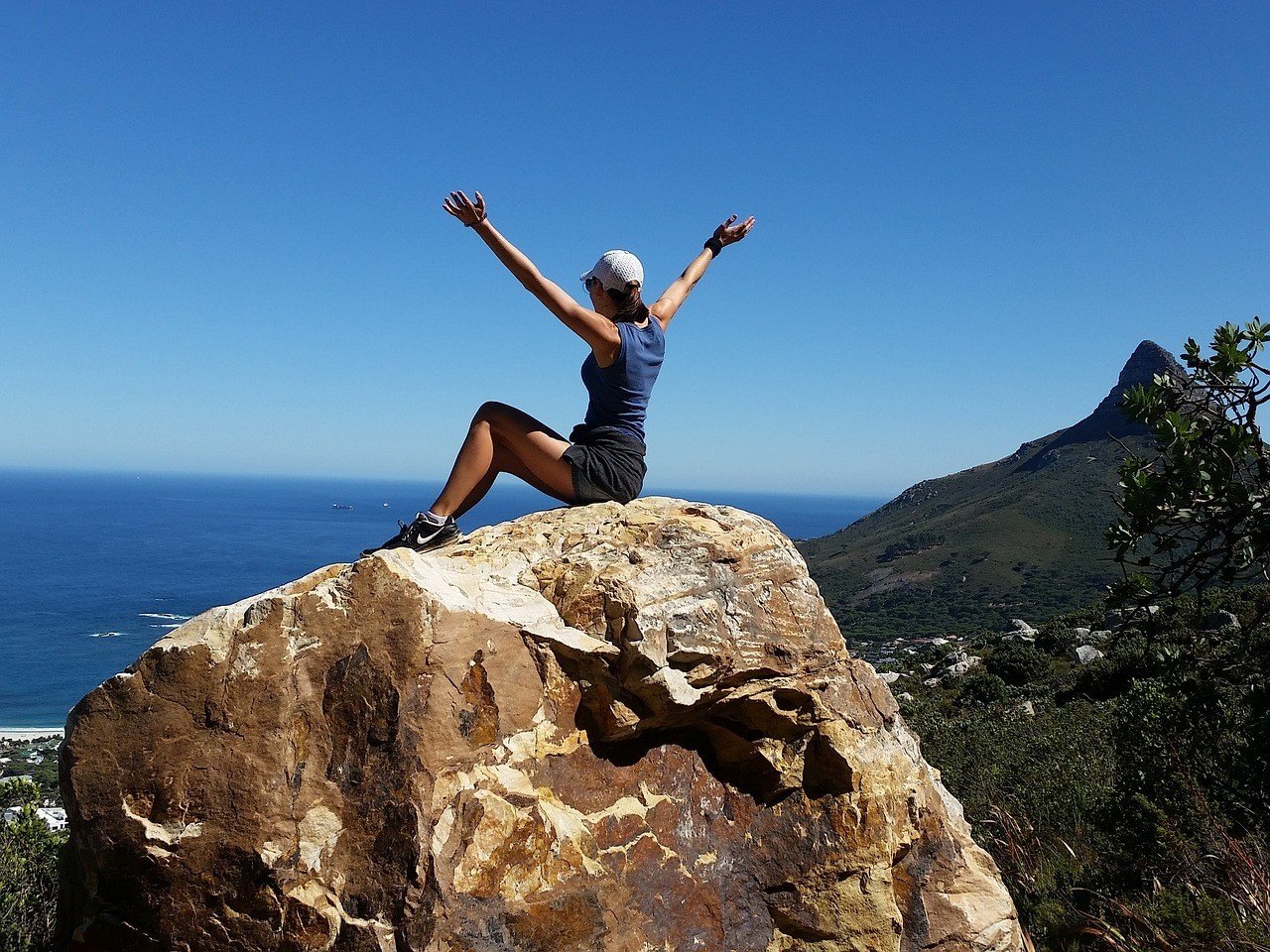
Just as South Africa isn’t 100% safe for solo male travellers, likewise it isn’t 100% safe for solo female travellers. There’s more to deal with as a woman, with old fashioned attitudes, sexist behaviour, and high levels of sexual assault and violence against women in the country.
It goes without saying that as a woman in South Africa, as a solo traveller, you’re going to have to be pretty careful; that’s not to say it’s not doable – it totally is – but exercise caution. Our tips for solo female travellers in South Africa are here to help your trip go as well as it can.
- Do not walk alone at night by yourself – especially in urban areas. This is not a good idea for any sort of traveller, but that goes doubly for females.
- Avoid situations where you are isolated and by yourself. Stay in busy places and don’t take taxis alone.
- Do not go hiking by yourself; it’s not recommended at all for a woman to do this. If you do want to go hiking, the minimum number of people in your group should be 3.
- Don’t just book the cheapest accommodation. You have to research it, read the comments, and see for yourself if it’s appropriate for solo females. If it’s more expensive but secure and well-reviewed, it will be worth the money.
- The same goes for guides. You will want to go on a tour with reputable guides; check online for reviews from other female travellers and ensure that the reviews are good.
- Be aware that there is a high level of sexual assault and violence against women in South Africa. If you’re travelling across the border to Lesotho, know that patriarchal values are strong and women are often oppressed and harassed.
- As a solo female traveller, it’s best to find other women to travel with on public transport. The risks are reduced if you’re travelling together with other people; try to find at least two other women, or a mixed group of people, to travel with.
- Make sure you carry your mobile phone with you at all times. This is obvious, but it means you’ll be able to contact people in an emergency, use maps, or simply look at the reviews of a restaurant you’re interested in.
- It’s best to dress modestly, covering up skin more than revealing it. This will help you avoid too much attention. Our South Africa packing guide details exactly what you should bring with you and what to wear during your trip.
- If you’re planning on staying in an urban area, like Johannesburg, for example, you should consider buying pepper spray or enrol in a basic self-defence class.
- Careful of your drinks (and food) when you’re out and about; spiking of food and drink does occur, so try your best not to leave them unattended.
- Don’t disclose details to strangers: whether you’re in a relationship or not, where you’re staying, what your travel plans are – people you’ve never met don’t need to know all this stuff about you.
- For insider advice, ask for tips from local women on online communities such as Facebook group Girls Love Travel; they’ll have the most up-to-date information on just how safe it is for solo female travellers in South Africa.
The prospect of visiting South Africa by yourself, as a woman, isn’t great. This is definitely a far cry from travelling solo in Thailand, so we wouldn’t recommend this as a solo destination for females who haven’t had experiences travelling in more challenging parts of the world.
There’s no real way to sugar-coat it. But we reckon the best way to do it is to stay in very well-reviewed, social hostels – hotly tipped by other female travellers, preferably – where you can meet other people to continue your travels around the country with.
Other than that, the other way to experience South Africa as safely as possible would be to join a tour, making sure (of course) to check out the reviews and that the company is reputable. Other than that, stay safe and have an amazing time!
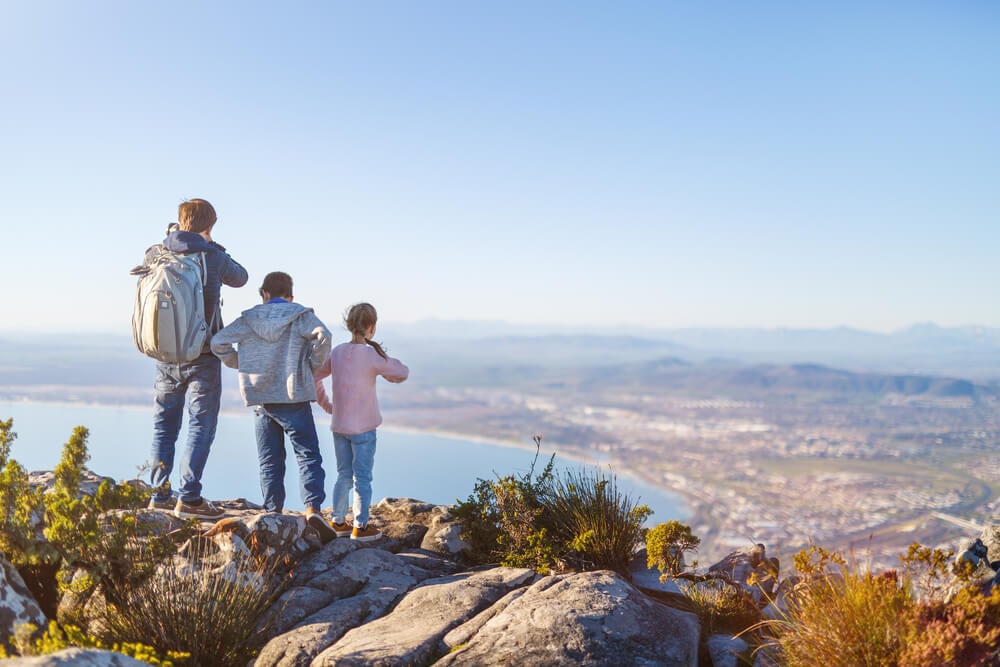
Although it might not be the normal place to go for family holidays, or even anywhere near the top of the family destinations in the world, it’s still an awesome place to go.
There is a whole plethora of national parks, an abundance of beaches, whale-watching to experience, safaris to embark on, and a handful of good museums to learn a thing or two, as well.
Places such as Cape Town offer up a top family destination. Here you will find everything from good hotels and other family-friendly experiences, to shopping centres, and easy places to eat. If you’re planning your trip to the Western Cape, you may want to check out our Cape Town safety guide!
Durban, on the other hand, has its beaches; whilst the Western Cape has the stunning Garden Route.
South African people are welcoming to children and much accommodation, and hotel rooms can cater to families. There’s even camping, cabins and beach chalets all over the country; you’ll even find places to stay in South Africa’s national parks, such as exciting wildlife lodges.
Note, however, that some wildlife lodges have a restriction on children under 12 years of age.
If you’re thinking about going on safari, these kinds of activities are best for older children; it can be very hot and the hours involved can be taxing. Kruger National Park might be a better one for smaller children, with activities geared towards little ones.
Make sure you plan your trip if you want to travel around the country and not just stay in one place: the distances can be huge and take much longer than you thought.
If you’re travelling outside of major towns, it can sometimes be difficult to find what you may consider to be simple supplies – things like nappies, baby food and milk, for example.
You should make sure that your children (and you) are up to date with vaccines needed for South Africa. Be extra careful about entering into malaria-prone areas; cover up against bites, bring mosquito nets (just in case), use repellent and burn mosquito coils where possible.
When you are travelling with children under 18 years of age, you have to show an unabridged birth certificate (or UBC) as well as their passport; you should be particularly careful if you’re just one parent travelling with a child. This is supposed to combat child trafficking.
Other than that, South Africa is going to be a blast as a family. Just make sure you keep your children close to you when you’re walking around cities and be aware of any potentially risky situations – both in cities and rural areas.
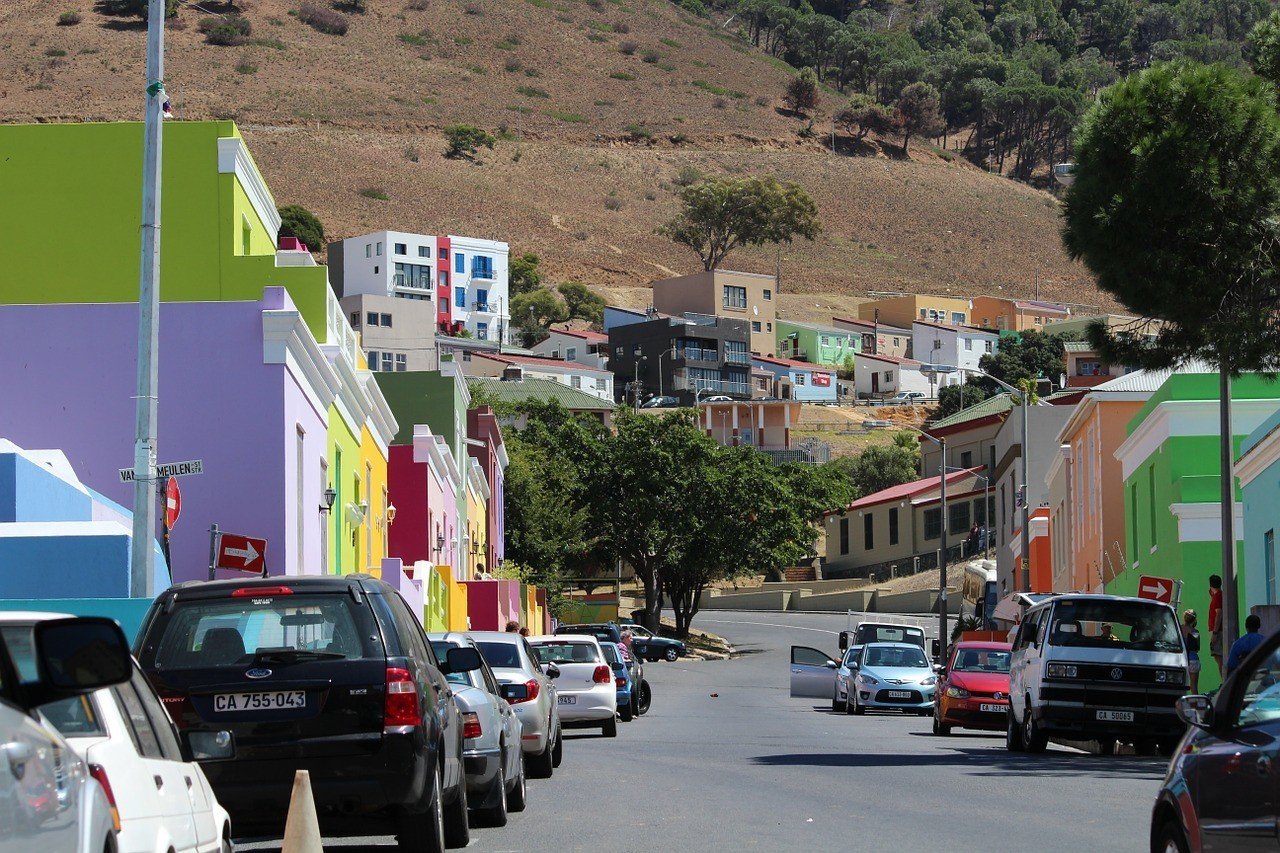
South Africa offers up some pretty amazing road trips. The Garden Route, obviously, is one of these.
Having your own wheels means you can veer off from the main tourist bus routes and see what this spectacular country has to offer… But that doesn’t mean it’s always safe to drive in South Africa.
In 2018, 12,000 people died on the roads in South Africa; it doesn’t have the best road safety records. And then there are things to worry about, from varying road standards to outright hijackings.
You should definitely pay attention to your surroundings, even when driving (not just in traffic jams). Robbery from cars is commonplace, so ensure that your windows are wound up and your doors are locked at all times.
You will be particularly vulnerable in a car: at night time, when you’re parked and ready to go/get out or stopped at traffic lights. Stick to main roads and well-lit areas after dark; thieves have many different methods to get a vehicle to stop, or pull over.
Do not, whatever you do, pick up hitchhikers and/or strangers.
On the road, you should be aware that overtaking on the hard shoulder, or on single-lane roads, is normal behaviour for other drivers, especially trucks. People often ignore rules, like giving way to the right on a roundabout, or speed limits.
Motorists often drive quite aggressively (taxi drivers are renowned for this). People overtake without enough room to pass; expect people to flash their lights, or drive right up to the back of your car, to signify they want to overtake.
Drink driving is not uncommon – don’t do it, just be aware that some people may be driving under the influence. If someone is driving extra erratically, give them all the space they need. It’s better to be safe than sorry.
Lots of highways cover the country – these are mainly in good condition. Outside of big towns, however, you can come across un-sealed roads; be especially careful driving on these after or during heavy rains as they can get washed away.
Also in rural areas be careful of hazards in the road, from children to wild animals.
Parking can be an issue, especially certain neighborhoods in Johannesburg. There are often people called “parking guards” who will look after your car for you in big towns and cities; approved parking guards often (but not always) wear high-visibility jackets. Make sure you pay them when you’re done parking and about to leave.
One important point to finish with: if someone wants to carjack you, let them. These people are usually armed and people have been killed for simply not handing over the keys. For more information check out DriveSouthAfrica.co.za.
Uber is available in South Africa. It’s been there for 5 years.
It’s popular – and there are a number of different cities it can be used in; specifically, that’s Johannesburg, Cape Town, Pretoria, Durban and Port Elizabeth.
Be aware, however, that there have been tensions between Uber drivers and metered taxi drivers – especially outside transit hubs and airports. Not just the drivers but also passengers have been harassed by the drivers of metered taxis.
Uber often reports where, if there is any trouble, this is taking place, so check the app. It’s best to be aware of this regardless.
Uber is safe in South Africa though, and the benefits apply: know your driver, read reviews, track your journey, pay in-app. What’s not to like?
Using taxis in South Africa requires some precaution.
Private taxi companies can be found in large cities and big towns, and are – generally – one of the safest ways to get around South Africa. This is especially true after dark.
You can find taxi stands in busy, popular areas, such as outside big hotels, shopping malls, and other attractions.
Rates will vary across the country and between cities, the average being about 10 Rand per kilometre.
The safest way to get a taxi, however, is to phone for one. It’s safer because you’ll be more likely to get a better quality vehicle than the ones waiting at the taxi ranks.
Ask your accommodation for the number of a reputable company. You can also ask at a restaurant, bar, or other establishments for them to call you a taxi. Always wait inside for your taxi.
Shared taxis are an option in South Africa, running all around the cities, into suburbs, and across to neighbouring towns; they’re very local, but are not for the faint-hearted. Away from big transit hubs and tourist destinations, shared taxis may be the only form of public transport that you can actually get.
These range from cars to minibuses; find information on them on TaxiMap.co.za – this will show you routes, fares and other important information.
There are some safety precautions to consider when using a shared taxi, however. The conditions of the vehicle are often not very good, the driving standards are poor, and there are frequent accidents.
Pickpocketing, as well as harassment, are not uncommon when you’re in a shared taxi. There are certain routes that shared taxis take that should definitely be avoided, especially after dark: Exploring central Cape Town , in daylight hours, is usually fine but is best avoided at night.
Travelling on shared taxis with bags and luggage not only means that you take up precious seats, but it also puts you at risk, too.
Some tips for using minibus-style shared taxis:
- When you get on, pass your money forward to the driver’s assistant (sitting to next him, usually)
- If you do have luggage, sit on the first row, behind the driver
- If you’re on the folding seat by the sliding door, it’s your job to open and shut the door each time it stops to let people on
- When you want to stop say “Thank you, driver” – not “stop”
To sum it up in a few words, taxis in South Africa are safe – for the most part. Just be sure to avoid shared taxis at night and, if in doubt, get establishments to call a taxi for you.
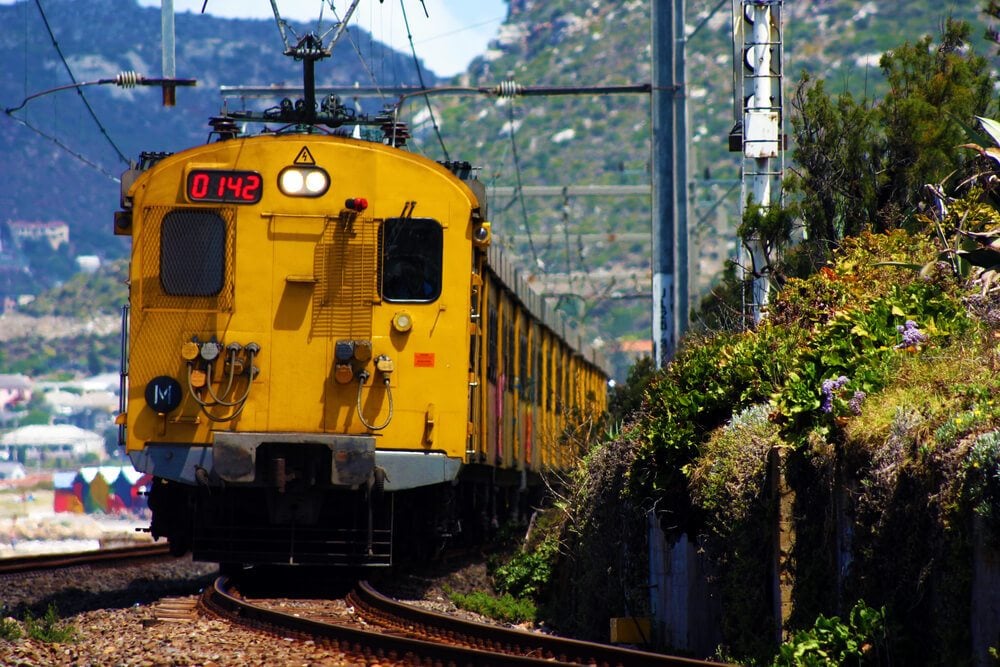
Public transport in South Africa varies, to be honest. It depends on where you want to go, what you want to do, and your budget.
First of all, there are buses.
Inside cities, such as Cape Town, Pretoria, Johannesburg, and Durban, there are city buses; these, obviously, work just like city buses in urban areas all around the world. However, for safety reasons, the best ones to use are MyCiTi (Cape Town) and the People Mover (Durban).
If you do want to use the bus, it’s a plus if you’re a budget: the routes are extensive and the fares are cheap. However, the running hours can be quite limited.
If you want to get on a bus between cities, then you have a few different options.
The major cities are linked with bus lines that vary in safety. Safety Lines, as you might be able to tell by the name, is safer (and pricier) than other companies. No matter what firm you choose to go with, however, you should always be careful if you’re heading on an overnight journey by bus and watch out for your belongings; sit as close to the driver as possible.
You can buy bus tickets up to 24 hours in advance at bus offices, supermarkets and at Computicket Travel. Computicket is actually a pretty good way to go because you can use a foreign bank card to book, and there are multiple bus companies on offer for you to choose from.
There are also backpacker shuttle buses, one of the more famous being Baz Bus. This kind of hop-on, hop-off service is often the safest and most convenient way to go, especially for solo travellers. It does the rounds at hostels, picking up and dropping off travellers; book online or through your hostel. However, these are more expensive (of course), but they can work out much more convenient.
If you don’t want to take a bus, there are always trains.
Trains in South Africa are a scenic, much more comfortable way to travel than by bus. They take a lot longer but are worth it for the views alone. There are all sorts of options, with things like dining cars and showers onboard. Obviously, this sounds pretty pricey – and it can be, in comparison.
Note: the economy class of a train is not as safe.
Book tickets for the trains up to 3 months ahead of time, both online and at train stations. Hit up The Man in Seat 61 for his well-trusted, insider tips on train travel.
Metrorail Suburban Railways, in larger cities from Cape Town to Durban, should be avoided; these have high levels of crime and it’s basically not worth it, as you won’t be needing to use them. Grab a taxi if you do need to go anywhere these trains go.
Public transport is safe in South Africa, it’s just important to be vigilant and aware of your belongings – especially if you’re on a cheaper service and/or are travelling overnight.
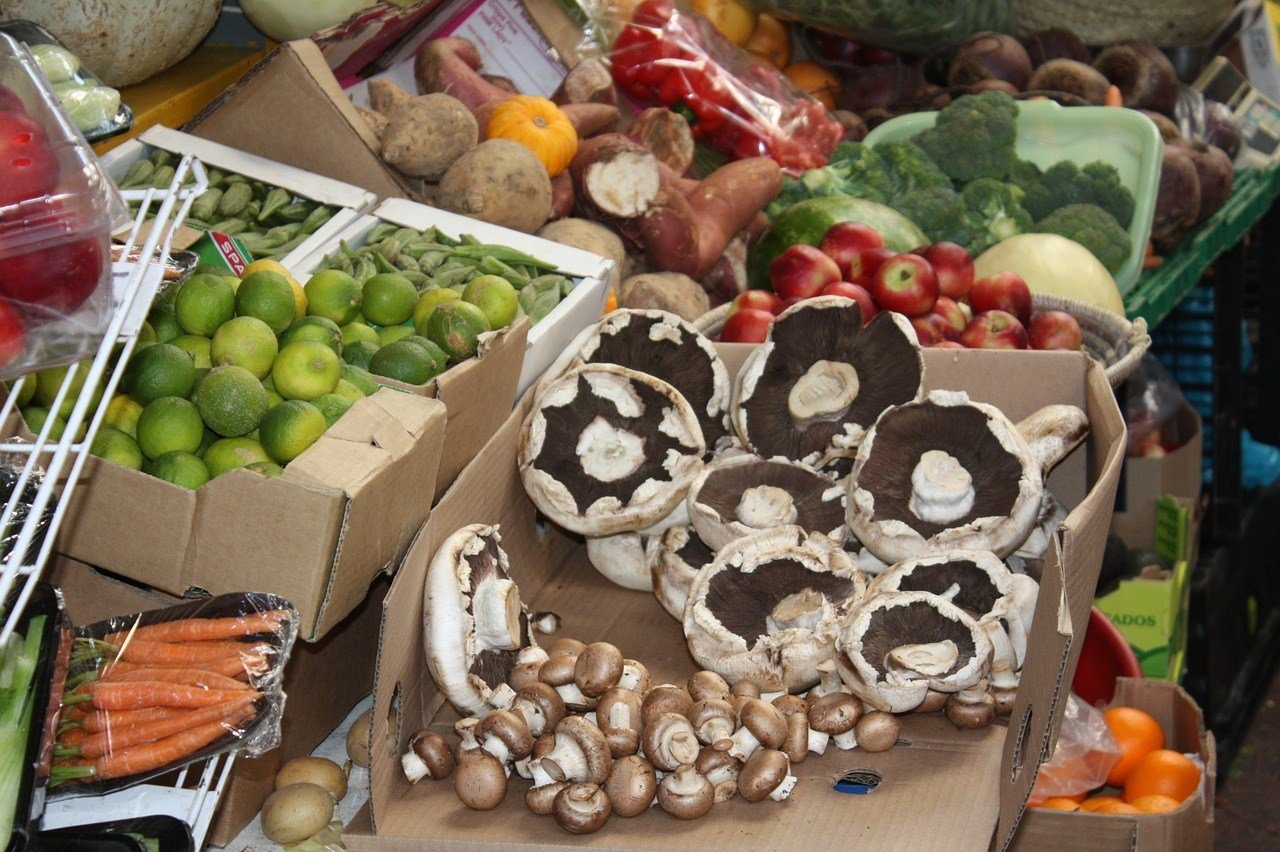
South Africa’s food reflects its diverse population and history, with Malaysian, Indian, French, Dutch, and British influences at work, along with its indigenous population making a mark too. All of this adds up to a whole lot of different stuff on offer for your stomach.
There are loads of tasty titbits to try out. From Cape Malay curry, and the South African mainstays of chakalaka and pap, all the way to biltong and baboti, so here are some foodie tips to help you eat your way around this country like a pro – and safely, too!
- Make sure your food is cooked through and, whatever you do, avoid eating meat rare. A nationwide issue with hepatitis A can mean rare meat isn’t a good idea.
- Be careful eating seafood. This is often people’s downfall when travelling anywhere in the world and, trust us, you do not want to get sick from seafood. Make sure it’s fresh; if it tastes, or smells, not right, then just leave it.
- Though it isn’t always possible, try to only eat food that has been made in sanitary conditions. If you can’t verify that, then at least make sure it’s been cooked fresh and hot in front of you. If you can’t verify that, steer clear.
- When eating food from street stalls or local places, try to check out how they’re preparing the food to see if it’s being done in a sanitary way.
- Top tip: go to places that are busy with locals. This is a good way to ensure that it’s a safe place to eat: if locals are going there regularly, the chances are high that it won’t be something that will make you ill.
- On road trips, train journeys, or other long trips, make sure to stock up on snacks just in case the things along the way aren’t foodstuffs you enjoy, or that look unsanitary.
- Practise good hygiene. Things like washing your hands, especially when you’re been exploring a dusty city all day, will definitely go a long way to making sure you aren’t the one making your stomach feel bad.
- In more rural areas, be especially careful about fresh fruit and vegetables. Ensure they have been washed in clean water before you eat them and only buy things you can peel and cook yourself; pre-peeled is not a good idea.
There is so much tasty food to try out in South Africa. From the Indian curries, to the South African oddity that is bunny chow. Also not forgetting the traditionally al fresco braai – a type of barbecue – with its boerewors (“farmers’ sausage”), foodies will have a field day here.
A word of advice: don’t dive into everything straight away. Chances are you won’t be used to the food here, so go slow at first. To be on the safe side, take some anti-diarrhoea medication and, whatever you do, avoid ice cubes in drinks. Food in South Africa is safe for the most part though!
Water is a contentious issue in South Africa, especially in Cape Town, because of severe droughts.
However, water is safe to drink in South Africa – however, that only really goes for urban areas. Drinking water from taps should be done with caution, if at all, in rural areas – especially where there has been, or is currently, drought.
A lot of people choose to drink bottled water; this is probably best to do if you are travelling with small children.
Boiling tap water vigorously for 1 minute (at least), and then letting it cool, should make it safe. If your accommodation has a water purifier, then use that. Make sure you make an effort to reduce plastic usage in the world, and bring your own refillable bottle!
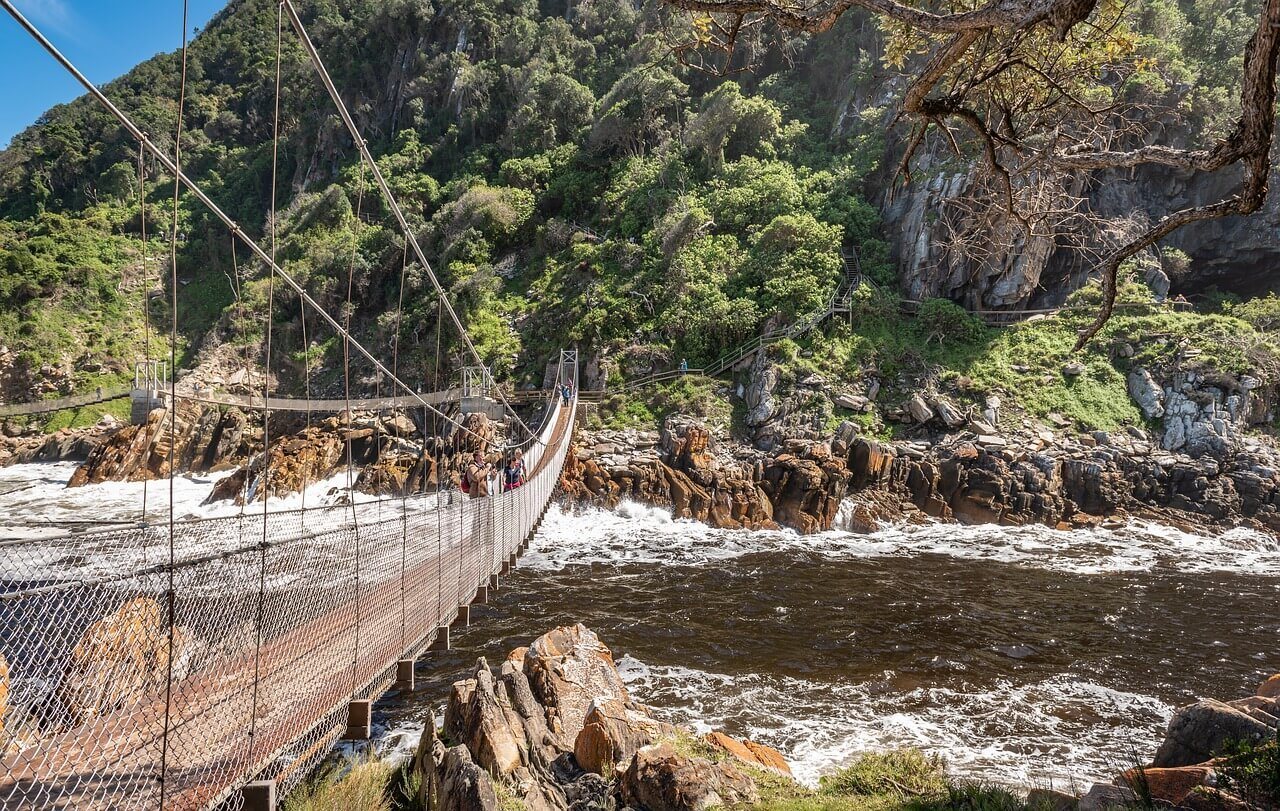
This is a very broad question.
Many parts of South Africa are not safe, at all, to live in. There are huge disparities between “rich” and “poor” neighbourhoods; very high crime levels and a risk of theft mean there are places you just shouldn’t wander.
However, South Africa is – and can be – safe to live in. Chances are you won’t be choosing to live in a township (lucky you). Many from the South African middle classes, both black and white, choose to live in gated communities. These usually come with private security, armed guards, high walls, electric fences. This sort of thing is bound to make anyone feel safe.
It matters in what city exactly you live, too: Johannesburg is different to Cape Town.
Living day to day, however, will have to mean changing your mindset slightly. It’s a matter of being more careful with how you get around, how you dress, what you carry, where you go. Living somewhere, just because of the time involved, will mean that you are more likely to come into contact with crime than simply visiting as a tourist.
Expat website, InterNations, ranked South Africa as second as the “most dangerous place to live” (2019) in a survey, ranking countries based on crime, quality of life and political instability. To put that into perspective, however, the UK ranked 12th – between Mexico and Egypt – so take that with a pinch of salt.
Many people, however, live in South Africa : expats and local people. Clearly it’s a safe place to live – but it depends where you do it.
You may miss the freedom that you get in other countries, the freedom to simply walk where you want to walk, drive at any time, and not have to worry about your security at all times. You may feel like you’re living in a bubble and you’ll have to get used to that.
Your housing situation should be your number one priority after choosing exactly where in the country you want to live. The most important thing is doing your research: a lot has been written by locals and expats alike living in South Africa, so see what they’ve got to say on the matter, and ask the necessary questions.
At the same time, you have access to South Africa’s amazing nature and wildlife at any time you feel like seeing it. There are definitely plus sides to living here; it’s all a matter of adjusting to a different type of lifestyle.

A new country, a new contract, a new piece of plastic – booooring. Instead, buy an eSIM!
An eSIM works just like an app: you buy it, you download it, and BOOM! You’re connected the minute you land. It’s that easy.
Is your phone eSIM ready? Read about how e-Sims work or click below to see one of the top eSIM providers on the market and ditch the plastic .
Healthcare in South Africa is pretty good – but only in major cities, and mainly only private.
There are many private hospitals and clinics in many of the country’s urban areas. If you find yourself in need of urgent treatment, you should definitely head to a private hospital.
The healthcare at private facilities is of an excellent standard, whereas at public hospitals the situation can be marked by underfunding and overcrowding.
If you need to see a healthcare professional, it is advised that you do extensive research before you see someone. Make sure you choose a good facility.
Be very careful about things like blood transfusions; in South Africa, HIV is real risk. If you’re worried, BloodCare.org.uk is a site where you can find out about safely screened blood.
Be aware that some places may want you to pay upfront either before a consultation or even before admission to a hospital, so make sure you have medical travel insurance – and some funds.
In areas that are more rural… You are not likely to come across reliable medical facilities. Some locals may suggest traditional medicines to you, or for you to go and see a healer called a sangoma (female) or inyanga (male). We can’t vouch for either of these; the best way is to go for Western medicine, so get yourself to a big town or city at your earliest convenience.
You will also be able to find pharmacies in big towns and cities, where you can pick up a variety of medication (just make sure it’s in date); be careful of medicine sold in local markets, however.
Check out your embassy’s website for doctors and clinics, ask at your accommodation, or get in touch with your travel insurance provider for a list of recommended hospitals and healthcare facilities.
South Africa is a diverse nation with 11 official languages: Afrikaans, English, Ndebele, Northern Sotho, Sotho, Swazi, Tsonga, Tswana, Venda, Xhosa and Zulu.
Most locals are multilingual as the school curriculum requires students to learn at least three languages. During the Apartheid regime, schools mostly taught in Afrikaans hence its one of the most spoken languages, followed by English and Zulu.
Welcome – Welkom
Hello – Hallo
Sorry – Jammer
Please – Asseblief
I don’t know – Ek weet nie
How are you? – Hoe gaan dit met jou?
No plastic bag – Geen plastiek sak
No straw please – Geen strooi asseblief
No plastic cutlery please – Geen plastiek eetgerei asseblief
Where are you from? – Waarvandaan kom jy?
Excuse me – Verskoon my!
How much is this? – Hoeveel kos dit?
How much is a beer? – Hoeveel is ‘n bier?
Here are some quick answers to common questions about safety in South Africa.
Is South Africa dangerous to visit?
Your safety in South Africa depends on where you’re staying and what you’re doing. As long as you use your common sense, do some research and stay away from the no-go areas, you should have a trouble-free trip.
Which is the safest city in South Africa?
Cape Town is statistically the safest city in South Africa. While there are no-go areas and safety issues, you shouldn’t have to worry too much about getting into trouble. Use your street smarts and stay alert!
What should you avoid in South Africa?
Avoid these things in South Africa: – Avoid wandering around city centres at night – Don’t look flashy – Don’t leave valuables lying around on tables – Avoid being careless when walking around and using public transport
Is South Africa dangerous to live?
While it’s not as safe as Europe, South Africa can be safe to live in – but you’ll need a lot more precautions. Having security cameras and guards is standard in expat communities and highly recommended. Your safety will also depend on where you’re living.
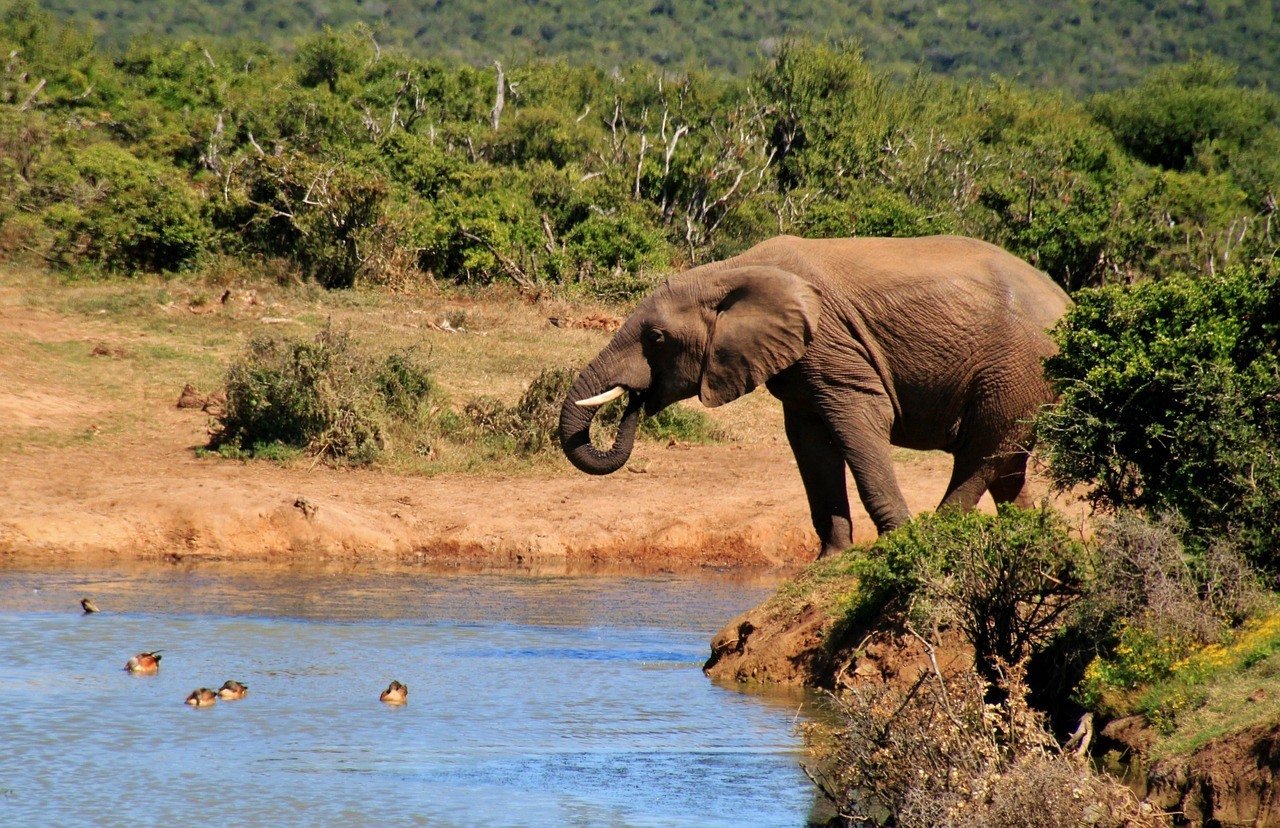
South Africa: people say it and automatically think of crime. That’s unfair, but not an unexpected reaction. Crime in South Africa gets talked about a lot, both outside and inside the country. It’s more than just a “big deal” but a deep-rooted problem with resulting issues for a society that serve to deepen a divide between rich and poor, a disparity that stems back, you could say, to the country’s Apartheid-era divisions.
The country, though affected by its past, is not its past. However, things are definitely looking up. Once known as the murder capital of the world , that “accolade” has since been passed around the globe, leaving South Africa as a country where tourists are welcome, and much safer than they would have been 25 years ago. Things change, and this nation, like many others, is gradually finding its feet.
As a tourist? Chances are you’ll be totally fine in South Africa. It takes some careful planning and research about where you stay, what you do – and some not-so-careful common sense stuff like not walking around certain areas after dark – but you’re fortunate enough to not live day-to-day in a dangerous township, lucky enough to afford to even take a trip to South Africa. Bear this in mind and act sensibly: you’ll be fine.

Lerato Bambo
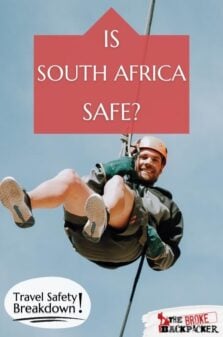
Share or save this post

All the info on this site is mostly accurate. I would be careful of taking a local minibus taxi which is different to a taxi cab, if your accommodation is outside of the city. Taking an taxi cab or uber is the best alternative. And then always do thorough research on the area you will be staying in, as I live in Cape Town and I love my city and my country, but we have our issues, which country doesn’t. We have a lot of great areas and also a lot of really bad areas, so you have to be really vigilant. If uncertain, a tour guide or trusted local would be best to show you around initially. Oh and by-the-way…our food and wine, is really world class. Come taste and see. I hope this helps.
Thanks that was really helpful for planning
By far the most informative and comprehensive info I’ve read on the ins and outs for travel safety in South Africa !
Leave a Reply Cancel reply
Your email address will not be published. Required fields are marked *
Save my name, email, and website in this browser for the next time I comment.
Notify me of followup comments via e-mail.

Solar eclipse 2024: A traveller’s guide to the best places to be when the light goes out
O n 8 April 2024, a total solar eclipse will sweep across North America , providing an astronomical experience in many alluring locations.
Only a tiny proportion of humanity has ever witnessed a total eclipse – but tens of millions of people will be able to experience one as the “path of totality” sweeps from the Pacific to the Atlantic during the course of that magical Monday.
Here’s what you need to know about why you should see it and where to be.
What happens during a total solar eclipse?
The greatest show on earth comes courtesy of the lifeless moon. Normally the orbiting lunar lump merely provides earth with tides, moonlight and somewhere to aim space rockets. But roughly once a year the natural satellite aligns with the sun and, thanks to a geometric miracle, blots out the hub of the solar system to create a total eclipse.
“Even though the moon is 400 times smaller than the sun, it’s also about 400 times closer to earth than the sun is,” says Nasa. “This means that from earth, the moon and the sun appear to be roughly the same size in the sky.”
A narrow band marking the “path of totality” carves an arc of darkness across the surface of our planet. If you are somewhere on that line at the predicted time, and you have clear skies, then the experience will become a lifelong memory.
The closer you are to the centre of the path of totality, the longer the total eclipse will last. The astronomer Dr John Mason, who has guided dozens of eclipse trips (and will be doing so again in 2024), says: “People down in southwest Texas will get about four minutes 20 seconds, and that reduces to about three minutes 20 seconds up in the northeast. That’s a pretty good, long total eclipse.”
What’s so good about seeing an eclipse?
In the days leading up to the eclipse, locations in the path of totality acquire something of a carnival atmosphere as astronomical tourists converge in excited anticipation.
On the day, the cosmological performance begins with a warm-up lasting more than an hour, during which the moon steadily nibbles away at the surface of the sun.
Suddenly, you experience totality. The stars and planets appear in the middle of the day. The air chills.
To testify to the heavenly fit between our two most familiar heavenly bodies, faint diamonds known as Baily’s beads peek out from behind the moon. They actually comprise light from the sun slipping through lunar valleys.
A sight to behold – so long as you can see the moon blotting out the sun and appreciate the mathematical perfection of nature in our corner of the galaxy.
Eclipses are entirely predictable: we know the stripes that the next few dozen will paint upon the surface of the Earth. But the weather is not. Cloud cover, which blighted the Cornwall eclipse in 1999, downgrades a cosmological marvel to an eerie daytime gloom.
Almost as predictable as the eclipse is that traffic towards the path of totality will be heavy on the morning of 8 April 2024.
Accommodation rates are astronomical: even humdrum motel rooms in Niagara, central in the path of totality, are selling for C$600 (£350) for the night of 7-8 April 2024.
Where will the great American eclipse 2024 be visible?
The path of totality makes landfall from the Pacific at Mazatlan on Mexico’s Pacific Coast and sweeps northeastwards to reach the US-Mexican border at Piedras Negras.
In the US, three big Texan cities – San Antonio, Austin and Dallas – are on the extremes of the path of totality; many citizens are likely to drive to locations near the centre of the line.
Arkansas will be an attractive place to see the eclipse , with both Texarkana (on the border with Texas) and Little Rock within the path of totality.
In the Midwest, Indianapolis and Cleveland share the distinction of being fairly central in the path of totality. In upstate New York, Buffalo and nearby Niagara Falls (shared with Canada) could be extremely attractive – though prone in early April to cloudy skies.
In Canada , Montreal is just touched by the path of totality. The line then reverts to the US, passing across northern Maine – which promises to be a superb with clear skies. Then back to Canada’s Maritime Provinces, with New Brunswick, Prince Edward Island and Newfoundland all in the line of darkness.
Will I be able to see a partial eclipse from the UK?
Yes. The eclipse ends with the sunset in the eastern Atlantic, about 600 miles off the coast of Cornwall , before it reaches the UK and Ireland . But on the island of Ireland and western parts of Great Britain, a partial eclipse may be visible with the sun low in the sky.
If skies are clear and you have an open view to the west, it will start at around 7.55pm in Cardiff, Liverpool , Manchester, Edinburgh and Glasgow.
BBC Weather presenter Simon King said: “With the partial solar eclipse occurring late in the day UK time, the Sun will be low to the horizon and will actually set before the spectacle is over.”
Can I combine an exciting city with a partial eclipse?
Boston, New York and Chicago are among the big cities that will see a sizeable chunk of the sun blotted out. Viewer as far apart as Alaska and the far north of Colombia and the Caribbean will, if skies are clear and they use the correct eye protection, see a partial eclipse. But there is nothing to compare with a total eclipse.
Eclipse guru Dr Mason sums up the difference between a 99 per cent partial eclipse and a total eclipse as far apart as “a peck on the cheek and a night of passion”.
“There will be people who will look at the map and say, ‘I live in Cincinnati or I live in Columbus [Ohio] and I’m just outside the zone of totality. But I’m going to get a 99 per cent-plus eclipse, so maybe I won’t bother to travel’.
“What they don’t realise is there an enormous difference between 99 per cent and 100 per cent. And there’s a range of phenomena that they won’t see if they put up with 99 per cent.”
You must use special eclipse safety glasses or viewers when viewing a partial eclipse or during the partial phases of a total solar eclipse.
Where should I be for the total experience?
There are no guarantees of clear skies: all you can do is play the odds based on the record of cloud cover for the corresponding date in previous years.
Dr Mason says the average expected cloud cover amounts increase from around 40-45 per cent on the Mexico/Texas border to over 80 per cent in Maine, New Brunswick and Newfoundland.
Three particularly tempting locations:
- Southern Texas , close to San Antonio or Austin. Besides clear skies being more likely than not, access is easy with direct flights to Austin. Importantly there is much to explore in the region before and after the eclipse, from Big Bend National Park on the Rio Grande to Space Center Houston – an excellent place to continue the cosmological theme.
- Northern Arkansas , a picturesque part of the state, with the added attraction of Memphis just a couple of hours away.
- Niagara Falls : the dramatic border between the US and Canada could be an eclipse washout due to clouds. But the natural surroundings are impeccable – and there is plenty of accommodation, which will avoid the risk of being caught in severe traffic congestion on the freeways from Toronto and locations in New York State.
However, the most recent forecasts for cloud cover suggest that the Midwest around Indianapolis and the northeastern state of Maine could have the best prospects.
When are the next total solar eclipses?
Summer 2026 – Wednesday 12 August, to be precise – should bring a spectacular eclipse visible in northern Spain at the height of the European holiday season. The path of totality begins in the Arctic and crosses Greenland and Iceland before arriving in the northern half of Spain. The stripe of darkness will traverse the great cities of Bilbao, Zaragoza and Valencia in mainland Spain before arriving in Palma de Mallorca.
The following summer (2 August 2027), the southern tip of mainland Spain is in the path of totality for an eclipse that will sweep across North Africa and the Arabian peninsula : going east from the Strait of Gibraltar, it will encompass Morocco, Algeria, Tunisia, Libya, Egypt, the northeasternmost corner of Sudan, Saudi Arabia and Yemen.
Just under 12 months later, on 22 July 2028, Outback Australia will be the place to be. A total eclipse will make landfall in northern Western Australia, sweep across the Northern Territory and part of southwest Queensland – then clean across New South Wales, with Sydney in the middle of the path of totality.
Winter cloud cover could disrupt the experience in Australia’s largest city – and is very likely in the southern portion of New Zealand’s South Island where the eclipse reaches a finale.
Australia also features in the cosmological plans on 25 November 2030. This is early summer in the southern hemisphere, and likely to be good conditions for viewing in Namibia, Botswana and South Africa (Durban is on the path of totality) as well as South Australia.
The Independent is the world’s most free-thinking news brand, providing global news, commentary and analysis for the independently-minded. We have grown a huge, global readership of independently minded individuals, who value our trusted voice and commitment to positive change. Our mission, making change happen, has never been as important as it is today.


IMAGES
COMMENTS
7. Be prepared to tip. South Africa has a strong tipping culture. In many customer-facing industries, salaries are low and workers make much of their money from tips. Restaurant staff will expect a top of around 10%, but leaving 12-15% will generate bigger smiles.
Then South Africa's only worth visiting if you're willing to get a 5G plan to tether from. The internet's a bit of a nuisance. While it has improved since we first visited South Africa in late 2018, download speeds of 10MB/s are still considered fast. Unlimited WiFi is still a selling feature at Airbnbs.
7. Go whale watching by land or sea. Some 37 species of whales and dolphins frequent South Africa's shores, so it's no wonder whale-watching is a popular activity. You can hop on a boat from plenty of places along the country's three coastlines to view these behemoths in their watery haunts.
5. Drakensburg. Best region for hiking. South Africa's largest mountain range is a paradise for hikers and outdoor enthusiasts. In addition to its rugged peaks, lush valleys and dramatic cliffs, the Drakensberg is also dotted with rock and cave art that dates back several thousand years.
7. Don't skip the lesser-known art, design, and culture. South Africa is diverse in landscapes and temperatures as well as extremely culturally rich, and has 11 official languages. There are some iconic sites and museums you absolutely shouldn't miss such as Robben Island, the Apartheid Museum, and the Zeitz MoCAA.
Beautiful South Africa is one of only two countries in Africa where we recommend a self-drive holiday - one of the best reasons to visit South Africa if you're an independent traveller. In additon, Wi-Fi is widely accessible, the mobile phone network is excellent, ATMs are readily available and self-drivers will never be far from a full ...
4. Kruger National Park. Without any doubt, Kruger National Park is one of the best-known places to visit in South Africa. If you want the best wildlife safari experience in South Africa, then Kruger NP is definitely the place to be. Kruger is the oldest and also the biggest National Park in South Africa.
The world's third-highest bungee jump point, at Bloukrans Bridge, is here in South Africa (it's 216 meters/708 feet). If you're going to go cage diving with sharks, make sure you avoid companies that chum the waters to entice the sharks as that isn't an ethical or sustainable practice. 2. Explore KwaZulu-Natal.
South Africa is approximately twice the size of France, so don't expect to see it all in a week. Plan your trip by deciding which cities, towns and areas you'd like to visit. Most tourists opt for the bigger cities, like Cape Town, Johannesburg and Durban, but there's much more to see than just the main attractions.
South Africa is a vast country, filled with world-famous game reserves, UNESCO World Heritage Sites, stunning beaches and multicultural cities.To explore it fully would take a lifetime. However, those of us that don't have endless vacation time or unlimited resources may have to be content with a much shorter visit.If you only have a few days, don't despair—you can still see several of South ...
South Africa is a diverse and vibrant country with a rich tapestry of landscapes, cultures, and experiences. There are several reasons why you should visit South Africa. With all it has to offer, it really is the perfect place to visit for almost every type of traveler. From solo travelers to families, it has something to offer everyone.
The best time to visit South Africa's beaches is during the summer months of December, January, and February. Language. South Africa is a cultural melting pot, and its 11 official languages reflect this diversity. English is widely spoken in cities and towns, but you will find that many locals also speak Afrikaans, Zulu, Xhosa, and Sotho.
South Africa. Africa. Check out this year's Best in Travel winners. Black-maned lions framed against desert dunes, powdery beaches lapped by two oceans, star-studded night skies, jagged mountains - South Africa is the place to go wild. Best Time to Visit.
Going on a safari and spotting the famous Big Five animals is high on top of many people's bucket lists. One of the reasons for visiting South Africa is going on a safari of a lifetime. Kruger National Park is the largest game park in the country. Kruger park is very easy to visit and will provide for one of the best safari in South Africa.
Other than that, the water in South Africa is safe to drink, so please consider drinking the free tap water instead of buying plastic bottles and contributing to plastic waste. If you are truly worried about your vacation in South Africa, we always travel with a Grayl GeoPress, which filters out 99.99% of bacteria.
Weather: South Africa has some of the best weather in the world - rarely too hot, rarely too cold, and the sun shines most of the time. Your clients will be able to get out and about as and when they feel like it. Adventure activities: It's hard to beat South Africa when it comes to the Great Outdoors and adventure activities.
5. Wine. South Africa is famous for its wines with the majority of the vineyards being located just outside of Cape Town. There are many vineyards and wineries that you can visit for lunch, enjoy tasting menus, take tours and of course purchase some fabulous wines. 6.
No matter when you decide to travel, there's always something amazing going on—from whale migrations and prime game-viewing in winter; to blissful sunshine and Christmas festivities in summer. For generally good weather for whatever you want to do, the best time to visit South Africa is May through October, during the southern hemisphere's ...
4. Consider Your Budget. 5. Check Out the Visa Policy. 6. Getting to and Around. 1. Consider When to Travel to South Africa. South Africa offers diverse climates and landscapes, making it a year-round destination with something to offer in every season.
November to March is peak festival season, with peak prices. November to March is summertime in South Africa, with daytime highs reaching 32°C (90°F), often with quite a lot of humidity. If you're looking to visit during the peak season, planning ahead is essential. Accommodations in coastal areas and national parks are often booked out ...
However, South Africa is - and can be - safe to live in. Chances are you won't be choosing to live in a township (lucky you). Many from the South African middle classes, both black and white, choose to live in gated communities. These usually come with private security, armed guards, high walls, electric fences.
The FlySafair flight sale is part of the low-cost carrier's 10-year birthday celebration and will see 50,000 seats on selected domestic flights selling for R10. Last year, the same promo went ...
But I'm going to get a 99 per cent-plus eclipse, so maybe I won't bother to travel'. ... Botswana and South Africa (Durban is on the path of totality) as well as South Australia.